#bungou stray dogs analysis
Text
So I've been looking into some card meanings for BSD stuff, and I've noticed the four king cards perfectly fit the four leaders of the major gifted organisations:
Mori for the King of Spades, Dazai literally calls him the embodiment of logic in the manga, and despite what most people think, he is normally very fair to his subordinates.
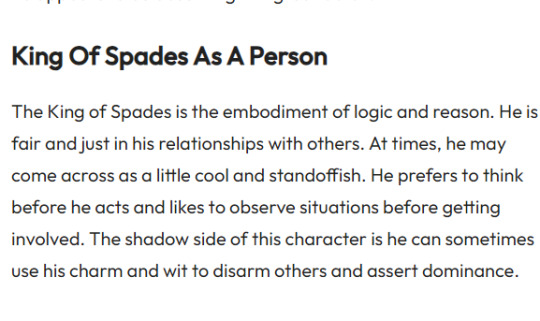
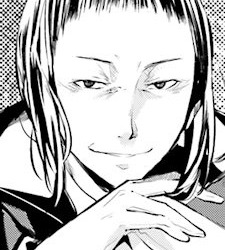
This one is almost too on the nose, it literally describes Fitzgerald exactly
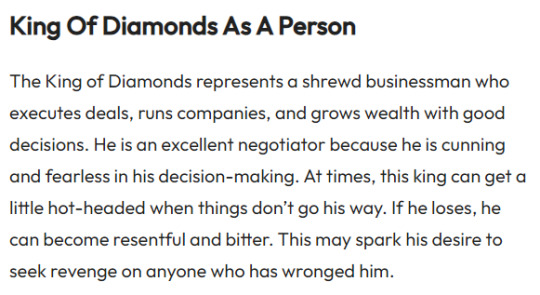
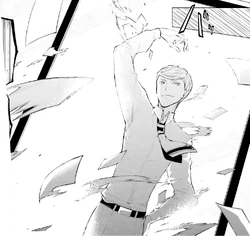
The king of clubs for Fukuchi, while it mostly fits for his persona as a hero it does fit if you remember that he is trying to fight for what he believes is justice
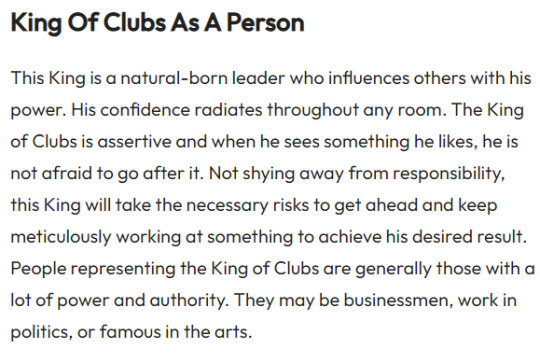
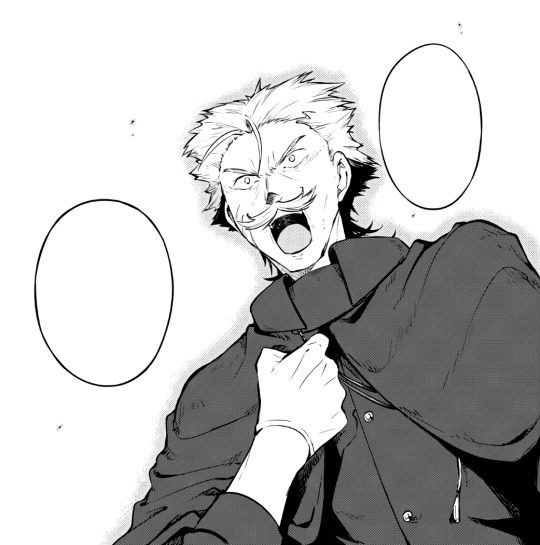
And finally the king of hearts for Fukuzawa, He stands apart from all the others as his only concern is the happiness and comfort of his children subordinates
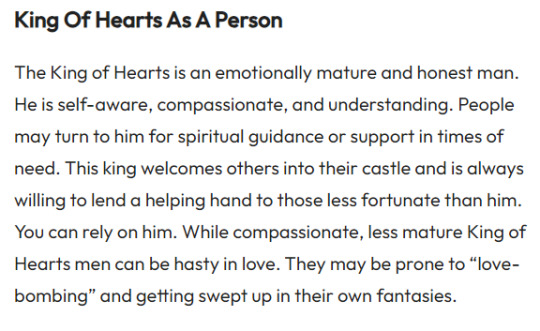
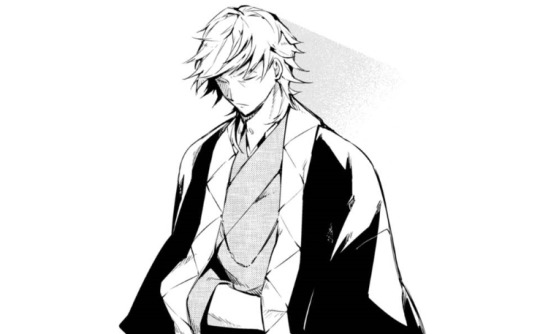
I just love seeing how well these all fit, its very possible this is just a coincidence, but given Asagiri's track record i think it might be at least slightly intentional.
#bsd#bungou stray dogs#bungo stray dogs#dazai#bsd analysis#bungou stray dogs analysis#character analysis#bungou stray dogs fukuzawa#fukuchi ouchi#bsd fukuzawa#bsd fukuchi#the armed detective agency#the decay of angels#bsd mori#mori ougai#the port mafia#bsd fitzgerald#bsd francis#the guild bsd#bsd card symbolism
1K notes
·
View notes
Text
Complete Dead Apple Explanation
Or: “The Ultimate Guide to Dead Apple”.
Warning: this is a long post! I’m not kidding, I worked on this for three months. There is a TL;DR at the end but it will only briefly cover the most important points.
I see posts about Dead Apple not being understood far too often and so I’m introducing: this explanation! I do want to preface this by saying that I can completely understand that this movie can be confusing. Or, as Fyodor said it:
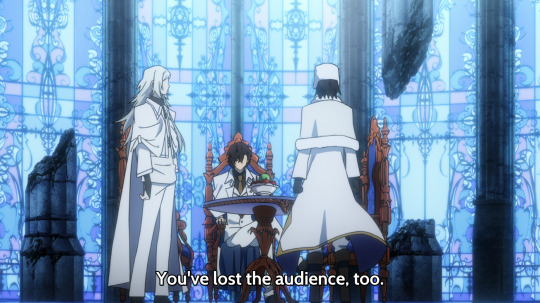
But, as someone who has seen it many times, I’m here to shed some light on it! Hopefully after this post it’ll all make a bit more sense, and you’ll at least have different questions.
If you haven’t watched the movie yet and are wondering when to watch it, the story officially takes place between season two and three, though you’ll be able to watch season three with no issues if you haven’t watched the movie. Please do note that this post will contain light spoilers for the plot after season two, so don’t read it if you haven’t at least finished catching up to the anime.
I’ll try not to summarize the movie, but instead explain it. That means that this post does not replace the movie, but instead tries to elaborate upon it and tries to place it in the larger plot. Most of the early movie is therefore ignored, but please do not hesitate to ask if you have extra questions, comments, different interpretations or you want me to go into more detail about something. I may not know everything, but I’m always down to talk about this movie!
Alright, with all of that out of the way…
The Dragon Head Conflict
We’ll start at the beginning, which is to say, we’ll start at the prologue, which can be found as a permanent event in Mayoi (and also as a part of the Dead Apple manga). This is not technically needed to understand most of the movie, but it does give some context that will make it a little easier, since this is where it all starts.
The Dragon Head Conflict, sometimes also translated as the Ryuuzu Conflict, is (as the movie states) the largest conflict in the history of Yokohama’s underworld. It took place six years ago, and originally was about five hundred billion yen an ability user left behind after they died, which various organizations were very interested in. It lasted for a total of 88 days, and involved conflict between eight different underworld organizations, including among others the Port Mafia, Gelhart Security Service/GSS (from Fifteen) and Takasekai (also from Fifteen).
Now as you can imagine, the government isn’t super stoked that gangs are shooting each other up all night and leaving corpses everywhere, to the point where the sidewalk is torn up from the bullet holes. To try to combat this, they thought that they could best fight fire with fire, and let a strong ability user from outside Yokohama settle this conflict all at once.
This new ability user, known as the “White Qilin”, unfortunately doesn’t really care about ending the conflict and kills other strong ability users left and right just for the fun of it, contrary to what the government had hoped he would do. Whether they are uninvolved parties or Port Mafia executives, it doesn’t matter to this guy. The White Qilin also ends up taking the money the conflict was originally about, but that doesn’t stop his murder spree. In this way, the White Qilin gains control over the entire conflict pretty fast, making him the main target to eliminate in order to put a stop to the killings.
Dazai approaches this problem similarly as to how he did during the conflict of Stormbringer, with a group of ability users to overpower the lone individual, but gets his plan twisted on him and gets kidnapped instead. Naturally, he predicted this outcome, leaving a hint for Chuuya where he left a transmitter for a tracking device so that Chuuya could come rescue him.
This is then the first scene of the movie, where Dazai and Chuuya confront and defeat the White Qilin using Corruption, and the whole Dragon Head Conflict ends since the White Qilin is finally gone and all the money burned. This battle is so iconic in the underground circles that it gains them the name “Double Black”, or “Soukoku”.
A few small notes on the Dragon Head Conflict before we move on.
As can also be seen in the first scene of the movie, this is where Oda adopts all five of those kids you see during the Dark Age, which was also already stated in the Dark Age itself.
“I heard all about it, Odasaku. You’re raising five kids, huh? And not only that, they’re orphans from the Dragon’s Head Conflict.” ―Dazai, Dark Age
Also, ever wondered why the Port Mafia is the only major criminal organization in Yokohama? There actually used to be five in total but four of them completely perished during the Dragon Head Conflict. Another reason why Dazai & Chuuya ending the conflict is so impressive, since because of that the Port Mafia is the only one to even survive it at all.
Shibusawho?
As you’ve probably guessed by now, the “White Qilin”, also named “the Collector” in Dead Apple itself, are both different names for our main antagonist: Shibusawa Tatsuhiko. The government had good reason to believe Shibusawa would be able to stand against the entire Yokohama underground and come out on top: his ability.
Shibusawa’s ability, Draconia, creates a fog around him, which separates other ability users from their own ability and makes non-ability users disappear as long as the fog persists. When surrounded by this fog, ability users are confronted with this version of their ability that is split from themselves. If an ability user is to die within this fog, their ability will be added to Draconia’s collection room.
There is decent evidence that it takes a while before the fog activates, so the effect isn’t immediate. This can be seen with Chuuya, who makes very short contact with the fog before he lifts up the building that he shoves in the Dragon’s mouth, but it’s seen even more clearly with Atsushi and Kyouka at the start of the movie. They spend a small while running around Yokohama wondering why everyone is gone before they’re finally confronted with their abilities.
To some extent the separated abilities represent the inner conflict in an ability user. This can of course be clearly found in Atsushi and his shaky connection to the tiger, or in Kyouka who has Demon Snow which is the last remnant of her parents but also murdered them in front of her. But the clearest example of this in the movie is actually Kunikida, since there is a visible change between him and his ability.

The notebook of Kunikida’s ability does not read its usual “理想” (ideals), but instead now says “妥協” (compromise). For Kunikida, a person so tied to his ideals, this version of his ability is an “abomination” (his words, not mine), and thus a source of inner conflict, since it represents a side of Kunikida that he carries within him.
“A copy of himself that didn’t follow ideals but made compromises was an abomination to Kunikida.”―Dead Apple (light novel)
If ability users manage to defeat their abilities in a physical fight, and then also accept these parts of themselves for what they represent, they will regain their ability. For example, Atsushi does not immediately regain his ability after defeating the tiger because he does not completely accept that the tiger represents that he has killed a person. For Atsushi, a person who connects his entire reason of living to saving other people, this is nearly irreconcilable. The only reason he probably is able to get over it in the end is that the person he killed was actively torturing and trying to kill him, so Atsushi had to kill to survive.
Shibusawa, then, is dead. Chronologically, his murder is the earliest you see of him. Fyodor has told Shibusawa that Atsushi contains something that “guides the envy of all ability users”, so Shibusawa, who feels like he is missing something, seeks to take this by any means. This doesn’t work out too hot for him, and Atsushi kills him.
Now a fun thing happens. Since Shibusawa is the center of the fog at all times, so to speak, and he’s the keeper of the abilities that die in his fog, his ability is separated from himself and lives on, nearly indistinguishable from his original body. Only one downside to this: he completely loses his memories.
I can only assume the government steps in at this point to take this strong ability user in his vulnerable state, and then have him solve the Dragon Head Conflict not long after. He most likely also survived Chuuya’s Corruption by being an ability, and having ability crystals in his collection to fall back on and recover, as he also does in Dead Apple. However, all of that is just pure speculation.
After the Dragon Head Conflict, Shibusawa spends some years abroad, casually killing thousands of ability users for the same reason as during the Dragon Head Conflict: just playing around and trying to fill that hole of something that is missing inside of him. The Japanese government mostly does a spectacular and spectacularly unethical job of cleaning up after him, since they learned nothing from the Dragon Head Conflict and still think that they can control him to protect Japan should it ever be invaded by foreign ability users.
Eventually, when the timing is right, Shibusawa gets invited back to Japan by Dazai. At the same time he is told by Fyodor (can you see the manipulation happening on both sides?) that Dazai’s ability is the ultimate ability that will finally complete him, and so Shibusawa eagerly comes to Yokohama.
From here on out, as far as Shibusawa is concerned, it’s just a matter of covering the entire city in fog, killing Dazai and then taking his ability. Since Dazai cancels the fog itself with his ability, Shibusawa does need to kill him first, since the fog will work just fine on a corpse. Unfortunately, Shibusawa, however smart he is, is not in control of the plot in this movie. That control is left entirely to the combination of Dazai and Fyodor.
Intermezzo: Singularity Crash Course
Let’s do a lightning quick crash course on singularities before continuing, because you’re going to need that to understand what is happening in the next part. While Stormbringer was released after Dead Apple, I’m still going to be leaning heavily on and paraphrasing the information provided in that novel since it gives a really nice overview.
Abilities are bound to rules, just like everything else. No organisms other than humans, such as plants or monkeys, can possess an ability. Each human can only have a single ability, and when they die the ability disappears with them. Finally, there is a limit to the strength of any such ability.
But what if you wanted to go beyond that limit? What if you wanted to play with the natural laws of this world? What if you wanted to get really silly with it? Well, in that case, you can try your best at creating a singularity.
Singularities are defined as “the interaction of multiple abilities that develops into a higher-level phenomenon different from the original abilities”. This mostly exhibits itself in a massive release of energy, but rarely there are semi-stable versions of them. Singularities aren’t bound to conventional rules, and can be much more powerful for that exact reason.
As for creating singularities, there are two defined ways. The most reliable method is to have two contradicting abilities clash with each other. This leads to fun mental exercises, think “unstoppable force meets immovable object”, or, two ability users who can both see a few seconds into the future fighting to the death (sound familiar?). As a second method, an ability can also contradict itself, essentially causing the same result, but it’s a lot more finicky.
“Dead Apple”
The latter part of the movie revolves around exactly the creation of such a singularity, as all planned out by Fyodor, and accurately anticipated by Dazai. Let’s lay out all the layers of this.
Shibusawa is after Dazai’s ability. Meanwhile, Dazai is trying to stop the fog to save Yokohama. As for Fyodor, we’ll get to him in a second.
Dazai “teams up” with Fyodor and betrays Shibusawa to put a stop to the fog. The idea of this is that Fyodor combines two abilities from Shibusawa’s collection, which Dazai can’t do himself without canceling them: the ability to pull abilities in a surrounding area close, and the ability to merge abilities together. When these two are merged, together they create an ability that will absorb Shibusawa’s entire collection, and then Dazai only has to touch this ability to effectively get rid of Shibusawa’s power source.
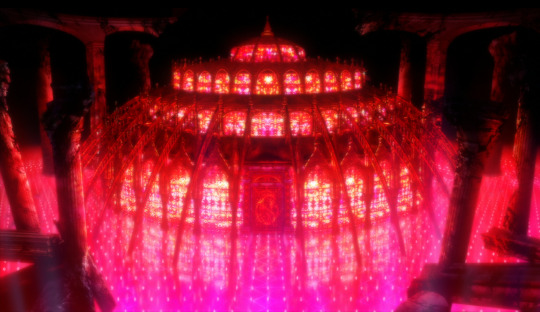
There is a specific reason why it has to happen like this, and Dazai just touching Shibusawa isn’t quite enough. Let’s mentally walk through the process if Dazai were to touch Shibusawa. The fog disappears for a bit (and Shibusawa with it, most likely), but Shibusawa now knows Dazai’s intentions. Fyodor will take Shibusawa’s side and now Dazai is at a large disadvantage. Ultimately, it doesn’t even solve the problem. We know from the Dragon Head Conflict that just destroying Shibusawa’s body is most likely not enough, and he will be able to resummon the fog (and his body) with time and energy. The problem needs to be cut off at the root, the ability crystals.
Unfortunately, Fyodor didn’t really team up with Dazai, instead choosing to team up with Shibusawa in order to get rid of Dazai. This is then where Shibusawa gets to kill Dazai, and discovers that wait, Dazai’s ability may not be what he’s seeking after all. However, the abilities are already merged, and Dazai’s ability joins them. This combines “the ability to merge” with “the ability to nullify”, which don’t exactly mix well. Does Dazai’s ability become part of the other ability? Does his ability nullify the merging ability before that can happen? It’s already part of it, but at the same time the merging can never happen. It’s contradictory, and thus a singularity is born.
Fyodor, meanwhile, hasn’t quite had his fill of betrayal yet, and decides to remind Shibusawa of what he is by killing him, reminding Shibusawa of his earlier death by Atsushi’s paw. All of this, killing Dazai and using his ability to create a singularity, having that power from the singularity then go into Shibusawa to create the Dragon, all of that was part of Fyodor’s plan. Shibusawa is only able to cover an entire city with fog because of the large amount of ability crystals he has collected, and so with enough power (like from a singularity) he can cover the entire world in this fog. Up until this point, neither Fyodor nor Shibusawa have seen a single ability user survive the fog, and thus it is the perfect method for getting rid of all ability users in the world, which does seem to be Fyodor’s end goal.
However, Chuuya swoops in and defeats the Dragon. Dazai was well prepared and had the antidote to the poison he was killed with hidden in his mouth, so he is alive and well again. That means that Dazai has his ability back and it cancels out the singularity space they both are in. It doesn’t completely get rid of the Dragon however, as some energy still lingers around the tower.
Fyodor is still on the scene, and uses a part of the merging crystal that he saved which was used earlier to create the singularity to merge Shibusawa with the singularity, giving Shibusawa a very anime transformation into his final form.

At this point, as a result of Shibusawa’s transformation, the fog turns red. If this red fog then covers the entire planet as Fyodor is hoping, and you were to watch it from space, it would look just like a poisonous red apple. The name of the movie therefore refers to this plan of using Shibusawa to rid the world of ability users.
This idea of poisonous apples in this movie comes from two different sources. From Fyodor’s side, it is referring to the apple Eve ate in the Bible, the original sin. For Fyodor, there is poetic irony in this: the world will end with the same sin as it began with. The crime is the punishment. On Dazai’s side, it refers to Snow White, who bit the poison apple and died (temporarily). He already talks about this to Oda when he is sixteen, vaguely implying he knew all of this was coming as soon as he met Shibusawa during the Dragon Head Conflict. Since Fyodor was already around at that time and also had a hand in enabling Shibusawa originally, this may indeed be planned out this far in advance, but it’s always hard to tell with these guys.
Then the kids take over the fight for the rest of the movie, and Atsushi, Akutagawa and Kyouka work together to defeat Shibusawa’s final form in the form of a long, epic final fight. Shibusawa is finally defeated and it all ends happily ever after.
The End.
Byakko VS The Dragon
…Or is it? You thought we covered the entire basic layer of the movie, so we’re done now, right? Think again! This is only where things start to become really interesting. Please note that this section will take some ideas that were already pointed out by other people, and build on those.
When looking at lore relevance of characters, Atsushi may not immediately spring to mind as one of the most important ones. Sure, he’s the protagonist of the main manga, but in comparison to the mystery surrounding Dazai or Fyodor he fades a little into the background.
Even in this post, an explanation about a movie that’s basically about Atsushi, I’m able to explain the basics of the movie without mentioning him much at all. And yet, the movie’s core conflict is not between Shibusawa, Dazai and Fyodor, but between Shibusawa and Atsushi.
While there isn’t a lot of information given about Shibusawa’s and Atsushi’s connection, what we do get is very interesting. Shibusawa is consistently referred to as a Dragon during Dead Apple, and while subtitles usually translate everything as “tiger”, Atsushi’s tiger is actually referred to as “Byakko” half of the time.
Now what is the difference between any good ol’ normal tiger and the Byakko, I hear you ask. The Byakko is much more than an ordinary tiger, since it is part of the 四神 (shijin/ shishin), the Four Guardians of the Four Compass Directions, which the Dragon is also a part of. What you essentially need to know from this is that the Byakko belongs to the same group of creatures as the Dragon, and that this solidifies Shibusawa’s status as Atsushi’s foil in this movie.
It also allows us to make a direct comparison between Shibusawa and Atsushi. The thing is, I have been lying to you a little bit. So far, I’ve been calling the Dragon a singularity. The truth is, it may not be. I know, I know, if it’s not a singularity, then what was that whole Dragon thing about?
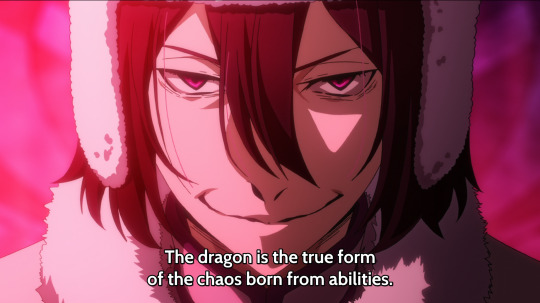
Fyodor actually specifically tells us that the Dragon isn’t a singularity, but instead it’s “the true form of the chaos born from abilities”. (Note here that the Dead Apple light novel talks about Fyodor as if he is “reciting some Oracle”. Did Fyodor get this information from someone else?) Is this related to why Fyodor wants abilities gone from this world? Is there another layer to abilities and other creatures that BSD hasn’t even touched upon (think Lovecraft)? It’s hard to say at this point. All we can say is that the Dragon gets referred to as something else, and… that the Dragon is similar to the Byakko.
The tiger ability we see that got separated from Atsushi in the movie actually doesn’t follow the rules the other abilities do. It has a clearly defined face, and the red gem is not on its forehead. The gem found on the ability tiger is also red, which is in line with the other extracted abilities we see, but what gets extracted from Atsushi by Shibusawa is this blue cube. The weirdness continues in the flashback we see of Atsushi being tortured by Shibusawa.
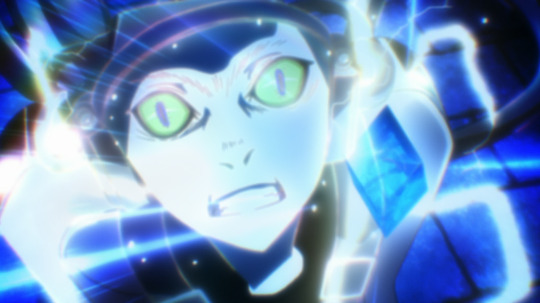
We see Atsushi’s ability leave him, but then in a flash of self protection instinct, he partially transforms into the tiger, claws and all, while the blue gem is outside of his body. Earlier in the movie it is shown that if an ability is extracted from an ability user, they no longer have access to the powers of that ability. Then how is Atsushi able to use his tiger abilities here?
Granted, there is a bit of conflicting information within the movie about this, since during the final fight with Shibusawa this blue cube is once again extracted from Atsushi, but now he does lose his tiger powers. Could he resummon the tiger while not in possession of the cube if the situation is dire enough? Is this just a psychological thing because Atsushi is aware of it this time? Who can say. At any rate, this blue cube is connected deeply with Atsushi, but the clues given imply that it may not be the Byakko itself.
“That’s not an ability! That is me!”―Atsushi, reaching out to the blue cube in Dead Apple
To be honest, the movie does very little in explaining anything around Atsushi, instead raising more questions than answers. For that exact reason, the rest of this section will mostly be speculation about one possible angle on Atsushi’s ability that personally makes sense to me, but of course this is only one potential theory.
I do also want to add here that Atsushi personally goes through an arc in this movie from seeing the tiger as something separate to something that is intrinsically part of him. This can also be a reason for this final exclamation of “that’s me!” when he reaches out to the blue cube, but it doesn’t explain everything, which is why we explore an alternate possibility here.
My take on it is that the Byakko and this blue gem that get extracted from Atsushi are not the same thing. With the side note here being that they are probably deeply connected, but not the same regardless.
My reasoning for this is that everything Atsushi-related you see in Dead Apple makes a little more sense when you consider the Byakko and the blue cube as two separate entities. The Byakko’s gem is red, the cube is blue. The Byakko is framed as something separate from Atsushi, while he claims the cube is not an ability but he himself. Atsushi had access to the Byakko while the blue cube was outside of him. Shibusawa even makes a point of mentioning that the orphanage director, who correctly thought Atsushi was the tiger, had the wrong idea about Atsushi’s ability. The Byakko is definitely Atsushi’s ability, but this blue cube is… something else.
And yet, the tiger is also deeply connected to whatever this blue gem is. Currently, one theory that makes sense to me is that the tiger is an ability that can be passed on, just like Demon Snow, that has the specific task of protecting the power of this blue gem. So, a two in one deal. Atsushi also gets referred to as “the one holding the Byakko ability” by Ivan, which would be in line with the Byakko being an ability that can be passed on as needed. Shibusawa makes a similar statement, calling Atsushi “the one clad in the Byakko”. Atsushi also has issues controlling his ability before joining the ADA, just like Kyouka and Tsujimura, who both also inherited their abilities. I would love to further speculate on this, but there is so little information on anything relating to this, so anything further would be completely baseless.
However, there is one more different clue given to us by the movie. Namely, what this comparison to the Dragon means for Atsushi as the one holding the Byakko.
Almost in the same breath as Shibusawa is recounting Fyodor’s words about the Dragon being the chaos of all abilities, the holder of the Byakko also gets its own description about its true form: the one opposing all abilities.
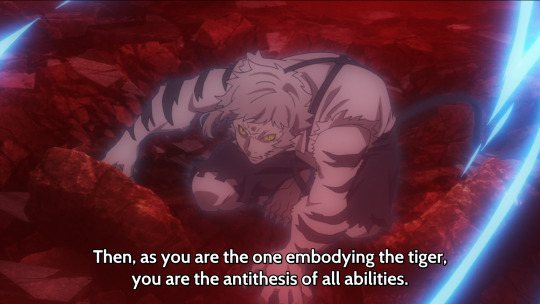
This relates to what the blue cube may really be. What Atsushi does to Shibusawa in his final moments is what I essentially believe to be this blue cube’s true power: it completely unravels an ability. The blue power eats up everything supernatural about Shibusawa until only his natural skull is left.
If you think this sounds familiar, it kind of does! I cannot ignore the similarity to Dazai here, though I do have to point out that Dazai can only cancel out an ability, and this blue cube power seems to… completely erase the ability itself, leaving no trace of it. The similarity to Dazai is further found the moment Dazai dies and his ability leaves his body. At first, his ability is white and vaguely similar to the blue cube before deciding that nope, this is just barely not it.
I have a hard time connecting this to anything larger simply because the series does not give a lot of clues on this subject. How did abilities come to be? How is the Book related to that, since it is not an ability or borne from an ability? And how does Atsushi factor into this?
Shibusawa has been led to Atsushi since he believed Atsushi would grant him something special, something he had been looking for all this time. “That which every ability user desires.”

This is actually a familiar story! This is not the first time Fyodor has led someone to Atsushi with the premise that he would be able to lead them to what they were seeking. The first two seasons of the anime follow that specific idea, of Fitzgerald wanting Atsushi so he can lead him to the Book.
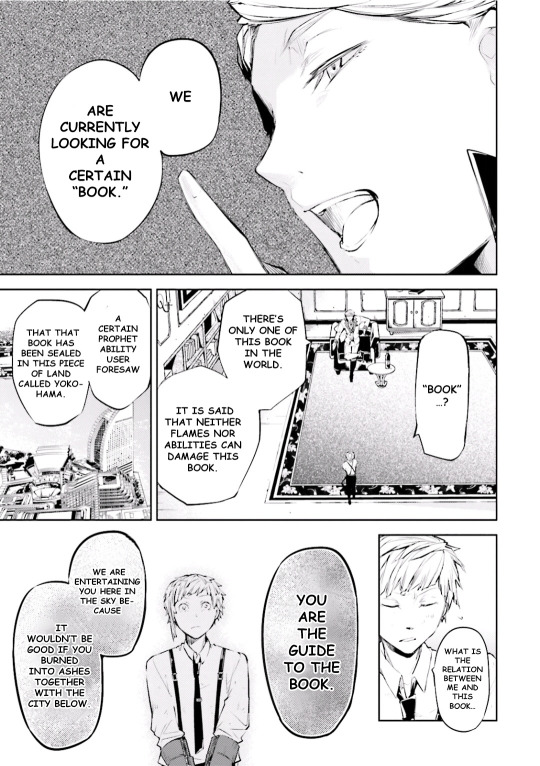
The tiger as the guide to the Book is something emphasized again and again. While in English it gets translated as “guide”, the original manga panel said “道標(タイガービートル)”, or, “guidepost (pronounced: tiger beetle, in English)”. While this is partially just a funny pun, it also once again points to the tiger specifically as a guide.
It did leave me to wonder about the absence of a certain scene in the series. Fyodor has been sending other people to Atsushi for the entire length of the series, but has never interacted with Atsushi himself. For someone who claims to be looking for the Book, and knows that Atsushi is somehow the guide to the Book, isn’t that a bit weird? Is there a reason Fyodor won’t interact with Atsushi himself? Fyodor knew about Atsushi way before he joined the ADA, so it’s not like Dazai is particularly standing in the way here.
Regardless, this factor that makes Atsushi so special may very well be this blue cube. How does the power to completely undo abilities lead to the Book? Who knows. We simply do not know enough about the Book or the origin of abilities to say more about this. Maybe the true power of the blue cube is something else entirely.
What does all of this mean? Where will it all lead? Only the future (Asagiri) can tell.
The Unexplained and Weird
Welcome to the section I’d fondly refer to as “a collection of things I have no explanation for”. There is plenty of that in this movie, but I do want to touch upon them since not being explainable as of currently does not necessarily mean that they aren’t important in the future. Also, not having an explanation for these things is driving me insane and I need to share in my suffering. Let’s go! :)
Let’s get the big thing out of the way first.
Mukurotoride, my friend, my enemy. For those unaware, Mukurotoride is the name of the large black tower that Shibusawa, Dazai and Fyodor were chilling in for most of the movie. The name gets translated as “Skull Fortress”, but the kanji used gives the name more of a “Dead Man’s Castle” feeling, since it refers to a person long since dead more than a skull. My problem with this tower is as follows: it doesn’t make any sense. Whatsoever.
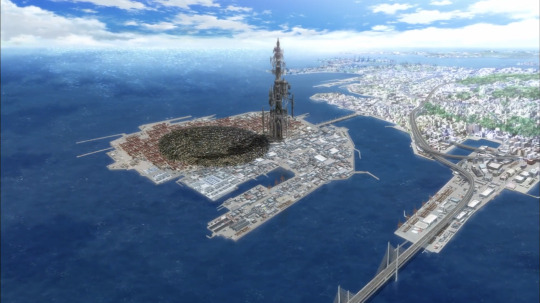
Why is it there? Fifteen establishes it’s there seven years before the current timeline, so a year before Shibusawa dies. I would’ve accepted it if the tower was a weird side effect of Shibusawa dying or something, but the current facts point towards this tower not having anything to do with Shibusawa at all. It’s also very decayed. How long has it been there? Who put it there? Is it relevant that it’s right next to Suribachi? Or in the Yokohama foreign settlement? (Side note: foreign settlements have not been a thing since 1899. What’s up with Yokohama having a foreign settlement?) No one seems to know anything about this tower, not even in the Japanese community. And then in-universe, everyone also seems okay with this wildly out-of-place tower that looks like it’s made out of human bones being there in the middle of the city? It’s giving me Sky Casino vibes.
Okay, now that I’ve gotten that out of my system, we can talk about Fyodor’s ability.
I want to start this part by explaining my personal stance on the current Fyodor theories, since it influences how I talk about what is shown of his ability in Dead Apple. There are a bunch of theories about Fyodor having an insta-kill ability that only works on non-ability users. Personally, I don’t subscribe to this theory, and I have multiple reasons for this.
First, I don’t think we’ve ever seen Fyodor’s ability being used. At the end of Cannibalism a cop dies as soon as he touches Fyodor. In the manga abilities don’t have a special shine effect, but in the anime they do. However, in the anime there was no ability-shine here.
A stronger argument, perhaps, is that this happens right in front of Dazai, and Dazai immediately afterwards says he has no clue what Fyodor’s ability could be. He could be lying, of course, but since this is a common enemy he shares with Fitzgerald, who is the one asking him about Fyodor’s ability, I don’t see any reason for him to do so here. The whole murder reads a little bit like Fyodor just putting on a show for Dazai.
Finally, from a narrative viewpoint, killing with a touch is a little… useless? Don’t get me wrong, I’m sure it’s convenient, I guess, when you’re a terrorist who seeks to exterminate part of the global population. But there are many ways to kill a person, and Fyodor has shown time after time that he doesn’t need to rely on an ability to murder people.
The strongest argument for the insta-kill ability in my opinion is Fyodor himself saying “this is my true ability” before killing that kid who was enslaved by Ace. However, this may also be part of something else that is going on with Fyodor, in a way that is perhaps very similar to Atsushi.
Alright. Whether you agree with that or not is up to you. To get back to the movie, there are a few interesting clues provided about Fyodor’s ability.
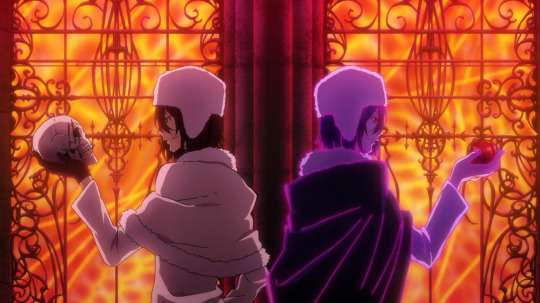
The first is of course Fyodor’s iconic line when his ability shows up on screen: “Crime and Punishment are close friends.” Everything he says after that point is already referring to Shibusawa again, so this is the only clue he himself is willing to offer up. If we consider that the abilities that get split from their users represent inner conflict, all he is saying here is that he apparently has no inner conflict. Does he know something else about the world? Does he just know who he is? Honestly, I don’t think we’ll get anywhere talking about Fyodor’s mental state.
Then there is the “I am Crime”, spoken by Fyodor holding the skull, and “I am Punishment”, spoken by his ability holding the apple. This one is slightly more straightforward. The ability user being the crime, and the ability the punishment. I’m not 100% sure if this is actually referring to Fyodor himself, or if it’s just about Shibusawa again. The skull (Shibusawa, an ability user) being the crime, and then the apple (covering the world with fog through Shibusawa’s ability, thus punishing ability users) being the punishment makes sense when viewed like this, but it could be that Fyodor is somehow also referring to himself during these lines.
Okay, if Fyodor is apparently not willing to open up, we can gather some more info just from what we can see instead of what we’re told. Most of what this part covers is taken from these excellent posts, but I’ll summarize it here for the sake of completion. Fyodor’s ability looks different compared to most other abilities. Most of the abilities shown in the movie have a blank face without any features, and have their gem on their forehead. The exception to that first part, interestingly enough, is Elise, Mori’s ability. This is most likely because she has physical form as an ability to begin with. Which then raises the question: does Fyodor’s ability also have a physical form outside of the fog? His ability looks identical, so that would imply some sort of clone ability. Next to this, Fyodor’s epithet is “The Conjurer”, which would be in line with him being able to create another copy of himself. (Though I should add here that the Japanese seems to just refer to him as “魔神”, which can be any type of evil spirit. However, if I’m not mistaken, the “Conjurer” should be from the official translation, but let me know if I’m mistaken on that.)
Finally, there is the position of the gem on Fyodor’s ability. Nearly all other abilities have their gem on their forehead, but for some reason Fyodor’s ability has his on his hand. The only other ability that has its gem not on its forehead is… the Byakko. I don’t have an explanation for this one, but the weirdness should be pointed out, since it’s another way in which Fyodor’s ability deviates from the others.
Next to the above, there are two other weird details I want to quickly touch upon.
First, the knives in the apples in the dish in Mukuroride, as well as the apples with a knife in them in general, as they are the theme of this movie. I believe this to be of a more metaphorical touch, so we won’t read too much into it, but it does have physical consequences that tie back to the title as well.
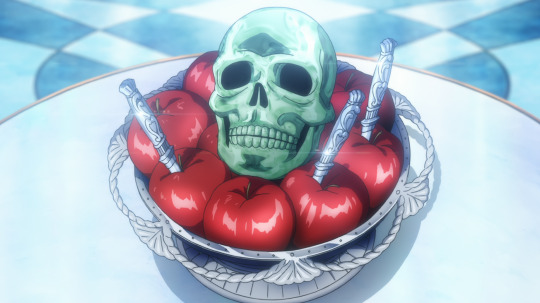
This exact shot is used four times throughout the movie, but with a varying amount of knives stuck in the apples. It starts with one, then two, then three. The room starts with just Dazai, then Shibusawa enters, then Fyodor. With each of them showing up, another knife appears in an apple. This is then a metaphor for these three being the instigators behind the Dead Apple incident. These knives in the apples can also be seen as their calling cards, as they were left both at the bar and at the scene of the crime where that agent was killed who was supposed to meet with Kunikida and Tanizaki.
In a later scene, it cuts again to this frame, but a knife and the skull has disappeared. These both get taken by Fyodor. The knife is used eventually to kill Shibusawa, but Shibusawa also took one of these knives to kill Dazai with. Either way, these knives that have been in these apples are used to murder, once again corroborating the connection between death and apples.
And finally, the relevance of the moon.

There are a few impressive shots of the moon in Dead Apple, where the moon is shown to be enormous, to the point where even the light novel points out how extraordinarily large it is. The novel also points out that the blue cube crystal holds a similarity to the moonlight. Just symbolism to show that it’s connected to Atsushi, or something more? The other side of the page in the main series will also only be written on the night… of the next full moon.
The Point of It All
I hear a lot of “Dead Apple doesn’t matter to the plot, just watch it for the Soukoku scenes and move on”. And while I do agree that it’s not mandatory viewing to understand the storyline that corresponds with season three onwards, I do think there is more to Dead Apple than most people give it credit for.
I always like to ask myself after reading a book or watching a movie: “Okay, so what was the point of that? What was I meant to take away from this?”
For example, in essence Stormbringer is a case study on singularities. Likewise, BEAST is a study into the limits of the Book, and all other side stories similarly have a message, however big or small.
So what does Dead Apple establish? Why bother?
I hope by now you agree that Dead Apple seems to be the introduction to explaining more as to what is so special about Atsushi. This seems to go deeper into chapter 28/29 of the manga, or season 2 episode 8 of the anime, where Atsushi also has some weird things going on with the tiger. What this exactly is, or where this seems to be going is unclear for now, but the Dead Apple definitely emphasizes Atsushi’s importance as well as the concept that there can be something more than just abilities.
In-universe, there are also reasons for this conflict to happen.
Most likely both Dazai and Fyodor knew the end result long before the conflict ever started. It’s their reunion in a way, so I suppose they are both seeing how the other’s condition is at the moment. They may even have gathered some intel somehow? It’s almost like collecting metadata, they won’t have a direct conversation about important things, but they try to collect information just by seeing how the other acts, to see if the other lies within prediction.
Aside from that, on Dazai’s side, except for foiling Fyodor’s plan and keeping Yokohama safe, the Shin Soukoku dynamic also gets strengthened, something Dazai is actively working on. On Fyodor’s side, next to giving the whole “eliminating all ability users” a good honest shot, he also gets to collect a lot of intel on the opposing side. For example, Fyodor in Dead Apple gets to see Corruption up close, which may potentially be relevant.
Finally, from a storytelling perspective, it sets up a lot for the third season, especially in character interactions and relationships, e.g. Atsushi & Akutagawa, Dazai & Chuuya, Kyouka, Fukuzawa & Mori. It should be noted that some characters literally have been intentionally regressed to make the ending make more impact. Whether that was a good decision or not is not why I’m here. You should just know that it’s intentional. You could chalk it up to Atsushi losing his ability impacting him and his behavior a lot, if you wanted to justify it somehow. The Order of the Clock Tower also gets its first anime appearance, showing Agatha Christie on screen, who will most likely play a more important role later on. Likewise, Dead Apple is the introduction to Fyodor as a villain, where you get to see him for more than just a few flashes.
Trivia and Fun Details
I suppose this section is skippable. But who doesn’t love trivia? This is by no means an exhaustive list of everything included in this movie, but rather an overview of what I personally caught, understood and thought relevant to include.
The “Dragon Head” in the Dragon Head Conflict refers to a Qilin, which are said to have similar heads to dragons. Since the conflict centered around the White Qilin, this is where that name comes from.
At some point Akutagawa and Kyouka use a mafia code to refer to a passageway. The code “0505” refers back to Atsushi’s birthday.
The symbol ᛟ found on the outfits of the Mukurotoride squad refers to inheritage, since Shibusawa inherited his own ability. More information about that here.
Dazai at some point meows at Fyodor. This is a very sassy way of telling Fyodor that he will personally eradicate all of Fyodor’s rats in Yokohama, including Fyodor himself. (The light novel calls it a “tedious” meow. Lmao.)
The music from Dead Apple seems to be recycled in season three of the anime. I’m guessing to save on budget?
Atsushi’s door that he eventually opens to unlock his hidden memories has its own music motif that shows up every time he thinks about Shibusawa, the fog or his memories associated with killing him. Try to pay attention to this, it’s really cool.
The motif of the door is also a tune that sounds a lot like the track named Dead Apple, further showing Atsushi’s relevance in his movie.
The lyrics of the soundtrack tell their own story. When the Dead Apple plot first takes off and Dazai is at bar Lupin, a song called My Prince plays telling of Snow White who is sleeping and waiting for her prince. However, it seems to be a spin on the classic, where indeed Snow White chose to knowingly bite the apple knowing it was poisoned, in much the same way as Dazai knew he was going to be poisoned in Dead Apple. Le Cheval Noir tells of how bored the singer is, and how nothing is special to them anymore. This plays during the scene where Dazai talks to Shibusawa, showing Shibusawa’s apathy towards everything. Mein Prinz, the song that plays as Dazai gets backstabbed, is nearly exactly the same song as My Prince, but now more dramatic and in German. This is a clue that Dazai saw this coming from before the Dead Apple conflict even started, and it’s now up to Chuuya again to save him. Overall, Dazai is leaning into the Snow White aesthetic hard in Dead Apple.
And finally, a list of everything the light novel insists refers to the theme of poisonous red apples: the red apples with the knives in them, apple suicide, the merged abilities producing a red sphere, the singularity that results from that in all its forms and the planet covered in red fog. If it’s red and spherical, you can just assume it should represent a deathly apple.
TD;DR
Recapped extremely briefly:
The Dragon Head Conflict introduces Shibusawa as a villain who was kept by the government but went off the rails. Shibusawa’s ability is a fog that splits ability users from their abilities. If ability users die, Shibusawa obtains their ability. Shibusawa died and inherited his own ability, also causing him to lose his memory. Therefore he wants to obtain Dazai's ability in order to gain what he feels he lacks. Dazai betrays Shibusawa together with Fyodor by combining abilities. However, Shibusawa kills Dazai first, adding Dazai's ability to the merged abilities creating a singularity. Fyodor kills Shibusawa, causing him to regain his memory of being previously killed by Atsushi. A dragon is created and defeated, and Fyodor's plan is revealed to be the covering of the entire planet in Shibusawa's fog, killing all ability users. This plan is foiled, but Atsushi is shown to have potentially another power next to his ability (the tiger). This power is possibly the ability to completely unravel abilities, and may be what makes Atsushi the guide to the Book. Mukurotoride is completely left unexplained in the movie, but there are clues given about Fyodor's ability that point away from an insta-kill ability, and more towards a clone type ability.
#bsd#bungou stray dogs#bsd dead apple#dead apple#bsd analysis#bungou stray dogs analysis#posted this also on reddit but. i forgor to post it on here. whoopsie.#glad i got this all written out though#like a weight lifted from my shoulders#this is actually longer than the reddit version so rejoice! you're getting the premium version#here's to hoping it shows up in the tags! 🙏🏻#suzenanalysis
487 notes
·
View notes
Text
i have just had a fucking devastating thought
it was just the thought that if dazai and chuuya were ever falling from a building or something, or say if something moriarty the patriot style happened, the only two options (once it was too late) for chuuya would be to save himself, or to save neither. there is literally no option to save dazai. in a mtp style situation, yeah, thats different.
but if they were both falling from a building/high place and were just falling?
chuuya literally only has two options.
on a surface level, only two.
save himself, or save nobody.
its like... symbolism for the two of them and this is devastating for two reasons: one, it means that chuuya is so selfless and loyal to a fault that his fight or flight responses are "me or everyone/nobody" like... does that make sense? he can die with dazai, or let dazai die alone. i dont know. I DONT KNOW. theres so much to unpack. and two: for dazai, it means that hes going to drag everyone down with him. nobody can even try to save him because its impossible to. its a reminder of how much of a "burden" dazai and his ability are (hes not lmao just what he probably thinks is what im saying) your only options are to fall with him, or leave him be, and dazais thought process would ofc be thinking that everyone would choose the latter, conflicting with chuuyas loyalty and compassionate nature to choose the former.
its such a dumb thought i know and i cant articulate it very well but i just thought about it and i got so sad lmao
its a bit incoherent, and oh boy do i have so much more to say on this topic now that its in my brain
#bsd#bungou stray dogs#bsd analysis#bsd chuuya#bsd dazai#dazai osamu#chuuya nakahara#osamu dazai#nakahara chuuya#manga#anime#bungou stray dogs analysis#bsd rant#just a smidge#lmao
232 notes
·
View notes
Text
BSD Fyodor Dostoyevsky: an in-depth character analysis
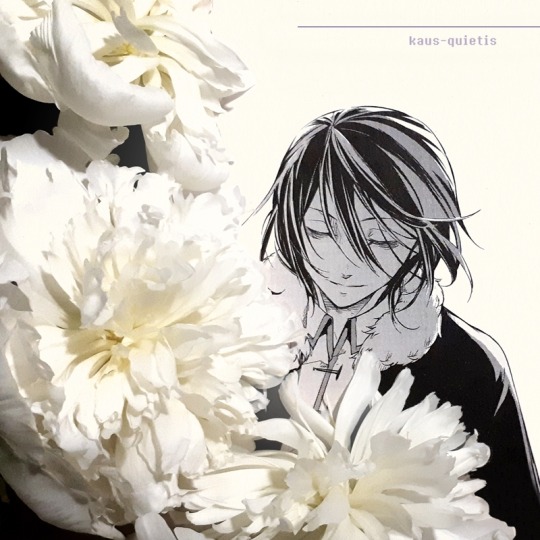
“Человек есть тайна. Ее надо разгадать, и ежели будешь ее разгадывать всю жизнь, то не говори, что потерял время; я занимаюсь этой тайной, ибо хочу быть человеком.” / “Man is an enigma. It must be unravelled, and if you will unravel it your entire life, then do not say that you have wasted time; I occupy myself with that enigma, because I want to be human.” – the writer Fyodor Mikhailovich Dostoyevsky, in a letter to his older brother, Mikhail (St. Petersburg, 16 August 1839)
The purpose of this post is to present and analyse information related to Bungou Stray Dogs’ Fyodor Dostoyevsky’s personality and methodology. Softer than shadow, unsolved and endless, Fyodor may as well “hide” his soul under our very eyes and we still would not know if that is the “real” him. This is my promised Fedya essay, an info-gathering analysis masterpost I hope you will enjoy and find useful for contemplating and coming to understand his complex character a little bit better.
Warning: merciless BSD manga spoilers. Literally spoiling everything. Also, this is an unbelievably long post (20200+ words). Have some lovely tea, listen to Rachmaninoff, and read in serene leisure or endlessly curious passion.
Last update: November 2022. 20.200+ words. The BSD manga reached ch105, the BSD anime completed season 3, while season 4 is announced for January 2023. Please refer to my original post (this one) in the future, as I could add updates periodically when new chapters release (or so I hope). Please note that I am using the official English translations for chapters 1-94 unless stated otherwise. I am eternally grateful for all fan translations. Lastly, please note that in this essay I will not focus on: 1) connections to F.M. Dostoyevsky’s Crime and Punishment or other literary works; 2) connections to F.M. Dostoyevsky’s biography / personal life; 3) possibilities of what Fyodor’s ability could be; 4) the philosophical and ethical side of Fyodor’s motives. All these would require vast separate posts entirely (who knows, I might write them too one day). My intention is to offer guidance in decyphering what Fyodor’s personality is truly like, as well as how his methods and tactics play a role into shaping said personality or BSD’s plot. Last note: in this essay, quite frequently, I am making references to other beautiful posts written by BSD fans, tagging them and linking to their posts. If you are tagged and want me to remove the tag, please send me a message via ask box and I will edit the tag out.
Sections:
A. Let the hand of God guide you: Fyodor and hand / arm symbolism
B. He understands human nature deeply, if not perfectly
C. He values independence and (most probably) his co-workers
D. No confirmation yet that he is brainwashing others and why this is relevant
E. He loves and lives for entertainment
F. Humble, not arrogant. Self-proclaimed god or servant of God?
G. A strange divergence inside Fyodor. Is he a singularity?
H. Soft, discreet, graceful, yet playfully dramatic. His body language in the manga, in comparison to the anime
A. Let the hand of God guide you: Fyodor and hand / arm symbolism
When it comes to Fyodor’s character, even choosing a starting point for our discussion about him might prove challenging. For all we know so far, he is a Russian man with a completely unknown past, he appears to be in his 20s, just a pinch shorter than Dazai (as @kaikaikitanmp3 showed here), elegant, alluring and ambiguously sickly (see section H for more on his self-proclaimed anemia and overall physique). Until we get more canon manga information on his personal profile, I propose we start from something that already has numerous ties to Fyodor’s character, a symbol we can present the many meanings of, only to abandon us to our roaming thoughts later. This symbol is that of the hand, and, before that, the closely-related symbol of the arm.
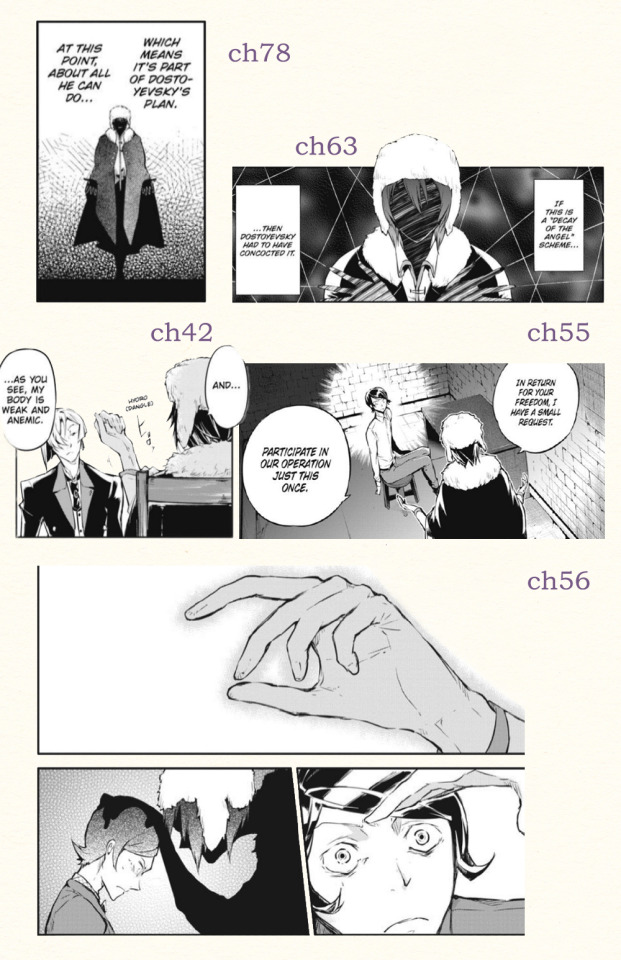
Embrace of all. A symbol of both power and protection, the human arm represents the instrument to apply justice and punishment, to rule and to guide. Not only that, but as a symbol of a human’s strength and capacity to act, its image becomes that of vitality itself. To open one’s arms is an act of invocation, raising them to the sky – an act of calling for divine blessing, but this welcoming gesture also renders a person wide-open and vulnerable, receptive and embracing. A certain humbleness and vulnerability is involved in this gesture, because only then one can wholly accept what stands before or above them, let them in, understand and feel them. This willingness to embrace alterity, when represented in art or various media, can be of different nuances, thus triggering different responses in the viewer: it can be soothing, heartwarming, comforting, just as it can be unnerving, constraining, intrusive even for even just suggesting such embrace. It is no wonder we see this gesture in how Ango apparently imagines Fyodor (ch78). While his arms are covered by his coat, his open hands, as of darkness, extend towards the viewer. This image appears as Ango concluded that Atsushi getting shot by Nathaniel, later falling unconscious in Anne’s room, was part of Fyodor’s plan. How this plan covered and embraced that outcome is portrayed as unsettling, therefore making good use of the negative values of such body language and symbols. Together with the ch63 panel where Fyodor’s faceless silhouette is shown with his open hands turned towards his chest, each finger pulling a thin string, this example, too, suggests the idea of Fyodor’s influence and interference being disturbingly omnipresent, this time with the hand gesture emphasizing the hidden character of his plans. A different example, of Fyodor conveying openness through body language, specifically showing his palms to someone while even opening his arms in a welcoming manner, is when he was negotiating with Mushitaro in ch55, offering to end his imprisonment in exchange for Mushitaro playing a role in Fyodor’s Cannibalistic Mutual Destruction operation. At that moment, Fyodor’s gesture conveyed the sincere character of his offer, made more impactful by being accompanied by much gesticulation on Fyodor’s part during the whole scene (more on Fyodor’s rhetorical use of expressive gestures in section H).
Honesty and harmlessness. The symbol of the hand also represents human ability to act, putting a start or an end to action, as well as having the freedom to act. Just like the arm, the hand is a symbol of power, justice and dominance, as well as guidance and bestowing blessings. Open palms, much like open arms, convey the message of having no ill will, no hidden secrets, thus presenting oneself in an open, vulnerable position, but also one allowing reception of the other, and, in the case of the open hands, showing willingness to share, as the hand’s different “powers” are almost as numerous as human actions themselves: to contain, to take away, to keep hidden, to harm, to mend, to unite, to divide, to guide, to give. The meanings of these, melted together, would all still accurately be applicable to Fyodor’s character, who, in the most general sense, just like Dazai’s character or even more so, represents the complexity of human nature, so rich in paradoxes, so ultimately impenetrable. Now, showing your hands, and especially showing your palms or inner part of your arms (interior side of the wrists and upper arms, for example), means showing you have no ill intent (based on how, for example, since ancient times, such a posture simply showed the other that you do not carry any weapons). Hence, in this line of thought, we can approach the scene where Fyodor showed his fragile hand and wrist to Ace in ch42. It has a double meaning in this scenario: firstly, Fyodor is indeed honest and open, he does not have an ill intent, because his hidden purpose, in itself, addresses the greater good of humanity; secondly, Fyodor’s intent becomes “ill” only when related to Ace himself, who saw Fyodor as a threat and was ready to deny Fyodor his personhood, as he did with all his subordinates, who became his slaves or, rather, his disposeable objects and instruments. In so many of BSD’s events and organisational dynamics, it is evident how relativity rules the verdict we as readers can give to various groups or characters. BSD features excellent examples of grey morality everywhere, and the problem of whether Fyodor is good or evil is no exception. It is all relative to a past and a future we do not know yet, while still maintaing a certain unnerving, dark side that undeniably accompanies Fyodor’s character at each step. The reader is then immediately reminded of this dark, threatening side of Fyodor’s, as he concluded the ennumeration of his physical and circumstational disadvantages with the abrupt “So how about this? I’ll kill you instead”. And while I did call this subsection “honesty and harmlessness”, everyone is conscious of Fyodor’s potential to harm at any time, most characters living in anticipation of being harmed by him, and yet we still have no clear idea how he applies physical harm (including death), despite having valuable depictions of how subtly he can exert mental and emotional harm, or simply influence, on others (more on that in the following sections). That being said, despite Fyodor calling humans sinful and foolish and expressing his desire to “purify” them (ch46, Fyodor: “Man is sinful and foolish. Even if they know it is all an artifice, they cannot help but kill each other. Someone must purify them for those sins”), we never see him acting like he hates or is disgusted by humans, nor like he forcefully wants to change how they behave. The latter reminds us of the thin line between plain manipulation (a thing Fyodor does when necessary for his larger strategic moves, as he has done in ch47 with fake Pushkin and the children or in ch75 with Sigma) and exerting oppressive corrective behaviour upon others (a thing we never see Fyodor doing, as he never changes the people he interacts with, who they are and what they value; see sections B and C). In fact, his openness to human nature in general is highlighted, for instance, in his interactions with Nikolai and in the way he talks about Sigma (see section C). Opposite traits blend perfectly into Fyodor’s character in most subtle ways, as I intend to prove by the end of this essay, so let us continue gathering such examples on the way, across all sections.
Bestowing blessings. In the manga, Fyodor was shown using a very specific hand gesture when using his ability on Karma, thus openly depicted only in ch42 so far. The same gesture, prepared but changed into one of covering Mushitaro’s head with its palm, appeared in ch56 in a hallucination, when Mushitaro was forced into a corner by Ranpo’s blackmailing, which for Mushitaro triggered images of Fyodor (more on this below). To me, this peculiar hand gesture is like a mixture of different acts I witnessed or experienced in religious contexts (to clarify my background, I’m slavic, Orthodox, and Eastern European, no “expert” in religions but fascinated by sacred rituals), and by this I mean specifically acts of blessing and chrismation done by priests. 1) Blessing marks bestowing holiness or invoking the divine will and protection upon a person (but also places, objects etc.), and is done in several ways: when one-handed and by a (consecrated) priest, using the right hand, with the finger positions spelling out the letters “IC XC” (for Ἰησοῦς Χριστός, Jesus Christ in Greek), the same sign being done with both hands when the gesture is two-handed; when one-handed and by a secular (also done between regular people occasionally), making the sign of the cross over someone or something using the thumb and index + middle finger stretched outwards, similar to the finger positions when making the sign of the cross on oneself. Fyodor’s hand position is most similar to the latter in this case, albeit with a sinister twist: Fyodor seems to use his left hand for the gesture. A different gesture for blessing, in this specific meaning mostly starting with the New Testament, is putting one’s hands over someone. There, this gesture is closely linked to the miraculous healings bestowed by Christ (as in Luke, 13, 13), and, after His ascension, keeping its relation to healing and bestowing the Holy Spirit, to the duty quite literally left in the hands of the apostles (as in Acts, 8, 17). 2) Chrismation is a Christian sacrament, where, in short, the priest anoints another person with the holy chrism, a ritualic ointment, while making the sign of the cross over specific body parts, each being a symbol of something, starting with the forehead (where the blessing of the mind is bestowed). Chrism itself, a common element in Mediterrean and Middle-East religious practices since ancient times, gained a particularly important role in Christianity, being used very often, in both baptismal and funeral rites, as well as sacraments (chrismation and acts of consecration). It symbolizes divine benediction, the gifts of the Holy Spirit, but also bestowing power and glory (in the context of coronations or such). Each time the author of the benediction is considered to be the divinity, whereas the one who applies the chrism on the other is a mediator between the earthly and the holy. Notably, this use in baptisms and funerals marks an associations with beginnings and endings, life and death. To me, Fyodor’s hand gesture when using his ability, particularly the gentle touch of another’s forehead, always looked similar to the act of anointing someone with chrism (though it is not usually done directly with the fingers, but with a little brush or one half of the ointment’s recipient), and in line with his canon dialogues, we could say what he bestows is “the great silence”, “the salvation of death”, which can turn into the blessing of a meaningful, peaceful death, bone-chilling nonetheless, such as in Karma’s case (ch42, see section B where I expand upon this). This gesture links Fyodor’s character to the image of a mediator, the role of “the right hand of God”, carrying out a mission that can be regarded as holy (based on Fyodor’s use of religious vocabulary), although we still lack canon material to fully establish whether that is only a trait of his way of speech or indeed a hint for his motives’ origins (see section F).
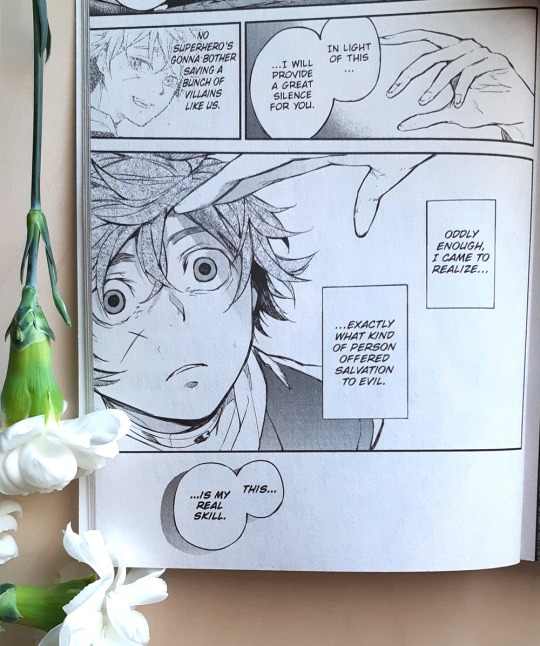
Threat and manipulation, relative examples. Later, in ch56, Ranpo hit Mushitaro’s most profound, personal weakspot by adopting Fyodor’s type of manipulation, in the form of a one-time bargain with emotional pressure, an offer he could not refuse (Ranpo would have releaved a truth Mushitaro did not want to make public if Mushitaro did not accept Ranpo’s terms; see also @looking-for-stray-dogs ’s post here). However, given that we already saw Fyodor offering Mushitaro a deal in ch55, there is a noticeable difference between Fyodor’s and Ranpo’s deal here, which, in my opinion, shows that Ranpo cannot immitate Fyodor completely (or refuses to) while he also imagines him as a much worse person than Fyodor can be deduced to be, in fact, strictly based on his interaction with Mushitaro. In ch55, it is shown that Fyodor simply offered to free Mushitaro from the basement he was locked in, in exchange for Mushitaro using his ability serving Fyodor’s Mutual Destruction plan once. This deal was fulfilled and their interactions ceased. I would call this a case of pragmatic manipulation, because Fyodor did not profit of Mushitaro’s feelings or past, he only offered freedom from Mushitaro’s cell. By contrast, Ranpo, assuming Fyodor works only (and especially) with emotional manipulation, simply blackmailed Mushitaro into turning himself in. Of course, Fyodor is capable of emotional manipulation (as in Sigma’s and Nikolai’s cases, see section B, but also section H below), but he can also manipulate others not even bringing their emotions into the discussion (as in Mushitaro’s case). By limiting his assumptions to emotional manipulation, Ranpo may be walking down a dangerous path, disregarding the full spectre of Fyodor’s methods. Assuming Fyodor is “the worst person possible” by default could also prove to be a wrong approach, as it is easier and convenient to conclude on that for others, but assumes too much about Fyodor and adds a rigid label on him, one that Fyodor can exploit later. In fact, we saw he already did once, by giving the worst relationship advice on purpose in ch64, in Meursault, when Dazai asked for said advice within Fyodor’s “All-smiles Problem-solving Roooooundtable” (and yet, this, together with Dazai’s lines, were shaped that way for the purpose of establishing the terms of their secret code, as I shall argue below, in section C). Meursault guards are portrayed monitoring Fyodor and Dazai, whom they consider “demons” of crime, expecting them to be exactly the worst souless manipulator and the worst flirtacious lunatic respectively. I would like to thank Eliott @stories-from-saint-petersburg for discussing this scene with me in-depth and putting this aspect of it into very fitting words I shall copy below. Besides the ideas presented here, see also section C for this brilliant scene’s actual meaning, according to what I could deduce further.
Eliott: “But also, they know they are filmed and that people are listening to them. So it would make sense to give answers that are more far from their characters, to confuse or not to give too much info to their jailors. Just like they switch to code when speaking about more serious things. That’d make sense in a strategy where you have to deceive your opponent, the opponent being Meursault. If they both give shit answers (and the answers that are expected from them), then the way they make up their plans will be still more difficult to find out by the prison.”
There is more to be inspected in Mushitaro’s ch56 hallucination of Fyodor covering his head with his palm. For this, I shall leave a different discussion I had with Eliott below:
Lav: “One difference is that Karma (ch42) actually experiences that touch. He sees Fedya's hand, he feels the touch of his fingers. It happened as an event in his life. In comparison, Mushi (ch56) sees this image when Ranpo blackmails him into turning himself in, as Ranpo makes a speech about using the methods of a demon to reach his goal (debatable, I will expand on this when the time is right). Apparently, Ranpo's speech triggers an emotional reaction in Mushi, who then imagines Fedya reaching towards him, making the same gesture he did to Karma, and the panels are white, while the end of this vision (Fedya placing his whole hand over Mushi's head) is in black.”
Eliott: “Can’t it simply show the effect Fedya had on Mushi? A feeling of being oppressed and trapped, or something akin to control from a mind that’s greater than his? To me it looks like an allegory of manipulation, but not especially like an ability or something akin to it.”
Eliott: “If Mushi saw Fedya use his ability, then he knows his touch means death. Anyway, he knows Fedya is dangerous. Touching someone’s head is a common symbol for either intimacy, fondness or manipulation. Mushi probably knows he can end up killed, and this is a fear that can explain this imagery, and even the manipulation he’s subjected to. The fear of dying is a good motivation for someone. Furthermore, he is still traumatized by the death of his dear friend, so it’d make sense this is very impactful for him, either death or being near / in danger of it? Also, Fedya here looks like how his friend is depicted graphically.”
Eliott: “<So,> he doesn’t have to <have experienced this physically before>! Imagining someone threatening touch you is frightening, even if you don’t know they can kill you with one touch. And when speaking of being trapped / manipulated, it’s quite logical to imagine the person that has you trapped touching you, it’s an oppressive image either way.”
Lav: “True. (…) One detail that supports this <that Mushi only hallucinated without previously witnessing Fedya’s gesture> is how in Karma’s case Fedya stretched out two fingers (index and middle) to his forehead, much like in a blessing gesture, while Mushi imagines a hand with all fingers fully extended towards his forehead. Also the death touch to Mushi is done with the right hand, while for Karma it’s the left hand??”
Eliott: “I still don’t understand that gkflg, I’m wondering if the artist just forgot to draw one right hand ahah”.
Important unexplained details. Everyone’s ability in Dead Apple has an ability gem located on their forehead except: Atsushi’s tiger (nape), Akutagawa’s Rashomon (inside its chest), arguably Dazai’s No Longer Human (inside his chest), and most importantly here Fyodor’s Crime and Punishment (the back of his right hand). Another note, out of all the abilities, only Mori’s Elise, Fukuzawa’s All Men Are Equal and Fyodor’s Crime and Punishment are able to talk or heard talking. One detail unique to Fyodor’s ability and Mori’s ability, though, is that they each have real eyes with irises and pupils, as if they are human, and not just an ability with empty, glowing yellow eyes like in all the other cases, except Atsushi’s tiger. One could surely speculate on why exactly Crime and Punishment has its ability gem placed on its hand, but I want to move on to other topics in this essay. Lastly, on Fyodor’s motto, “Let the hand of God guide you”, see section G.
B. He understands human nature deeply, if not perfectly
Contrary to the popular opinion that Fyodor does not have an ounce of humanity in him or that he cannot understand nor feel human emotions, the canon presents evidence that Fyodor understands other humans and their emotions profoundly. Let us keep in mind the definition of empathy (“the ability to understand other people’s feelings and problems”), as well as the fact that there are different types of empathy, such as affective empathy or cognitive empathy (the latter applying to Fyodor the best). Instead of speculating that Fyodor completely lacks empathy (a lack psychopaths share, and Fyodor’s case proves to be much too complex to simply throw into that spectrum and call it a day; see @tecchous-thicc-buttocks ’s post here, where OP not only has a great post, but also a smashing username AND a superb N.V. Gogol reference in their blog description to laugh your heart out to), I invite you to explore exactly the opposite, namely the idea that he has capacity for perfect empathy and uses it instrumentally to make it suitable for his plans. The canon material showed us many situations that support this (too), as we shall see below.
Fyodor “connects” with others mentally, emotionally and / or spiritually in such an accurate way, that this skill of his is portrayed as bone-chillingly sinister, in scenarios holding starkly contrasting ideas. It is not just about analytically deducing what a person would do next or what would objectively motivate that person, Fyodor knows the depths of people’s hearts, as can be seen in his discussions with Karma, Shibusawa, Nikolai, and the way Fyodor talks about Sigma. I shall present each case in detail in what follows, made into a list of people whose problems Fyodor saw through and responded to adequately.
Karma’s problem was of intellectual nature: to die a slave or a free man, and how those are mutually-exclusive conditions, in regard to which Karma recognized himself trapped in the first condition (slave), but was later “transported” into the second condition (free man) by the circumtances and type of death Fyodor “granted” him. Frequently rationalizing each situation in his inner monologues, pondering each factor and possible outcome analytically and in admirable control of his emotions (as seen throughout the entire ch42), Karma explored, so to say, the “syllogisms” behind what was happening to him too: I want to be saved + I am a bad person + saviours do not save bad persons => I will never be saved; OR I am a bad person + I am not a free person + a saviour can free me by saving me + saviours do not save bad persons => I will never be a free person. Even if the concepts belong to morality discourse, Karma’s approach is straightforward and logical, therefore there is no scene of him begging Fyodor for help, freedom or vengeance, as well as no scene of him even running away from Fyodor: despite being frightened, he was able to withstand his irrational reaction and sought knowledge and clarifications through conversation even in the face of the Demon. Karma was a person who rationalized and accepted his personal condition, and he was all the more shocked that this “slave” condition was dissolved by the events caused by Fyodor. Although Karma had to be killed so that no trace was left by Fyodor, what deserves attention is, on one hand, the fulfillment on Karma’s dying face (dying as a free man), and, on the other hand, how Fyodor gave him privacy when he gave his last breath, as Fyodor is portrayed looking directly at Karma only after he passed away. The fact that Fyodor is portrayed as looking at Karma’s lifeless body afterwards at all can be interpreted as Fyodor contemplating Karma’s end, especially given how in ch42 all background elements vanish in this particular panel, deepening the solemnity of the moment (as @linkspooky noted too, together with Fyodor’s understanding and acknowledgement of Karma as a person, worthy of sharing knowledge with, here). And yet the anime (S3ep4) did not insist on this manga panel at all, skipping it entirely. The prayer that Fyodor offered for Karma at the end (“May your soul find salvation… released from the yoke of sin”), while facing him (unlike in the anime, where Fyodor does not look at Karma at all) was the conclusion of Fyodor’s solemn meditation, and I find it a shame that the anime did not linger on this aspect. This scene blends a merciful death with a necessary crime, such contrasts being typical to Fyodor’s character. This prayer for Karma may in fact not be the only one Fyodor offered to those he led to their death by necessity: indeed, Fyodor’s cello recital in front of a captured Katsura in ch47 may have served the same purpose. Given that Fyodor informed fake Pushkin about Atsushi and Kunikida’s arrival, via the telephone, in real-time, we can assume Fyodor knew exactly when the two Agency members clashed with the armed children and when the little girl triggered the detonation of her grenades. After replying to Katsura’s remark, meeting Katsura with the impenetrable grin typical to both him and Dazai, Fyodor recommenced playing with closed eyes and no smile (thus fully immersed), unlike in the anime (S3ep9), where Fyodor never stopped playing in order to talk with Katsura, yet him stopping to play the cello just for that is, in my opinion, very important, as I will try to show here. Fyodor’s cello recital ended with him offering a prayer, which at its end addressed specifically all children of the world (ch47, “Joy to the world… and blessings to all its children”). Therefore, the cello scene carries solemnity, thoughtfulness and emotion, contrasting with the violent sight of the dead children breaking Kunikida’s spirit, and in this light Fyodor’s recital (which Katsura himself did not understand the purpose of, as he was clueless about what was happening outside) becomes a musical prayer for the sacrificed souls. Once again, despite being terribly beautiful in animation and sound indeed, it is a pity the anime depicted this scene in a weirdly ecstatic and stereotypically evil way, giving Fyodor a demonic gaze and grin, as well as making Fyodor face Katsura while playing, despite Fyodor not being turned towards Katsura at all in the manga (ch47), given how he looked at Katsura over his right shoulder (Fyodor’s body position further supports the idea that the recital was not meant for Katsura). As a closing note here, the anime added a specific detail at the scene’s end, one I personally would consider mischaracterization: in the anime, Fyodor broke his cello after the recital, and yet this never happened in the manga, and now we can guess why (Fyodor prays for his innocent victims). See section H for more on Fyodor’s overall gentleness, as well as my previous post about the cello scene here.
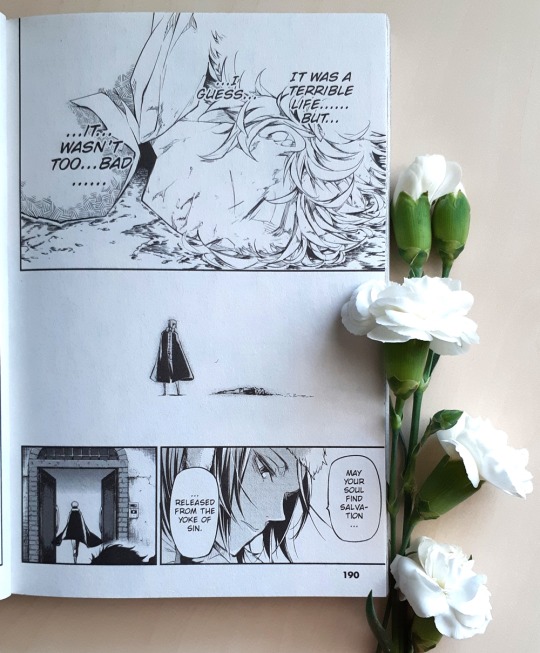
Sigma’s problem is of emotional nature: for a man without a past, lacking life itself before he found himself “existing” directly as a young adult (I assume he is a young adult), he was most desperate to fulfill his most basic and primary emotional needs, i.e. having a safe place to call his “home” and belonging to people whom he can call “family”. These are exactly the things Fyodor offered to Sigma right from the start, as if anticipating his arrival in that state, but Fyodor also praised and described Sigma for Dazai (ch75) in a very positive, heartfelt way that also implies Fyodor’s admiration for Sigma, as well as acknowledges a certain superiority Sigma has, even compared to Fyodor and Dazai themselves. Depending on the true nature of Fyodor’s relation to Sigma, as well as Sigma’s true nature in itself, I assume this point here will change in nuance in the future, but in the present the canon tells Fyodor has read Sigma’s heart like an open book. I refrain from adding more to this paragraph until new chapters give me new ground for it.
Nikolai’s problem is of philosophical and spiritual nature: the very fact that Fyodor could understand Nikolai’s core problem, his central existential dilemma, not to mention how quickly Fyodor grasped it, is something that both elevated and destabilized Nikolai. Fyodor rightfully explained that Nikolai fights God “in order to lose sight of himself” (ch78), which, theologically-speaking, is very much accurate from a Christian perspective: a human’s highest and final goal is to “see God”, to return to where man was exiled from (heaven, the Fatherland or patria in Latin, the future heavenly Jerusalem etc.) and, once there, to contemplate God eternally, finally reunited with their Creator and seeing “face to face” (see 1 Corinthians 13:12). That is, because there is where man’s real nature lies, where it came from and belongs to, but also man being created in the image and likeness of God (see Genesis 1:26), together with a Platonic and Neoplatonic philosophical legacy, led to a tradition of interpretations (part of our overall cultural heritage) where man’s divine part (or God himself) resides deep within the human soul: therefore, introspection or contemplating one’s own self holds incredible importance. Nikolai fighting God “in order to lose sight of himself” is a very well-chosen line for Fyodor and a great way of presenting (a glimpse of) the depth of Nikolai’s soul to the readers, one that opens many possible interpretations, not just the one offered above. Nonetheless, Fyodor’s response is particularly disturbing, because he calmly stated what frightens and enrages Nikolai the most: the fact that the sight of God is, in the end, the sight of himself, his true self, and “fighting against God” inevitably becomes “fighting against himself” too. So what is left when Nikolai fights against this truth? What is left must be what is unique to Nikolai as a being, if there is anything like that at all. So far in the manga, it seems Nikolai struggles desperately with the concept of the “omniscient God”, who possesses knowledge of past, present and future as well, which opens the particular Pandora’s box of “predetermination vs human free will”, a monstruous philosophical problem as old as time (or at least heavily discussed ever since Ancient Greek philosophy and Early Christianity too). One must note that, by answering like this, Fyodor essentially denied Nikolai the success of his mission, but granted him the rare gift or rare curse of being fully understood by someone else. One truth too much, the resulting emotional impact on Nikolai was disastruous, as Nikolai appears to be a person of high sensitivity, very susceptible to the power of words and how they plant ideas in his mind. Even if Fyodor’s response is not malicious in words (see, however, section H, about the meaning of the tilt of his head and how this scene is an example of intentional emotional manipulation), this interaction was profoundly unhealthy and destabilizing for Nikolai, which I would argue is well in the spirit of N.V. Gogol’s characters, having their spirits frequently broken by the most mundane things which nonetheless go beyond what they are capable to live with (read The Overcoat, Nevsky Prospekt first half, even Diary of a Madman).
Shibusawa’s problem was of personal nature, linked to his past: not only the Mayoi cards, but also the entirety of the Dead Apple movie make it clear that Shibusawa and Fyodor were long-time acquaintances before the fog incident in Yokohama happened. The most objective proof on this are Shibusawa’s words themselves, when telling Fyodor (in the Draconia room, in Dazai’s presence) that it was thanks to Fyodor selling information to Shibusawa that the fog incidents could happen, and in Yokohama too at such an impresive scale. Since Shibusawa told Dazai he did not find “having friends” necessary (since everyone was like a open book to him), I will refrain from calling the personal relationship between Fyodor and Shibusawa “friendship”. Now then, later on, despite being surprised by the ability-gathering Dragon event triggering after he approached Dazai’s “ability gem”, Shibusawa was not angry nor shocked when Fyodor cut his throat: Shibusawa immediately realized he found his most important personal memory as a consequence of Fyodor killing him or, rather, Fyodor “granting” him death once again. Here, too, two contrasting images combine: 1) Fyodor offering “death” as a “gift” or “blessing” that gives Shibusawa exactly what he needed most, and 2) Fyodor essentially killing his old acquaintance, but with the twist that Fyodor was aware Shibusawa would not die yet, quite the contrary – as a result of Fyodor putting a fragment of the crystal that gathers all abilities on the skull’s forehead (as a “small gift”, as Fyodor called it), Shibusawa was revived and enjoyed one last “epic battle” and then died a truly fulfilled person. In fact, Dazai predicted this outcome in the very first scene with the three of them at the table in Dead Apple, telling Shibusawa he is the one in need of “salvation”: Shibusawa then asked Dazai “And exactly who do you propose could save me?”, to which Dazai answered “Who knows? An angel, perhaps? Or, maybe, a demon” (then Fyodor enters the scene; note that I cite the dub version and that, at the end of Shibusawa’s and Atsushi’s battle, Shibusawa’s last words to Atsushi were “(…) The meaning of that man’s <Fyodor’s> words. I understand all of it now. It’s you! You must be the angel who has come to save me”). Anyway, the movie leaves several interesting questions unaswered: could Fyodor have granted death to Shibusawa, and therefore give him his most important memory back, at any time, or was the whole Yokohama setting necessary? If the latter, was it necessary for Shibusawa or necessary for Fyodor, and Fyodor acted only when their distinct goals aligned? In any case, allow me to expose something very intriguing in the next lines. After Fyodor granted Shibusawa death by cutting his throat in a single swift knife attack, the moment Shibusawa’s memory of his first death returned overlapped with the moment Atsushi’s memory of the same event returned to him as well. In the flashback, Shibusawa stated that he conducted those ability extraction experiments on Atsushi – specifically, Shibusawa pressed the switch – because “a Russian man” told him Atsushi’s “power was coveted by every gifted in the world”. Later, Shibusawa added “the Russian’s name was Fyodor”. This makes all events align in such a way that one could speculate Fyodor was leading Shibusawa and everyone involved with him (Ango and the government) down that precise path we see reach its end in the Dead Apple movie. This makes Fyodor’s words from ch42 all the more relevant: “People can be so simple… They truly believe they are thinking for themselves. (…) They don’t want to think they’re being led by the nose”; or, in S3ep4’s dub: “People are eager to believe that they are acting with free will, that they know best. (…) We all loathe to believe we can be controlled”. One last thing to note and analyse here: as Fyodor walked away alone on the hallway and the Dragon got unleashed, he had a “conversation” with Shibusawa’s skull:
Fyodor (sub): “I’ll tell you an interesting fact, in celebration of you finding a friend in me.”
Fyodor (dub): “In thanks of our newfound friendship, I’ll offer you a bite from the apple of knowledge.”
Fyodor and his ability then delivered their famous “I am crime. I am punishment” dialogue. While there are significant wording differences between the versions cited above, how Fyodor referred to “friendship” here is mocking and ironic, so the nature of the bond between him and Shibusawa (beyond that of “informant and information buyer”) remains debatable. It is beautiful how the dub version of the line offers a splendid example of godly and demonic imagery blending in the character of Fyodor. In a Christian cultural context, two precise ideas come to mind simultaneously when hearing Fyodor’s line: 1) it was God who created everything, including the first humans (Adam, then Eve) in Eden, amongst all the fruit-bearing trees, giving them rules as to what they could consume or not (the power and authority “to offer” something rightfully was God’s, being the one to give and take away, to reference Job, 1, 21), but also 2) it was the Devil who “offered” Eve such a bite, tempting her through suggesting she should eat from the forbidden fruits of the tree of knowledge of good and evil (the infamous “suggestion” was the Devil’s, making a forbidden “offer” that was actually a transgression). It is unclear to which of these two ideas Fyodor is closer, and it may as well be possible he is equally close to both, further encompasing contradicting traits. Nonetheless, given that Karma himself introduced the yet unresolved theme of “transcending human nature” and “transcending good and evil” in relation to Fyodor’s character (ch42, Karma: “Ace was evil, but this guy isn’t even that. He’s some kind of nirvana. Something that transcends mankind itself…”), this particular line from Dead Apple supports Karma’s observations and how Fyodor’s character combines the ideas of creator and destroyer, like @looking-for-stray-dogs put into beautiful words here. This only becomes more interesting when we consider the archetype or role of the “servant of God”, which Fyodor consciously claims to fulfill (see section F below).
Kunikida: Yes, you read that correctly. While Ivan and Nathaniel are, as of now, total wildcards and I do not have enough information as to objectively describe their situation or how Fyodor won them over or “read their souls”, Kunikida’s case is the perfect example of Fyodor’s understanding of a person being so deep and accurate that he knew exactly what actions would cause them to break and render them useless for a significant period of time. Moreover, Kunikida’s case becomes even more intriguing if we remember that Fyodor successfully read his nature without even meeting him. Well, that would be the introduction to this minisection about Kunikida, but frankly I did not have enough time nor energy to dig deeper into this as of now. Perhaps in the future I will update this part with information and links to several great analysis posts I am sure Kunikida fans wrote out already, with their whole heart in them.
These examples share the fact that Fyodor accurately reads the intellectual (Karma), emotional (Sigma), philosophical and spiritual (Nikolai) layers of the human heart, as well as is capable of perfectly adapting to one’s personal baggage on the long term (Shibusawa). This means he posseses an extraordinary capacity for empathy, but, as he never loses his composure (except for small instances of surprise or adrenaline rush, like in ch46 and ch53), his willpower controls every single gesture and reaction he makes, which makes him a terrifying foe who has complete control over himself, never overreacts and thus seems soulless (ch42). His understanding of human nature fiels his skill to deduce future actions and thoughts of other people, which in turn may deepen Fyodor’s individualism or trigger his eventual alienation (paired with perceiving humans as “boring” because they are predictable, to which Dazai disagreed in ch77, albeit it must be noted that this is only an assumption Dazai made about Fyodor, that is not entirely supported by the canon dialogues; see section E), as well as encourage Fyodor to use others as predictable (and therefore reliable) pawns in his plans. Again, Fyodor’s character combines two very contrasting yet interdependent things in his strategies: acknowledging others as humans (with individual problems) firstly, and using them as instruments when necessary, on that basis (as Fyodor becomes their problem-solver). This shows both how versatile and accepting Fyodor is as a thinker and leader (see also section C). Theoretically speaking, could Fyodor use Dazai as a pawn, if Dazai is completely alien from being human? But that would open another massive collective essay on what is going on inside Dazai’s soul and mind, as the fandom so often and so admirably tried to figure out already. Personally, I am a firm believer in Dazai’s humanity, and if Fyodor can indeed understand it all the way to its core, then one may wonder if Dazai’s humanity will be his downfall.
C. He values independence and (most probably) his co-workers
Continuing on the previous paragraph’s line of thought, here’s the catch: it is important to keep in mind that Fyodor nevertheless seems to treat certain “pawns” differently, perhaps considering them closer to him in some regard. People Fyodor refers to as “his staff” (and, in ch64, the faces of Ivan and Pushkin appear as examples) may be a matter of genuine concern to him, enough so that Fyodor asks Dazai how to make his subordinates less dependent on Fyodor: “My staff show no independence. All they do is wait for orders. How can I make them into good workers who take the initiative?” (ch64). To me, this question, even just as a light-hearted example for the sake of their shared prison mindgames, is plain shocking coming from someone always thought of as using people like tools and discarding them like broken puppets. As a first thought, to my stupefaction, Fyodor really took into consideration the independence of even his lower-ranking “pawns” as something worthy of a question, and valuable enough as to lament its lack. However, on later inspection I came to understand that Fyodor’s entire “roooooundtable” session from ch64 is in fact more like an icosahedron with razor-sharp edges (I mean, complex and slick), and can be taken both or either literally (like in this section I took Fyodor’s words literally) or figuratively, assuming Fyodor and Dazai’s answers as being each a substitution for something else entirely. Until I reach that point further down this section, there are more examples that refer to Fyodor’s perception of his co-workers (note: for the manga, my points of reference are the official English translations):
1) in Dead Apple, Fyodor celebrated what he called the “newfound friendship” between him and Shibusawa in Dead Apple, thus calling Shibusawa a “friend”, which is further supported if we take into consideration certain BSD Mayoi card descriptions (“Dragon Head Feud” card description, or “Bundled up” card quote: “Oh my, it seems that Dazai-kun and Nakajima Atsushi-kun have managed to evade us today. Well, if Shibusawa-kun is happy, then I'm happy. I'm his friend, after all.”); however, if put back in the larger context, the benevolent character of this statement is debatable (see section B);
2) in ch42, Fyodor told Ace “My friends have taken over the outside corridors”, thus directly referring to his Rats in the House of the Dead as “friends”, even if the fact itself was a lie to pressure Ace towards his suicide;
3) in ch95.5, silently agreed to considering Nikolai a friend when Dazai complimented Nikolai’s prison game idea. There are two instances where Dazai mocked Fyodor about having a nice friend in Nikolai, both of them in this chapter, and only in the second one Fyodor played along, agreeing to Dazai’s claim, but one has to bear in mind that the two could have been mocking each other in both instances:
Nikolai, ch95.5 (fan translation): “The wish to save my friend is indeed very difficult to falter. That’s why I need to shatter this determination, such to prove the free will of homo sapiens!”
Dazai: “Seems like… you have a nice friend…”
Fyodor: “…”
–
Nikolai (after a few lines): “From now on, you two will be participating in a jail break duel!”
Dazai: “You indeed have a very good friend.”
Fyodor: “I know, right?”
Leaving the debate open as to whether Fyodor is genuine when using the term “friend” overall (see also bsd-bibliophile’s post here, further inspecting Fyodor and Nikolai’s interactions, as well as mentioning one instance of the term “friend”, used by Fyodor for Pushkin, being present in the fan translation, but not in the original Japanese text per se), all this information nonetheless supports the fact that Fyodor himself may not be oppressive towards others, and that his methods rather rely on communication, negotiation and manipulation. Indeed, strangely enough, for example when approaching someone new with the intent to work with them, Fyodor’s ways are all “clean talk”: no torture, no physical abuse, no threats, no intimidation or humiliation, no blood as of now (on the possibility of brainwashing, see section D below). Instead, Fyodor becomes the ideal smooth-talker and deal-maker when first recruiting others, perfectly reading into their soul and appealing to their most intimate desires (see section B above, as well as @gold-pavilion / akai-koutei ’s post here /oldhere, and there was a beautiful addition by @/goddessesofeverything here, but all reblogs of the original post were deleted and I cry). When approaching a clear target, however, there can be freshly spilt blood, for example 1) Mori getting stabbed (ch46), 2) Katai getting shot (ch49), and 3) Shibusawa getting his throat cut open (Dead Apple), in each case the action being done directly by Fyodor (firing the gun or holding the respective knives with his own hands). Lastly, if we take into consideration how Fyodor played along with Nikolai’s puns in vol.14’s omake, and how highly and affectionately he spoke about Sigma in ch74 and ch75, Fyodor’s actual dynamics with his subordinates or fellow Decay of the Angel members could potentially surprise the reader in future updates, because his polite and discreet nature do not seem to be a mere façade.
Another point needs to be addressed here, and it is whether or not we can safely use the word “care” to sum up Fyodor’s relationship towards his close co-workers (thank you, Sel @oddeyesight, for your questions that led me towards considering this aspect in more detail). First of all, one needs to acknowledge there are persons Fyodor worked with and then disposed of in the most indubitable way, like the mafioso he forced information from in ch51, indirectly all children in ch47 and directly the little girl with the grenades, whom he talked to via telephone prior to the events. Secondly, compared to them, there are characters that are closer to Fyodor, which Fyodor refers to as “friends” (so far, this applies to Pushkin, Ivan, Nathaniel, and indirectly consenting to calling Nikolai a friend; see the paragraph above). Looking at definitions of the noun “care” – “the process of looking after someone” and “the process of doing things to keep something in good condition and working correctly” (Longman dictionary) – the first definition I give as an example here can imply affection, whereas the second definition does not, and refers to an impartial instrumental approach. So far, from what I gathered, there is no canon basis to claim Fyodor cares about someone else in the first definition’s sense, only in the second. Until future manga chapters may or may not change this, I propose looking at Fyodor from another viewpoint: in relation to the antonym of “care” (neglect), and a closely-related noun, indifference. For this task I propose starting with the following scene from ch74, when Dazai deduced the Sky Casino’s origin and purpose:
Dazai: “It was made for two goals. As a base for the next terror attack and as “payment” for the use of Sigma’s skill. …Never waste a thing, do you?”
Fyodor: “Our boss does hate to be wasteful.”
By saying “Never waste a thing, do you?”, Dazai implied that Fyodor executed all the steps he deduced, yet Fyodor shaked this claim off, directing Dazai’s remark toward someone Fyodor called “our boss”. We, as readers, naturally think of Fukuchi, who is the leader of the Decay of the Angel in title, but I dare say the entire fandom does not buy this, as in everything else Fyodor still acts like the puppeteer determining the actions of all the group’s members, whether they know it (Nikolai and Sigma) or not (Fukuchi probably and Bram). Fyodor humbling himself and downplaying his importance is a recurring behaviour of his, in varying depictions such as in ch46 (Fyodor to Dazai: “I will not be the one who will bring down your two groups. It will be you yourselves”), in ch73’s cover artwork of Sigma holding cards (where Fyodor is not an Ace, not even a King, he is but a Jack of Spades), in ch77 (Fyodor to Dazai: “Me? I didn’t do anything. I just sat here and prayed… and those prayers were answered”; see section F for more). This aside, hiding the identity of Fyodor’s “boss” had at least two purposes: 1) keeping Fukuchi’s double identity hidden (both the Hunting Dogs leader and the Decay of the Angel leader) and 2) redirecting not only Dazai’s, but our attention too. Since Fyodor and Dazai imagine their actions as if within a mental game of chess, let us reconsider the fates of Fyodor’s pieces so far, which include both the Decay of the Angel members and the Rats in the House of the Dead:
1) Pushkin was apparently captured and eliminated from the “chess game” (lost piece, used and then captured by the enemy in ch53), and yet he is alive and well, even shamelessly spilling information to Ranpo to save his own skin, while being interrogated (ch54), providing him with the lead on Mushitaro. Despite leaking information, so far nobody was sent to “clean” Pushkin off the table (as in Mushitaro’s case, whom Nikolai said he was assigned to kill off at the end of ch56). Pushkin leaking information may be intentional as part of Fyodor’s plans, which means Pushkin’s role likely did not meet its end yet.
2) Ivan was apparently captured and eliminated from the “chess game” (lost piece, used and then captured by the enemy in ch53), and yet Ivan survived and is probably held somewhere alive; also, Ivan’s loyalty and “happiness” never wavered, not even when in Rashomon’s tight grip (ch53), which means his trust in Fyodor remained unchanged and he did not abandon his role of Fyodor’s servant and “head chamberlain” (ch52).
3) Mushitaro was, most probably, really supposed to die (sacrificed piece, used and then disposed of: died in an exploding car after Nikolai’s surprise attack in ch56), yet he is still alive, last seen (iirc) safe in Poe’s mansion in ch78.5 (vol.18 bonus chapter at the end). Since Fyodor sent Nikolai to dispose of Mushitaro, it is rather clear Fyodor was not indifferent to Mushitaro staying alive, and now this is a loose end, one where Mushitaro survived and we do not know if this scenario has already been integrated in one of Fyodor’s larger schemes or if it will serve against Fyodor somehow later.
4) Nikolai was apparently supposed to die (sacrificed piece, used and then disposed of: sawed in half in ch58), and yet he is very much alive and already influenced the current events of the manga drastically. Furthermore, in ch95.5, when Nikolai started explaining his prison game, Fyodor replied “So that’s what you’re planning”, as if the two already agreed upon Nikolai doing “something”, and apparently that “something” remained a surprise to Fyodor, hence his reply was phrased as a conclusion. Note how Nikolai’s action remaining a surprise reinforce Nikolai’s freedom and agency, and Fyodor allowed this and played along, despite how accurate to his character it would be to have deduced Nikolai’s possible actions already. Then again, it could be that Fyodor knew that Nikolai had to hear precisely that kind of reaction, in order to continue playing a role Fyodor secretly predicted for him. Later, in ch98, after Nikolai’s prison game started, when Fyodor was waiting for Chuuya to arrive, Nikolai asked him “It’s been five minutes since the game started. You aren’t gonna move? Can I take that to assume… your pieces are already moving?”. If Nikolai’s prison game is an independent consequence of him independently choosing not to die, then why would Nikolai smile as if in agreement with Fyodor, supposing that everything went as planned? The problem of free will remains unresolved and tightly knit into Nikolai’s character even in the current events.
5) Sigma was apparently supposed to die (sacrificed piece, used and then disposed of: shot by Nathaniel in ch76), and just like Nikolai he is very much alive and playing a crucial role still unknown to us (in a conversation with Alex @vampireonastick I suggested that Sigma being on Dazai’s side of the prison game might be a well-disguised infiltration strategy already planned out by Fyodor, with whom Nikolai cooperates on this, despite Nikolai’s “sidequest” to kill Fyodor); we have an important hint as to how Sigma’s death was never required by Fyodor’s plan: the “roooooundtable” from ch64. It is indeed highly probable that the entire “all-smiles problem-solving rooooundtable” session proposed and moderated by Fyodor was his masked suggestion (masked from the guards!) of creating a unique substitution code that only he and Dazai would be able to communicate in, as @fantastic-rambles analysed more in-depth here. And just like @mydearestt noticed in this post here that, through his reply, Dazai in fact referred to his plan to make the Agency move, the same can be assumed in Fyodor’s case. To remember the dialogue, I shall copy the revelant part here below:
Dazai: “Me next. “I tried asking the café waitress out, but she won’t bend an inch. What should I do?”
Fyodor: “Make her lose her job and home, trick her family into disowning her and she’s bound to come crawling to you.”
I propose reading this sequence as referring to Sigma entirely, because: 1) Sigma, much like a waitress, was contained and bound to his workplace, the casino, unwilling to leave once there, no matter who asked; 2) Fyodor set up the entire scenario of making Sigma lose his job AND home in the most literal sense by completely destabilizing the casino; 3) by doing unbecoming irreversible actions, Sigma secured his own family rejecting him, and all ties were cut with Sigma’s “death”, yet Sigma survived – equally destabilized, he ended up in a situation where, if Fyodor would have granted him another wish, Sigma would not have refused, naturally seeking the one person who may still have power to grant wishes as grand and Sigma’s, and that is still Fyodor, who both gave and took Sigma’s home. This being said, like Alex @vampireonastick theorized in their post here, I strongly believe Dazai strategically manipulates Sigma in the prison game, “shaping” him to defy Fyodor, the person he would otherwise “crawl back to”. However, since Fyodor chooses his words with utmost care all the time, no matter if truthful or deceiving, I personally doubt Fyodor would carelessly share his strategy (disguised as the grimest relationship advice) without it already being implemented into a larger scheme, in which Dazai acts upon the words he hears from Fyodor (and Dazai already did so twice in this arc, firstly by choosing Sigma, secondly by “building up” Sigma for his eventual refusal of Fyodor). What Dazai perhaps does not expect is the fact that Fyodor himself already talked to Sigma in ways that reinforce Sigma’s agency: for example, in ch73, Fyodor directly told Sigma that, should the Hunting Dogs attack the casino, Sigma should run as he would have no chance of winning; Sigma, on the contrary, remembering Fyodor’s words – not once, but twice in the chapter –, was pushed only more vehemently to defending his casino, thus acting on his own and defying Fyodor already, a reaction Fyodor most likely anticipated when making Sigma hear his “advice as a co-worker” (in Fyodor’s own words, ch73). In the end, regardless of the content of Fyodor’s words, it seems his kidnapper from ch42 offered honest advice to Karma: “Watch out… If you talk to him, he’ll pluck your mind out”. Despite how there is no proof of an actual “plucking of the mind” action yet (see section D), Fyodor’s words (often, if not always) twist the minds of those around him in a way that, paradoxically, both acknowledges and denies them their free will, encouraging decisions that seem free to the agent, but are already predicted and known to Fyodor (and in this, I must admit, Fyodor bears a resemblance to an omniscient god; however, his canon dialogues often convey a different role, a tension I discus in section F). In this light, I wonder if Dazai had this behaviour before too and acted upon words he heard from Fyodor in previous instances, such as the Mutual Destruction arc.
6) Nathaniel was apparently eliminated from the “chess game” entirely (sacrificed piece, used and then disposed of: captured in Anne’s room of no return in ch76), yet this does not imply he is dead, which begs the question if Anne’s room, the Agency’s only true safe space, is now compromised, as me and Alex wondered here (see also the reblogs and replies to their post).
One thing I want to remark here is that, despite how clear it is that Fyodor “moved” all these “chess pieces” already (only number 3 to 6 are relevant in this case), in ch76, right after Nathaniel got captured, as Atsushi and Lucy were celebrating their victory, Ango explained to them how the events at the casino were no victory, and how instead everything played as Fyodor has planned, claiming that Fyodor has not made any move yet:
Ango, ch76: “We lost because you let Sigma die. Now we have no leads to the Page. And… the Hunting Dogs saw us try to rescue him. In their eyes, that likely looked like the Detective Agency helping their terrorist allies. Our plan failed and we’ve only sowed more doubt. This is likely exactly as Dostoyevsky planned. Frankly… I can’t stop shaking. Until now, he moved none of his pawns and gave us no room to deal with him. (…)”
As I shall leave Ango analysis to Alex @vampireonastick like in this post here, I will return to the fact that so far the only true “chess piece” that Fyodor ever truly let die was Shibusawa. Then, to sum up, when his co-workers fulfilled their purpose and no use nor entertainment can be obtained from them anymore, Fyodor’s pattern seems to be leaving said co-workers with apparent indifference to their well-being, often abandoning them in a state or situation that is destructive to them (Shibusawa is the clearest example, but it applies to all other aforementioned characters as well). However, the twist is that none of these characters did reach the end of their assigned roles yet (and we may wonder if they will ever do that), given that Pushkin, Ivan, Nikolai, Sigma, Nathaniel and even Mushitaro are all alive and healthy. Consindering all this, the way BSD is narrated becomes even more interesting, because the reader would naturally project treating others as expendable on Fyodor, where in fact it is more accurate to Dazai’s character to act this way (and he did and does act that way, as @linkspooky pointed out in detail in their post here). Back to Fyodor’s “our boss does hate to be wasteful” line, while still just an interpretation, it would make sense that Fyodor refers to himself or his ability (if it’s a separate conscious being, see section G) as “our boss”, because all this information suggests that Fyodor himself hates to be wasteful, and that, excepting Shibusawa, Fyodor never wasted even a single pawn of his. That means Fyodor never neglects his co-workers (whom he calls friends!) and is never truly indifferent to them, albeit in an instrumental way, given that there is no proof yet that Fyodor’s care towards his co-workers is affectionate in nature. Let us close this section with a treat, though: in ch51 and ch53, there are two panels of a teacup with three teaspoons to its left. Differing greatly from the anime, albeit delivering the same subtle deception, these three teaspoons help in fooling the reader into thinking that Ivan poured tea in Fyodor’s cup, placed the teacup in front of him and then Fyodor consumed that tea, together with the jam that filled all three teaspoons at first (ch51). Given that 1) Ivan prepared the tea with three teaspoons of jam and 2) at the restaurant, Fyodor drank his tea exactly like that, with three teaspoons of jam, from this we can deduce Ivan is very familiar with Fyodor’s tea-drinking habits, which in turn leads us to the very likely idea that Fyodor and Ivan (if not also together with other members of the Rats in the House of the Dead) frequently had tea together, or Ivan prepared tea for Fyodor often enough to memorize his precise habits. The latter would support Ivan’s self-proclaimed status as Fyodor’s “head chamberlain” (ch52), suggesting that their group lived as family and / or nobility in the same house, if the definition of “chamberlain” is taken into consideration (Longman Dictionary: “chamberlain, an important official who managed the house of a king or queen in the past”).
D. No confirmation yet that he is brainwashing others and why this is relevant
Speaking of his methods of acquiring new collaborators, so far, it is most certain that Fyodor is not brainwashing people: not Fukuchi, not Nikolai, not Sigma, not Karma, not Pushkin, and certainly not the little girl with the grenades, even though the anime depicted the scene differently (in the manga’s ch47, a flashback appears where Fyodor talks to the little girl via telephone, thus he does not simply appear in her clouded mind like in the anime’s S3ep9).
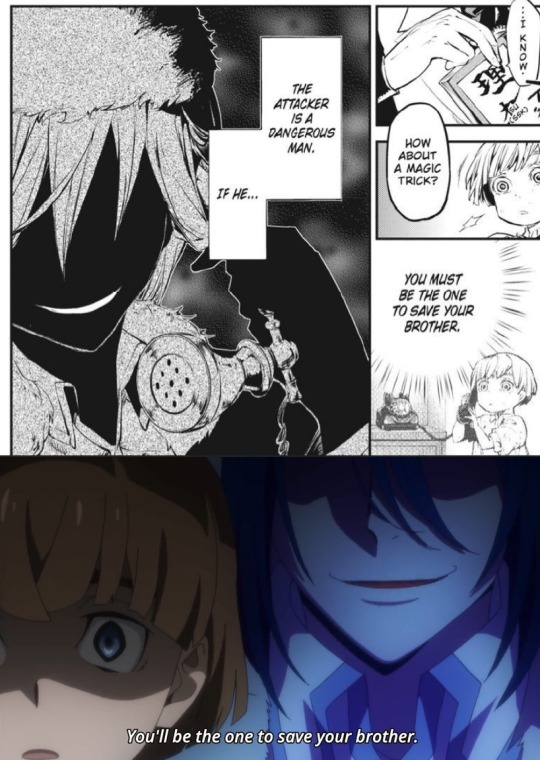
But two characters Fyodor works with are in a very ambiguous position as of now: Ivan and Nathaniel. To begin with, Ivan’s case is very tricky at the moment. In ch53, he openly told Akutagawa that “my master cut out all the parts of his brain that feel unhappiness”. What can I say except our dear Vanya here is a lil’ crazy. I find his replies rather unreliable at the moment, because he is the only Fyodor-subordinate who is behaving like an intoxicated bacchant for now. While the ch53 quote is singular and, therefore, I cannot make anything of it, there is another thing that needs to be considered: in ch52, as he was walking away from Akutagawa and Atsushi, Ivan told them “I will not forget you. …No… You will now serve as part of my master’s joyful order”, but immediately after that he added “after 10 more steps, I will most likely forget your faces”. Apparent self-contradiction aside, whether he meant “forget your faces” literally or not, Nathaniel, too, went through an apparent mind-reset, as he did not recognize Akutagawa in ch46 and appears to have lost his entire personality except for his devotion to Margaret Mitchell and his determination to save her life. Now, mind-resetting and brainwashing are not the same, and removing a part of one’s brain or mind that is responsible for a specific emotion is, likewise, something entirely different. The manga did not give us further examples of similar things that Fyodor apparently had a role to play in, so I cannot present anything new here, only speculation. We also do not know if these effects are caused by Fyodor himself (without using his ability at all, much like he could simply talk Ace into his own suicide in ch42) or Fyodor’s ability specifically. This simply limits my current analysis of Fyodor’s methods to the beforementioned “communication, negotiation, manipulation” trio, which is not dependent nor related to his ability, and I will update these parts if the manga later reveals that Fyodor did indeed mold the conscience or minds of other people into whatever shape or state he desired. Until then, he is literally just a genius smooth-talker, and I refrain from making rash affirmations or going into more speculation here.
E. He loves and lives for entertainment
So many canon lines convey Fyodor’s love for entertainment. It is more specifically entertainment in a “good literature” sense, meaning conflict, tension, intensity of will and emotions, devotion, despair and generally human beings fighting for their needs or to solve their problems of many different, often opposing kinds. Let us take Fyodor’s own words as references. First of all, at the beginning of the Dead Apple movie, as younger Chuuya destroyes the entire building in which he and Dazai found Shibusawa the first time, Fyodor watched the scene from a safe distance, on top of a building. All he did was “absorb” the whole event with utter satisfaction, concluding the scene with his line “This is too much fun”. The motif is repeated several times in the Dead Apple movie, linking his own enjoyment of whatever chaos unfolds to “fun” and “entertainment”, so this line is not the sole evidence that entertainment is greatly valued by Fyodor, as it is the thing opposed to boredom, which constantly eats away at his and Dazai’s hearts because of their superhuman intellect. As Fyodor was getting the two most important ability gems ready for his and Dazai’s plan, Fyodor tells Dazai “Would you not agree that the more entertainment there is, the better?” (dub); moreover, at the end of the movie, his lines highlight the privileged spot of “entertainment” in his understanding of the world around him again:
Fyodor (sub): “Everything is but entertainment. But in order to end this world, rife with crime and punishment, I do need that book. The blank novel sleeping in this town.”
Fyodor (dub):“Everything is just entertainment. However, this world is so rife with crime and punishment… In order to finally end it, I do need that novel. This special book that sleeps somewhere within this city.”
However, paying close attention to his words, we need to consider the possibility that in this instance Dead Apple either contradicts or deceives the watcher greatly, because in the manga Fyodor’s goal is clearly referring to “saving the world”, not “ending the world” (see also section G, near the end, for more on Fyodor’s possible motivation).
Now, in the manga (ch63), Fyodor stated that he openly refused to devise a perfect plan (as demanded by another Decay of the Angel member, possibly Fukuchi) because perfection is boring (Fyodor, ch63: “A Decay comrade asked me for the perfect plan… but perfect is so boring. I won’t be able to view the karma of humanity like this”). While at first glance one could be surprised by this statement, especially considering that “God prefers perfection and harmony”, in Fyodor’s own words from ch77 (see section G where I expand on this specifically), both lines (perfection is boring + God favours perfection) could potentially be extremely deceiving: since the Agency knows Fyodor is involved in crafting the Decay of the Angel’s plan, it is probably this implication that leads, for example, Kyouka in ch63 to tell Atsushi that their plan is “extensive and flawless”, and Atsushi’s inner monologue, as a response, appears together with a panel of a faceless Fyodor pulling strained strings in the darkness. If everyone expects Fyodor to be perfect and to create flawless strategies, an opponent like Dazai could include unpredictable, irrational or impulsive actions in his own strategies to outsmart him, as Dazai describes his appreciative acknowledgement of this behaviour he finds in other people (Dazai to Fyodor, ch77: “What’s driving the world are those in the storm of accidental events who scream, run and spill blood. Faced with their souls, you and I should be petrified with fear”; more on this specific dialogue in the next paragraph). But knowing this reaction would be triggered, Fyodor could always integrate imperfections in his plans, leaving his opponents with the impression that they act in the right way, on their free will, when in fact nothing they do has not been already considered by Fyodor (holding true to his lines from ch42). Personality-wise, the “perfection is boring” line becomes relevant if (and only if) Fyodor really, truly means it literally, and 1) does not say it just to tell what his opponent(s) (or the reader themselves) would want or expect to hear, without meaning it, or 2) does not say it as some kind of reverse-psychology, without personal attachment, to trigger predictable reactions in his opponent(s) (again, see section G for a continuation of this particular discussion). As a last example to support the idea of Fyodor loving entertainment, finding both fun and beauty in it, when a very shocked Dazai was asking Fyodor about the reason (“for what?”) for his stupefying strategic moves (the coin bombs, staging the casino as the battleground etc.), Fyodor only replied “Isn’t it more beautiful that way?”.
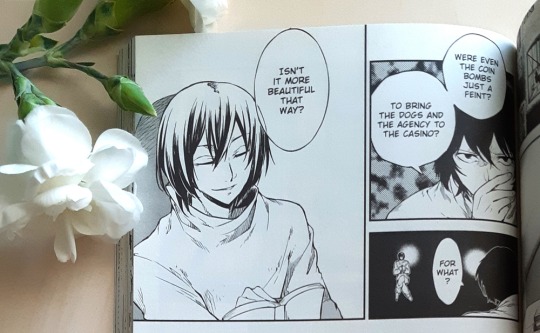
Now, ch77 presents us with a dialogue between Fyodor and Dazai which seems easy to understand at first, but becomes increasingly complex the more one dwells on it. To remember the full context clearly again, I shall sum it up and add the full relevant quote here: after Fyodor told Dazai that “God favours perfection and harmony”, after which it is confirmed that the Page was also used for changing all the world’s police and investigative agencies not to act upon evidence of someone framing the Agency, a parallel is shown with Tachihara who, inside his heart, decided to finally identify fully as part of the Port Mafia, exiting the inner state of being a Hunting Dog (military police force), thus existing the Page’s influence. Tachihara’s situation exemplifies what Dazai then explains to Fyodor:
Dazai, ch77: “Ha-ha-ha-ha-ha-ha-ha-ha-ha! Siding with God sure didn’t teach you much!”
Fyodor: “…Let’s hear it.”
Dazai: “‘Perfection and harmony’? To God, those amount to a hill of beans. I saw it many times. All HE offers is happenstance and absurdity. A weakness… shared by the two of us… For all our ingenious plans, in the end we’ve wound up here, in a deep-level prison. What’s driving the world are those in the storm of accidental events who scream, run and spill blood. Faced with their souls, you and I should be petrified with fear. (after POV change to Tachihara) You’re right. People are sinful and foolish. But… they aren’t as boring as you think they are.”
In Dazai’s dialogue, I put in bold two quotes that need to be inspected. The first one refers to Dazai pointing out a weakness the two geniuses share, which refers to the primacy of the accidental in reality, as opposed to the predictability both Fyodor and Dazai operate with in all their plans, which can make the world seem trapped in an inescapable causality rationally-accesible to those with an intellect such as theirs. Dazai “bets” against Fyodor on this cruel primacy of “happenstance and absurdity”, where reason fails to follow the exact consequences of each event or human action, and yet the nuances and risks of this “bet” I already exposed in the paragraph above. In this context, Dazai seems indeed to talk about this weakness in an admirative, even hopeful tone, despite the fact that he shares it; for a brilliant exposition on Dazai (both the author and his BSD counterpart) in relation to sin and weakness, I wholeheartedly recommend reading Kat’s (@pompompurin1028) essay here. When Dazai stated this, a flashback to Odasaku’s fight with André Gide is shown, which can be interpreted as that one time Dazai’s predictions held true, yet still Odasaku chose to fight Gide, fully aware of the end, driven only by what I would call here human subjective drive. Such human subjective drive, independent from reason and logic, is what awakened in Tachihara as well: if Odasaku served as an example of “defeating” Dazai by exploiting his vulnerability to the (uncontrollable) accidental, then Tachihara served as an example of “defeating” Fyodor’s precautious plans by unexpectedly exiting the Page’s influence. In the end, this parallel can become unbalanced if Fyodor already included this kind of variables in his plans and works not ignoring, but embracing human individuality and spontaneity, which I would argue is (paradoxically) more likely the case, for what I exposed in sections B and C.
As for the second quote I put in bold, there are at least the following examples that render Dazai’s assumption (that Fyodor considers people boring) untrue: 1) in ch75, Fyodor openly praised Sigma, carefully examining his personal torment, placing him not only above the Hunting Dogs, but also above Dazai and himself, as well as “all of creation” ; 2) in ch78, in a flashback, as a reaction to (presumably listening to) Nikolai’s inner struggle, Fyodor replied “That’s wonderful”, smiling and tilting his head (see section B, as well as H for the significance of the tilt of the head); 3) in ch80, Fyodor described the Agency “as beautiful as the evening sunlight (…)”. If people are indeed boring to Fyodor, he would not find their struggles and states worthy of deeper consideration, lengthy speeches of praise or expressive, poetic comparisons (admittedly with a dash of pity and sarcasm towards the fate of the Agency). So far, Fyodor is never shown expressing boredom in the presence of other people, quite the contrary: he is shown expressing sincere interest, as if each human is a case study, an enigma to be unravelled, much like Fyodor himself is to me, and to us within the BSD community (therefore I chose that specific fragment from F.M. Dostoyevsky’s letters to start my essay with, as a motto; there is much more to be said about that, but I reserve that for another possible future essay, where it would be necessary to discuss Fyodor’s character in light of his corresponding author’s biography, personality and literary works as a whole). And so, I would argue that to Fyodor humans are not boring, but providers of entertainment worthy of attention and inspection, even more so when they play a role in his plans (and it seems everybody is playing on a stage set by Fyodor so far).
Fyodor is also quite fond of not only perceiving events or circumstances as games (like his mental chess game with Dazai in prison, starting in ch63, always mirroring the course of everyone’s actions outside), but also proposing this approach to others (his rooooundtable in ch64 and his card guessing contest with Ace in ch42), albeit not carelessly, as each time such – yeah, I cannot avoid it at this point, I’m a gamer myself, here it comes *inhales deeply* – each time such gamer approach has a multifaceted utility and never strays from serving Fyodor’s two main purposes, achieving his plan to cleanse the world of abilities, and having fun (yes). Killing boredom via playing games, especially when in the company of a person on the same level, seems to be the first move Fyodor does when faced with monotony (even in vol. 20’scredit page, where Fyodor said “I’m bored. Let’s play twenty questions”, even if Dazai immediately delivers the final answer “Snow White”, and thus Fyodor retracted his idea with “Actually let’s not”, as Dazai’s superhuman intellect killed the fun too fast).
To look into two examples just a bit more, in ch64, during his roooooundtable with Dazai, Fyodor suggested “Next, let’s ask a question at the same time”, which appeared to be innocently fun, because it challenges two persons, in this case a native and a non-native speaker of Japanese, to coordinate their spelling just for the amusement of simultaneity; then, in ch97, as Nikolai’s deadly prison game was about to start, Fyodor lamented the outcome he was confidently foreseeing: “Yet losing a chess opponent in the next 30 minutes is still quite sad”, saying this teasingly, still talking as if in the context of his and Dazai’s mental chess game. On a last, entertaining note, because why not, this entire section might as well serve as proof that Fyodor is cat-coded, just like Dazai (see @wintertaurus ’s post here, where they scientifically prove this, I don’t make the rules), despite being the leader of the Rats in the House of the Dead, and so one more fine example of a fictional INTJ further strengthens the definition of INTJs as “human cats”.
F. Humble, not arrogant. Self-proclaimed god or servant of God?
Starting with the latter half of this section’s title, that is a very tricky subject, in fact, because we as manga readers can observe both 1) one line that established a connection early-on between Fyodor and calling himself “a god” if God is dead and 2) many lines by which Fyodor is actually displaying behaviour and speech akin to a self-aware servant of God. Let us begin with the first one. So, in the first chapter dedicated to showing Fyodor to the readers in more detail (ch42), and only in the original Japanese version and the fan translation, the first page of the chapter together with the last page feature a quote from F.M. Dostoyevsky’s Demons. The quote put together is “If God does not exist, I am a god”, which is part of a dialogue by the character Alexei Nilych Kirilov (“Если нет бога, то я бог”, see Part Three, chapter VI, II). Perhaps a beautiful coincidence, but in this exact wording that the fan translation chose, the quote also appears in Albert Camus’ The Myth of Sisyphus, chapter “Absurd Creation”, subchapter “Kirilov”, where the French author discusses F.M. Dostoyevsky’s Demons and the mentioned character, Alexei Nilych Kirilov. There, Camus calls that line “Kirilov’s premise”. In retrospect, this is a very puzzling line to appear associated with Fyodor, or rather appear as spoken or thought by him, giving the ambiguity of the quote’s placement on the pages. It is also puzzling because until now BSD gave us a character who seems like a better candidate for using that quote or being a reference to Kirilov, and by that I mean of course Nikolai. Moreover, the way Fyodor talks about or mentions God in dialogues that are clearly spoken by him later (I shall discuss examples in the paragraphs and sections below) very much conveys the message that Fyodor does not think God is dead, invoking him over and over (whether he is referring to the Judeo-Christian God or simply “a god” is not yet addressed in the manga). Still, the most striking information about this quote remains the fact that it is not featured in the official English translation at all. For comparison, I shall put an image with the last page in both versions below, and you can see the scan of the Japanese first page of ch42 here.
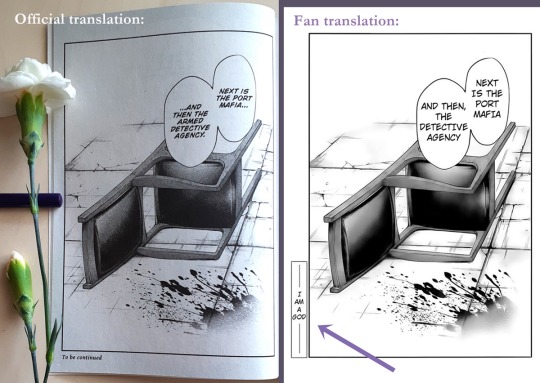
As we are walking on quicksand with this one, let us move on to the second point I mentioned at the beginning of this paragraph, about Fyodor as a servant of God. Because of his mission, of which he speaks as if it is of a higher calling, of divine nature, Fyodor also appears to see himself as a servant, namely a servant of God (servus Dei). He has the mind and the skill to carry out a mission of divine proportions (for us readers still an ambiguous goal: Fyodor, ch46: “And I will use that Book to make a world free of sin and skill users”, where “skill” means the same as “ability” and “gift”, as the fandom is used to these terms more). This, in turn, could have made him develop a strong sense of responsibility and a feeling of authority. As we are currently following the “servant” train of thought, these (sense of responsibility and authority) are not to be confused with what is called a “god-complex”, a slang expression which loosely corresponds to different actual psychological disorders such as narcissistic personality disorder, a thing Fyodor does not display core traits of. As of now, Fyodor remains surprisingly humble, discreet and respectfully formal both in speech (see @looking-for-stray-dogs’s posts here and here) and in gestures (see section H, on Fyodor’s body language), he acknowledges the possibility of imperfections and even welcomes them (ch63), he was never portrayed as becoming irritated at others (except his eyes expressing either anger or furious determination, as Dazai attempts to drown him and Chuuya in ch101), he is not a show-off and is indifferent to being adored or agreed with, and he knows how to take criticism elegantly when Dazai holds different opinions or outwits him. It is true that his grandiose “divine” goal, his frequent use of manipulation, and his apparent omnisciency and unbreakable composure give enough space to speculate regarding an underlying “god-complex” in his character (together with the ambiguous use of the quote discussed in the paragraph above), but the reader must acknowledge that, in all his replies, Fyodor refers to himself as if to a servant of God par excellence, as is the most evident in his ch77 reply to Dazai: “Me? I didn’t do anything. I just sat here and prayed… and those prayers were answered”.
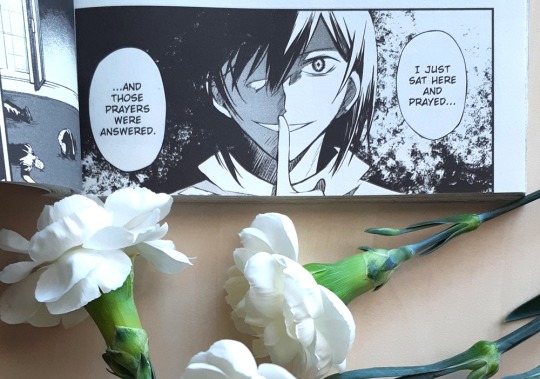
This direct self-characterization, too, plays against him having an actual “god-complex”. I would say that, by building on the humble yet powerful servus Dei image, if at all intentional, Asagiri presents us a far more complex character in Fyodor. For example, one of the many important subjects in Biblical exegesis, since the beginning centuries of Christianity, was how Jesus Christ, the Son of God, took upon himself the role of servant of God (see Philippians, 2, 6-7), but also of all humans (see the Washing of the Feet), and so humility and divine power become two closely tied ideas. In the manga’s context, Fyodor’s own humility can also have an added disturbing effect on the reader because of the implied power that coexists with it.
On the topic of the “arrogant villain” stereotype, I myself cannot find instances where Fyodor is, per se, arrogant. Longman Dictionary defines “arrogant” as “behaving in an unpleasant or rude way because you think you are more important than other people”, but we know for a fact that Fyodor behaves far from rude and unpleasant to others. Quite the contrary, he is humble and considerate, as can be deduced from his way of using the Japanese language (see the references linked in the paragraph above). He is never portrayed denigrating, humiliating or belittling someone else thus far. What is true is that Fyodor considers his goal (and not necessarily himself unless the manga reveals the opposite in the future) superior to anyone and anything on Earth, and this accentuates his heavy use of smooth manipulation instead of inflating his ego, actually hiding his true self behind more and more layers of words and actions he uses out of necessity to reach his higher goal. If we speculate that Fyodor is indeed (Orthodox) Christian and familiar with this doctrine, then it would be no surprise why Fyodor would cultivate humility instead of pride in general, as pride (superbia) is the beginning of all sin (Sirach, 10, 15) and when pride comes, then comes disgrace, but with humility comes wisdom (Proverbs, 11, 3). To sum up, I cannot find any manga panel where Fyodor is acting in an arrogant way, so I reached the conclusion that anything related to his arrogance, his stubbornness, his rudeness or, by extension, his superiority-complex is headcanon-territory at least for now. Only in chess did Dazai mention the “maliciousness” of Fyodor’s move while playing mental chess with him (ch72), and this malicious trait can refer to the bold and shocking way in which Fyodor attacks by directly using his King instead of other chess pieces (for a detail exposition of their chess moves, see @blackandwhitemusician ’s post here). Interestingly, Fyodor does indeed reply with “Malice is the greatest fruit God ever gave to man”, yet from what I gathered so far we still have yet to see a true act of malice from Fyodor, that is, an malicious action done for the sake of malice itself, and not for the sake of his higher goal demanding sacrifices or attacks on rival organizations. Lastly, from the current content one can safely deduce Fyodor is individualistic (in contrast to Dazai who seems to learn to rely on others, but once again I shall point to @linkspooky’s post here to underline how, as they said, “Dazai doesn’t work together with others, he manipulates for the greater good”, emphasis in bold mine), but it would take more manga updates to make a step further and pinpoint Fyodor’s egoism or narcissism if he has any of these traits at all in himself, and not in how others portray him when they think about him (how Atsushi imagines him in ch63, or Ango in ch77, or Ranpo in ch95). Not only does Fyodor break antagonist stereotypes with these traits, but – still keeping the quote analyzed in the beginning of this section in mind – he continues to embody shockingly contrasting ideas all within himself, which takes us to the next section of this essay.
G. A strange divergence inside Fyodor. Is he a singularity?
Before I reach the point I want to present here, I suggest we reflect once more upon that unforgettable scene. Continuing in the atmosphere of the ideas from the paragraphs before, it is also important to remember how, in Dead Apple, Fyodor said “I am crime”, whereas his ability said “I am punishment”, and none of these imply Fyodor is seeing himself as a god incarnate who applies punishment, only that there is an open possibility that his ability, if it is an independent being/soul, might see itself as such, i.e. a force to punish others and/or to punish Fyodor himself. This would assign Fyodor himself the role of an agent serving someone or something else (presumably his own ability). About this, a quick note must be made here: since this is a piece of Japanese media, the word “god” can end up referring to something else rather than the Judeo-Christian God (whose name I always capitalize in this post, to emphasize the difference). We do not really know to what god Fyodor refers to all the time, who or what it is, or if said god’s identity remains the same throughout the manga. In this post, I chose to work with the assumption that Fyodor is Orthodox and refers to the Judeo-Christian God. Despite this assumption, I find the relationship between him and his ability truly intriguing, even more so if we put this discussion in the context of “singularities”, also known as “self-contradictory-ability-types”. Now, so far there are two clear instances where self-contradictions are implied in his dialogue, one of them being this scene from Dead Apple, the other one becoming evident when we connect Fyodor’s replies in ch63 (left) and ch77 (right).
Fyodor, ch63: “A Decay comrade asked me for the perfect plan… but perfect is so boring. I won’t be able to view the karma of humanity like this.”
Fyodor, ch77: “You pulled the strings of conspiracy yourself, no? But God prefers perfection and harmony. Thus, I followed the heart of God and added one line to the page.”
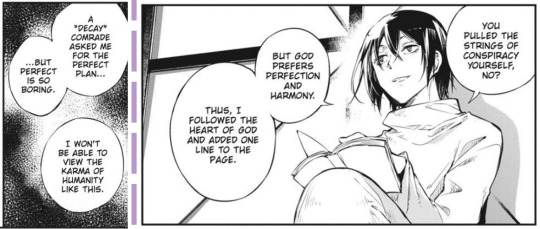
By openly giving contradictory information, to me this is exactly an occurrence of a stark divergence within Fyodor, so let us give it our complete attention in what follows. Firstly, there is the possibility that Fyodor could choose to say something intentionally if he would directly benefit from the receiver hearing those exact words, even if Fyodor’s own belief lies somewhere else entirely (so the question to that remains open: what does Fyodor truly think about perfection, imperfection and God?). Secondly, in Dead Apple, we see Fyodor and his ability merge back together, from two bodies back into one single body, and this action seems completely voluntary on their part, thus opening the possibility that Fyodor and his ability could manifest separately when they will it. This makes me wonder if each of them can take over their shared body (in turns) when they will it, so that one of the lines reflects Fyodor’s way of thinking, and the other line reflects his ability’s way of thinking, thus the two statements are made in separate frames, resulting in no contradictions being made if, and only if, Fyodor and his ability control the shared body in turns. Even so, because they coexist, the ingredients for a singularity are already there within Fyodor, given this example and the Dead Apple scene, because Fyodor and his ability each identify with a term that contradicts the other (“crime” and “punishment”), with a possible implied superiority or “victory” on his ability’s part (the “punishment” bringing the “crime” to an end, lastly “killing” it on a conceptual level, in a succession that implies a linear flow of time). It would be all the more logical, in this context, for Fyodor to desire victory over his own ability at all costs. How his goal is worded in the Dead Apple Official Guidebook, as pointed out by @aja154ever here, could also indicate a suspicious tension between Fyodor and his ability: “To create a world without Abilities is his desire, and it is a mystery if this has any connection to his Crime and Punishment Ability” (see the quote’s full paragraph on his ability in their other post here). For important references from the light novels on what singularities are, how they come into being and how they can manifest, as well as a wonderful theory on the possibility of Dazai being a singularity himself, see @beans-beneath-moonlight ‘s post here. To close this chain of ideas, indeed on the open possibility of Fyodor being a singularity too, I want to mention what @beans-beneath-moonlight observed in their post too, namely that in the BSD light novel 55 Minutes, there is also “Gab”, Jules Verne's ability that took over and killed him, continuing to live on its own as a separate being, so abilities existing separetely from their user’s bodies, as well as malicious abilities that can turn against their users, both can exist in the BSD universe. Lastly, I put just one useful, but short reference below, on a singularity’s cause and terminology:
Professor N in the BSD light novel Storm Bringer: “By causing a logical conflict with your own ability instead of with someone else’s ability, you can create a singularity,” as he said that Professor N raised his index finger and twirled it around. “That sort of ability. The German researchers who first discovered this, had named it ‘self-contradictory-ability-type’.
There is one last relevant dialogue I want to analyze here. Below are all of Fyodor’s words from his first appearance in ch12:
Official translation – Fyodor, ch12: “It’s all as I predicted. No matter what happens, we reserve the right to do as we please. Just as the hand of God and demon wills it…”
Fan translation – Fyodor, ch12: “Everything is going as expected. In any case... you are now given free reign... as indicated by the right hand of God and the demons.”
Notice how the official translation says “the hand of God and demon” (demon is singular), while the fan translation says “the (right) hand of God and the demons” (demons is plural). I asked @popopretty for their advice as to how to understand this line better and, according to them, the Japanese quote allows for the noun “demon” to be translated either way. I shall put their answer below:
@popopretty: (…) according to the Japanese version I have, the original phrase for that last sentence is “神と悪霊の右手が示しす通りに”, which directly translates to “as the right hand of God and demons show/point to”. There is no word to indicate that the word demon is singular or plural, but looking at the context, I think it is safe to assume that its plural. It says “right hand” here, which I believe because the phrase “right hand of God” is used a lot in Bible. It doesn’t make much different compared to the “hand of God” though, so I think the translation you quoted is close enough.
I agree that the chapter’s context, as well as the two coated shadows behind Fyodor, allow for an undertanding where “demons”, in plural, refers to Fyodor’s co-workers within his organization, Rats in the House of the Dead. However, since the official translation opted for “demon” in singular, I want to explore the other possibility here: what would it imply if “demon” is indeed meant to be singular here? I would connect this to what is stated to be Fyodor’s motto in the Dead Apple Official Guidebook “Mist Records”: “Follow the guidance of God’s hand”, as translated by @looking-for-stray-dogs here, or “Let the hand of God guide you”, according to the BSD wiki. It seems Fyodor’s character is connected once again to the symbol of the hand, specifically the manus Dei or dextera Dei, which, in art history, indicates divine intervention, divine approval, divine acceptance, as well as God’s – the Creator’s – omnipotence (see, for example, Acts, 7, 50: “nonne manus mea fecit haec omnia?” – “was it not my hand that created all these <things>?”). The hand of God can not only refer to God (the Father) himself, but also to God (the Son), appointing him to his right hand’s side (as prophecized), which means divinely appointing him as both his “representative” and “equal” (“sede a dextris meis donec ponam inimicos tuos scabillum pedum tuorum”, which, mot-a-mot, would go something like this: “sit to my right hand’s side until I put your enemies as the footstool of your feet”, which is Psalm 109, 1 in the Biblia Vulgata, a verse invoked by Christ himself in Matthew, 22, 44, marking a fascinating continuity between the Old and the New Testament). So, considering this information, the expression “the hand of God and demon”, referring to the subject or entity who “wills” whatever it wills, establishes not only a connection, but a shocking equality between the nouns “God” and “demon”, as the hand belongs to both of them. By definition, the two nouns cannot be synonyms, under no condition, thus the subject of the action makes no valid sense and cannot be an actual conceivable “being” without an external reader’s interpretation (like this one I am trying to unfold). Following on that, what can exist or be conceived in the human mind is someone or something whose “being” implies the contradictory yet inseparable coexistence of someone / something that possesses godly traits and someone / something that possesses demonic traits. Therefore, I interpret the expression “the hand of God and demon” as referring to Fyodor himself, or, more precisely, Fyodor’s existence, which implies him and his ability together, where one represents the “god” and the other the “demon”, although it is still unclear which is which. Given all this, I propose the theory that Fyodor is a singularity, just like Dazai (continuing in the spirit of @beans-beneath-moonlight ‘s theory post I referenced before).
Moving on from the singularity discussion, based on Dead Apple’s “I am crime. I am punishment” scene once again, one can only be certain that the link between “sin”, “ability” and “punishment” becomes even stronger, but apparently so does the link between “human” and “crime”. It is no surprise that the famous nouns of the literary work are used for this scene, nouns that can refer to both the active and the passive component of the implied action (commiting a crime vs being the victim of a crime; applying punishment vs receiving punishment). This begs the questions: would freeing the world of abilities also liberate Fyodor of his own punishment (whatever it is, if it exists at all)? does “freeing” the world of abilities even imply “killing” the gifted, and if yes, would that lead Fyodor to a final act of self-sacrifice (or, closer to the etimology of the word “sacrifice”, an act of making the offered thing sacred – himself in this scenario, together with all the gifted)? If we take into account how Fyodor concluded that he and newly “scouted” member Nathaniel Hawthrone “will cover this land in the blood of the sinners” (ch37), together with what Fyodor said as he and Karma looked at Ace’s hanged corpse (ch42, Fyodor: “Thinking is a crime. Breathing is a crime”, or, in the anime’s dub, S3ep4, “Crime starts with thought. As natural as breathing”, emphasizing the naturality of whatever Fyodor identified as humanity’s “crime”), as well as what Nathaniel chanted as he was on his assassination jobs (ch46, to Fukuzawa: “Death! Death! Death to the skill users! An eternal underground sleep with no awakening!”, as well as ch46, to Akutagawa: “Death! Death! Death to the skill users! … To revive my beloved, I must execute the contract of death”), then we have canon ground to believe the death of all gifted is necessary after all, yet Fyodor never uses such expression. It is always “freeing”, “offering the salvation of death to the evil” (note how he does not say “the gifted”), “granting the great silence”, like in how Fyodor talks to Karma in S3ep4: “All evils that plague this world will receive the mercy of death”, “I will do you the honour of granting you the great silence”, “May you be free from the shackles of your crimes, and your soul be salvaged”. This raises another problem: Fyodor himself, as he says, applies cleansing, purification, salvation, liberation, but his ability clearly refers to these acts as “punishment” instead, which is a completely different concept in a religious context as well. So far, once again, this marks a divergence between Fyodor and his ability, another clear moment when the ability seems to behave like a different entity than its user, with a different perception of what the ability itself does (one possibility being, what to Fyodor is “freeing”, to his ability is “punishment”, or that his ability’s “punishment” is a “cleansing” or “freeing” in a corrupted sense of the words). As a closing remark regarding Fyodor’s goal in general, there is still a lot of room to speculate on its true nature if we consider the possibility of Fyodor opposing not the Agency, nor the Port Mafia, but first and foremost the military and different governments who 1) already have a bloody history of using ability users in the war (as implied by Yosano’s backstory and the bits of Fukuchi’s backstory), 2) had (and might still have) special laboratories researching and even artificially creating ability users or researching ways to exploit singularities (BSD Storm Bringer), 3) may have massproduced abilities of specific destructive types, according to one war story of Fukuchi’s past merits (ch82, when we are told he led an operation to eliminate 100.000 “skill-based ‘werewolf’ test subjects”, with Teruko and Jouno visible alongside Fukuchi in the panel describing this – one hundred thousand “test subjects”! for what?), 4) was aware of or working according to an entire skill doctrine, already developed and, I assume, generally-known at the time Mori used Yosano, a mere child, as his slave to achieve his Immortal Regiment plan, meant to prove that abilities are indeed suitable for use in war (ch65). In relation to this, we could take into account the possibility of Fyodor being repulsed by Ace’s behaviour in ch42 (as suggested by certain expressions of Fyodor in the manga), given that Ace represented the perfect example of someone using other people without any consideration of the weight of their lives, their personhood and their inner world. If this is the “evil” that Fyodor wants to purge from this world, and if making abilities disappear, one way or another, would make him accomplish this “greater good” (ending the use and abuse of ability users worldwide), then we are all the more justified in weighing the morality of anyone involved in this large scheme, starting with those implied in Natsume’s Tripartite Framework, supposed to maintain peace in Yokohama (the Armed Detective Agency, the Port Mafia, and the Special Division for Special Powers together with the military police). Besides this, how he phrased his goal in ch46 draws attention to how he identifies at least two different “sins” in current mankind: 1) that they consciously ignore the fact that they are controlled, and 2) that they keep killing each other regardless of said knowledge (ch46, Fyodor: “Man is sinful and foolish. Even if they know it is all an artifice, they cannot help but kill each other. Someone must purify them for those sins”). Based on this, one can assume he wants to stop people from killing each other, by itself a noble goal, but a backstory is much needed to understand the real nature of it before applying judgement. Personally, based on the current status of the manga, I am neutral on this while keeping it in mind, because Fyodor’s higher goal is still ambiguous, and one should not sugarcoat him, nor paint him as a pure demon just yet. After all, all BSD characters are extremely nuanced, and tastefully so. If we also take into consideration his profile page from the BSD Season 3 guidebook (see @ahli-stuff ’s post here) and how he considers his strength “wishing for world happiness” and his favorite type of person “someone who loves all humanity equally”, we can further wonder if Fyodor will be revealed as a character who genuinely cares the most about all of humanity, with a love that may or may not have become dark till present time, or a love that demanded and still demands the cruelest sacrifices.
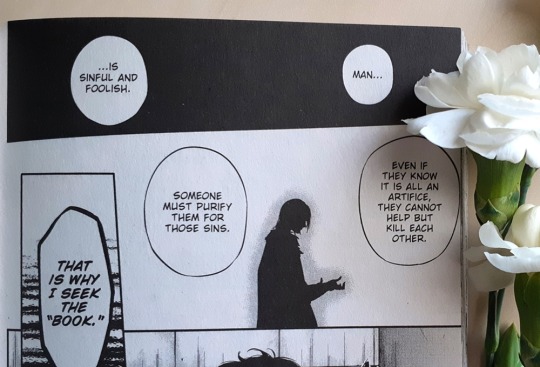
H. Soft, discreet, graceful, yet playfully dramatic. His body language in the manga, in comparison to the anime
There are many differences between the manga representation and the anime representation of Fyodor’s body language, not to mention the representation of his character overall. I suggest we treat the manga and the anime (this includes Dead Apple) separately and leave the creation of a clear list of the converging and diverging points for another potential post. I shall begin this section with the following statement, in hope of leading anime-only BSD fans to the truth: soft Fedya is real, because canon Fedya is soft. In the manga, Fyodor’s postures and gestures convey gentleness, discreetness, grace and fragility, in multiple instances I shall present below, in a random order.
MANGA. Being considerate. Speaking of discreetness and being considerate, let’s list a few examples of that. In ch42, when Fyodor’s ability activated to kill Karma, causing blood to shoot from Karma’s face, Fyodor did not look at the dying child, turning to face him only after he died, which can be interpreted as an act of respect for Karma’s intimacy during his final moments (see section B for a more in-depth analysis of Karma’s demise). Another occasion when Fyodor’s consideration was evident is in ch49 and how he took off his shoes and coat when entering Katai’s house (basic common manners, even though we must admit this is still bizzare in the context of breaking into a house to shoot someone, but read on), while the anime portrayed him fully-clothed, with his boots on (S3ep10), thus (what can I even say) disrespectful and uncaring of the cleanness of the (nonetheless wild and messy) house of his intended victim (in the end, not too surprising coming from the man who calls even his vampire slave with honorifics, “Chuuya-san”, in ch101, but also his abducted prisoner “Katsura-san” in ch47; for BSD uses of honorifics and nicknames, check this post here, but keep in mind that it covers info till ch87). His consideration of cleanness is also supported by the fact that Fyodor hid his ushanka in a clean, empty wooden box during his mission to stab Mori and infect him with Pushkin’s virus (ch46), yet the anime replaced the wooden box with a dumpster (S3ep8), setting the fandom down a cursed path of tasteless spamjokes basically.
Gentle touch of minimum intrusiveness. In the manga, the hand position when Fyodor is about to use his ability on someone also conveys gentleness and minimum intrusiveness (barely touching the forehead, using the tips of his index and middle fingers). Even the movement towards the forehead appears slow and elegant, thus even more sinister (for more on this hand gesture and its meanings, see section A). In the anime, however, this hand gesture is replaced by one that makes more physical contact with the other person, obstructing their view and breathing while being uncharacteristically intrusive: instead of Fyodor discreetly touching Karma’s forehead like in ch42, in S3ep4 Karma’s face is fully covered by Fyodor’s palm, which looks uncomfortable, unnatural and oppressive. Another revelant portrayal here, one that also conveys Fyodor’s overall gentleness in gestures, is present in ch64’s cover art: in contrast to Dazai, who holds his white pawn between his thumb and index + middle finger, Fyodor holds his black pawn between his thumb and middle + ringfinger, which, if reenacted, distinguishes itself by how Fyodor is using the least amount of pressure possible to lift the chess piece (thus very graceful), and so we have Dazai, who “takes” the piece and moves it insisting on a more secure grip, contrasting with Fyodor who “guides” the piece, letting it gently hang between his fingers as it is swayed following Fyodor’s movements.
High physical endurance. Despite his frail body, we can safely assume Fyodor has high endurance and vitality, given how he did not even flinch when Ace smashed a full wine bottle in his head (ch42) and how he let himself get captured and be kept in harsh prison conditions at least twice (ch42, ch54) before ending up in Meursault. There is also how he ran away from Mori and Elise (ch46) without gasping or showing fatigue afterwards. More canon material is still needed in order to establish how accurate or severe his self-proclaimed anemic condition is (ch42, “My body is weak and anemic”) or his low blood pressure (BSD Season 3 guidebook, but I only had access to this info via this post here and would greatly appreciate someone confirming this).
Oratory skills and expressive hand gestures. In the manga, Fyodor is always highly expressive in what regards his hand gestures during speeches, yet in a practical and elegant way, implying he has great oratory skills or training, besides excellent communication and manipulation skills (discussed in section C and pretty much all others). In ch42: Fyodor clapped as his card game with Ace ended, thus expressing joy through words and action; Fyodor pretended to be taken aback by Ace having listened to his and Karma’s talk, scratching his head in a wide-open gesture, conveying surprise and acknowledgement of Ace’s skills; Fyodor put a hand to his chest when telling Ace he has trained himself for “battles of starvation”, this gesture emphasizing the personal aspect of the information he offered, which this gesture implies is wholehearted and sincere. In ch46, while explaining his strategy and his way of thinking to Dazai, Fyodor uses various hand gestures to illustrate his phrases as well: extended arm explaining; hand pointing towards Dazai; explaining his higher goal with open palms in front of him, but close to his body, suggesting solemnity and confessed determination; sadly, all these gestures were replaced in the anime with Fyodor just holding his ushanka to his chest, conveying the same type of message as when he held his hand to his chest in front of Ace in ch42, as I described a few phrases above; still, at least in S3ep4 anime Fyodor gesticulated a lot while talking to Ace before the latter’s suicide, following ch42 pretty closely). In ch55, after entering Mushitaro’s basement prison cell, as Fyodor was revealing his intention behind freeing Mushitaro, he raised both hands to his chest, his fingers resting on each side of his heart, a gesture meant to suggest utmost sincerity. After that, still in ch55, when informing Mushitaro on the change of his condition (Mushitaro was captive, “but that ends today”, as Fyodor said), he held his right index finger to his lips, in a mischievous display of secrecy and child-like playfulness. This same gesture can have sinister undertones as well, given how it already appeared in ch47 in this way, where it is suggested, in a flashback background, that Fyodor did the same gesture when asking fake Pushkin to convey the “No changing the rules” message to the Agency, and they found this out after the death of the children. Lastly, these oratory skills can be used in playfully dramatic ways too, like in ch64, when Fyodor switched to the discourse of an overly-expressive, lively host of a (talk)show, as he suggested Dazai to participate in his “All-smiles Problem-solving Roooooundtable, hosted by yours truly, Dostoyevsky”, tilting his head further and further to his right as Dazai expressed growing confusion at first. About Fyodor tilting his head and what it means, see the paragraph below. So, all these scenes point to the fact that Fyodor gesticulates a lot, especially for emphasis and expressiveness during speeches or conversations, or for the fun of the dramatic effect.
Curiosity and tilt of the head. In conversational circumstances, we often see Fyodor tilting his head to his side. In his case, this is an expression of curiosity, in the sense of being (or wanting to appear to be) genuinely interested in the other person’s answers. Note that the simple tilt of the head to one’s side can also express endearment towards the thing one looks at (in genuine concern or admiration of something beautiful or dear, for example), but, combined with oratory skills – which Fyodor possesses as a master of communication – this can be a very effective tool that translates into non-verbal emotional manipulation. To give a few examples, Fyodor tilted his head 1) when he asked Sigma if he wished for a home (ch75), 2) when he replied to Nikolai capturing the essence of his inner conflict (ch78), 3) when greeting (and even bowing to) Mushitaro in the basement, just before offering him a deal to escape (ch55). In all these cases, the persons Fyodor was conversing with were already in a vulnerable situation (Sigma wandering in desperation, Nikolai presenting his inner struggle, Mushitaro being held captive), and thus Fyodor made sure to bind each of them to himself, planting the seeds of dependency by offering them validation and emotional response. Moreover, as a gesture of (apparent) trust, if someone tilts their head to the side, they present themselves in a vulnerable position (the neck area is open), subtly conveying the message that the other person is in a position of superiority, deepening the trap that, in Fyodor’s case, ends with the other people becoming dependent on him as the “benign” manipulator. Still, because of the display of vulnerability, the tilt of the head in itself is a gentle, humbling gesture, very fitting for Fyodor, whose character presence builds on the inexplicable tension between the terror and apprehension brought by his vast intellect and unknown powers, and the humility and gentleness of his speech and body language. The fact that, as of now, we still cannot draw a firm line and say from where to which point Fyodor’s gestures and words are genuinely benevolent or actually malevolent, so he remains beyond good and evil, and fascinatingly so, until more of his character or backstory is revealed. As a last example of Fyodor tilting not his head, but his entire body as an expression of curiosity, in ch42, finding Ace’s vault, Fyodor did exactly that and approached it together with a curious look (eyes opened wider, eyebrows raised), asking Karma something to which Fyodor already knew the answer probably anyway (“Oh, is this it? The vault where ace holds his jewels temporarily, to prevent a price collapse?”) and still Fyodor asked Karma because, I assume, having a conversation made the discovery simply more fun for the moment.
Biting his fingertips and nails. In ch42, Fyodor is seen biting his fingertips in three different panels, and yet the anime (S3ep4) never shows him doing this. Later on, we never see him biting his fingertips “on screen”, but “behind the scenes” he has been continuously doing so even up to the most recent chapter. Looking closely, you can see how his fingertips and nails are damaged and rough even at Meursault, for example, in ch95, when Fyodor is passing Dazai the salt, or in ch101, when Fyodor is inputting security codes to unlock prison doors. Of course, among other things, this habit indicates a Crime and Punishment novel reference, which should be discussed in a different post, and has in fact been discussed in nice posts by other BSD fans already. This aside, unlike his depiction in Dead Apple, manga Fyodor consistently keeps his hands ungloved.
Surprise and adrenaline rush. Other than the moments when his face shows curiosity, in the manga Fyodor’s composure appears to break rather often to express surprise, usually when 1) an brilliant move was made by an adversary team or someone else, but more recently also when 2) the enemy team made a move faster than Fyodor expected. In several of these occasions, his shock is accompanied by what seems to be delight, and I would interpret this as Fyodor enjoying the adrenaline rush of near-death situations (Nikolai’s prison game, introduced in ch95.5 / ch96, to which both Fyodor and Dazai reacted in a grimly ecstatic way) or general “end of the road” scenarios (Dazai and Fitzgerald “catching” him in ch53, although Mushitaro revealed that Fyodor’s capture was intentional in ch54: “And I… can never be forced to reveal the reason Dostoyevsky let them capture him!”). Now, for the second type of surprise, the clearest examples are Fyodor’s ch101 reactions to being cornered by Dazai and the prison room starting to get filled by heavy water. His expressions there do betray true shock, as much as his stare at the end of ch101 expresses true boiling anger and determination, but one must note that, despite letting his composure break, Fyodor may have already anticipated Dazai’s moves, and the true source of his surprise was Dazai executing said moves sooner than anticipated by Fyodor (for example, when the code input device explodes in front of Fyodor’s face, after an initial shocked expression, his eyes regain a look of steel, rationalizing “he got the circuit already”). In any case, for most insight on the whole ch101 situation and the in-context implications of this “already”, I recommend checking out @videogamelover99 ’s post here on, well, basically Dazai being too Dazai for his own good, or @vampireonastick ’s post here for more discussion on the whole ch101 situation).
ANIME. The anime went with a different characterization of Fyodor entirely so far (as of now, November 2022, the anime has 3 completed seasons, and the trailer for January 2023’s season 4 revealed enough to see the anime’s characterization for Fyodor has not changed at all). In the anime, instead of being soft and discreet, Fyodor is confident, audacious and, I would say, stereotypically evil and creepy, whereas in the manga his sinister side comes to the reader’s eyes as a result of all the subtleties his behaviour and schemes imply, as well as a result of the contrast between his gentle appearance and his unnerving actions and plans, as I already wrote above. For example, in S3ep8, anime Fyodor smirked daringly at Mori after he stabbed the Mafia boss, seemingly enjoying it, yet in the manga Fyodor kept a blank face. Since various other differences between the manga and the anime were already discussed before this point of my essay, I propose an analysis of Fyodor’s body language in Dead Apple specifically, which goes hand in hand with his portrayal in the anime, and therefore differs significantly from the soft Fyodor we get to know in the manga.
Secrecy. In Dead Apple, in the first scene that reunites Shibusawa, Dazai and Fyodor, we see Fyodor approaching their table with confident steps and hands in what appears a rather tight grip, as opposed to letting his fingers comfortably open on each side of his body. This could express repressed or hidden intentions, as his fingers, in a fist, cover his palms and do not allow a completely relaxed stance. Next, unlike Dazai, Fyodor does not cross his legs when at the table, he instead positions both his feet firmly and perpendicularly on the ground, which conveys confidence as well, and is meant to assert total control of the room. When putting his arms on the table, he intertwines his fingers and rests his chin on his joined hands. This is a meditative position, suggesting a serious thought process going on behind his puzzling smile (again, suggesting confidence), as well as careful planning, or simply waiting for things to happen as he planned beforehand. His closed eyes shut down the world outside him, we could interpret this as logical in this situation if Fyodor has already predicted and planned everything through, which the movie suggests was indeed the case. The outside world is not as necessary to see in that case, plus he is surrounded by people who will not act impuslively and threaten each other out of the blue, so a sense of blind trust stays between the three strategists. One last thing to note about this scene is the fact that only Shibusawa and Fyodor are facing each other, while Dazai is facing no one, which may subtly suggest the personal bond between Shibusawa and Fyodor, one that Dazai does not share with anyone in the room, or (arguably) anyone at all after Odasaku’s death.
Confidence. In Dead Apple, Fyodor’s pose conveys confidence when Shibusawa shows Dazai the Draconia room (Fyodor is seen with his left hand on his waist, in contrapposto); Fyodor’s pose conveys having hidden motives when he and Dazai entered the Draconia room in secret (Fyodor has his back turner to both Dazai and the viewers, with his hands in his coat’s pockets; Fyodor’s pose conveys confidence AND having hidden motives when Shibusawa surprisingly stabs Dazai, followed by Dazai asking Fyodor “Didn’t you lock the door?” (Fyodor has his hands in his pockets, but also smirks and chuckles at Dazai while looking down to him, with Fyodor’s chin slightly raised).
A playful mind. As to what regards Fyodor’s playful mind, it is made more or less evident through Fyodor’s play of words and sharp, intelligent replies (see section E for his love for entertainment specifically). In Dead Apple, as the singularity event unfolds, Fyodor told a shocked Shibusawa that he will “fill in all the blanks” for him: Fyodor added “I’ll even tell you what was cut out”, proceeding to cut Shibusawa’s throat immediately after. This is a splendid play of word and action, coordinating them in a twisted sense of playfulness, indulging michievously in living a life entertaining for himself. But seriously, for more on Fyodor and his sense of entertainment, see section E above, it would be superfluous to repeat ideas here.
– – –
11 November 2022. At last, we arrived at the end of this essay. The end for now at least, as I could technically add more analysis and external references in the future, if my irl schedule allows it. Since January 2022 I’ve been working on this “thing” I jokingly called “marriage proposal PhD”, because why not, this is an accurate example of how an ENTP proposes to an INTJ, where understanding the other (or continuously trying to) is peak intimacy and love. I guess. However, I “yeeted” my emotions out while I was writing this, because nothing would have angered me more than my appreciation of this character clouding my judgement or making me err in my pursuit of the many subtleties that lead to his many paradoxical traits. Whether I will update this post or not in the future, I cannot promise. This post is intended to be my last contribution to the BSD fandom, but my ask box remains open for futher discussions on BSD or other media analysis. I doubt fans will read everything I wrote, and I am certain the fandom will perpetuate the cycle of Fedya’s mischaracterization despite my best efforts to bring many canon scenes showing different sides of him into the spotlight.
Yes... Despite everything, I am at peace. I thought no media could revive my passion for analysis anymore, no character could make me draw fanart again, and yet... and yet!... Fedya is exactly the type of character one can analyze ad infinitum and feel thrilled at each discovery, at each little possible implication of a word or gesture. No matter how tranquil he may seem, no matter how certain we may be at first of his exterior serenity, for everything his character encapsulates, for everything we know and don’t know about him thus far, Fyodor’s soul is likely vessel to an incredible inner tension, origin of his determination. As I was writing more and more, I discovered he is intense, so truly intense, and that intensity has brought me… and brings me... and will bring me
boundless bliss.
Happy birthday, радость моя.
#bsd#bsd fyodor#bsd fyodor dostoevsky#bsd analysis#bsd meta#bungou stray dogs#bsd fyodor dostoyevsky#bungou stray dogs fyodor#bsd fyodor analysis#fyodor bsd#bungou stray dogs analysis#bsd character analysis#character analysis#analysis#unsolved and endless#beauties and gentlebeauties this is Lav's Fedya essay#please note that with a single reveal in the manga Fedya could make this entire thing come crashing down and I love this possibility#truly in-character till the end#Nov2022: my only regret is that I still had 100+ bsd analysis posts saved to read through and perhaps add more in-fandom refs to this#even when my and OP's analysis align only regarding 1 idea or 2 I find it highly valuable to cross-reference and communicate#I've seen both crueler takes and softer takes on Fedya's character - and some takes that have no solid canon ground as well#I value them all because discussion is important and it builds our minds - but mischaracterization should be recognized as such#I hope that in the future I can update this essay with more references to express my gratitude towards the analysis part of the fandom too#till then I hope the readers of this enjoyed it and know that I am open for discussion in the replies or ask box#even if it will take me a while to answer
1K notes
·
View notes
Text
why i believe the prison break storyline was also sigma's entrance exam
the long overdue post that i teased literal months before posting it (sorry i am a college student and quite overworked)
[ massive spoilers for the mersault arc of bsd, including s5e11 of the anime and recent manga chapters. ]
sigma is alive
first of all: sigma's not dead.
sigma's not dead because his character arc is nowhere near over, and from a writing perspective, it doesn't make sense to kill him without drawing that out to some kind of conclusion.
for someone who had a pretty major role in recent arcs, whose entire characterization in the story has been set up around a deep need for belonging and a "home" and people who don't want to "use" him, the plotline so far sure hasn't wrapped up his story in any satisfying way. as far as it appears right now, he just kind of... touched fyodor and died. is that really it for him?
especially after he finally starts to reject fyodor's manipulation, and finally makes choices for himself, like the choice to side with dazai?
no, i'm not convinced he's dead- bsd's very guilty of fake out deaths, and there is no reason for me to believe that sigma's actually dead when his arc is still clearly unfinished.
sigma joining the ADA makes sense
in the mersault arc, it is established that sigma wants to join the ADA. fyodor even says it point blank to him, and he doesn't deny it. he thinks about the ADA and how they're "not using dazai, and dazai isn't using them". they are a group of people who care about each other and take care of each other of their own agency, no pun intended.

as i mentioned above, sigma's entire character so far has been revolving around belonging and how he wishes to find a home. a home suited for a bizarre gifted like him with no past, who doesn't understand why he exists. in many respects, a lot of the agency members share similarities to sigma in the sense that they also didn't understand their place in the world.
atsushi's an orphan who was told he should just "die in a ditch somewhere".
dazai's an empty man who sees no purpose in existence.
ranpo was a genius surrounded by monsters, and he could never comprehend why the world was so illogical and strange.
the character whose backstory is the most similar to sigma is yosano. like sigma, she had a powerful gift. like sigma, she was used for that gift. mori took advantage of her healing to create an undead army against her will. the difference is that yosano despaired, while sigma is resentful - yosano isolated herself since there was no way for her to live without being used for her gift, while sigma is bitter regarding the unfair nature of the world that he is continually used.
in the end, yosano is found by the agency and ranpo. ranpo says this:

the ADA is a place where ability users are valued for their personhood, not their ability. for sigma and yosano, who have only ever been valued by others for their powerful abilities, the ADA is the only place they belong, the one place they can live freely as full people rather than just vessels for their abilities.
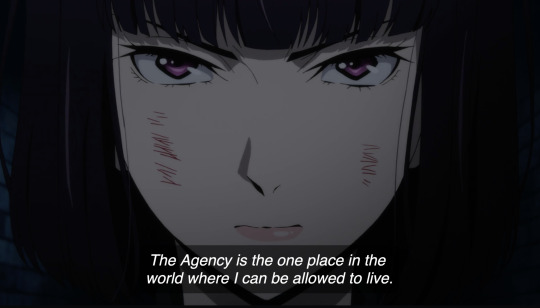
sigma wants to join. it's the perfect culmination of his arc. he'll finally have a home, a place to belong. in his first decision he makes of his own free will, he chooses to help the ADA. plus, his ability is information exchange, which couldn't be more perfect for detective work.
it ties up all the loose ends neatly.
sigma's entrance exam
so, if the title didn't make it clear, yeah. i'm pretty convinced that sigma's entrance exam was the mersault prison break. i mean, he clearly wants to join the agency, and dazai's compared him to like half of the members already.
the armed detective agency fandom wiki has some information on entrance exams. (i know, i know, not a primary source, but I don't have that much free time to go source hunting for a tumblr bsd theory...)

we also have a few example of entrance exams that we can use as a reference: namely atsushi's, kyouka's, and dazai's. from these, we can synthesize a few defining characteristics of entrance exams.

(i made a table because i'm a pretty visual person, and this is a good way for me to organize information!!! this is essentially an adapted affinity map for my fellow nerds out there)
some key elements of entrance exams administered by the ADA include:
a perceived (real or fake) threat: in atsushi's case, this was the "bomber"; in kyouka's case, the moby dick; in dazai's case, whoever was responsible for the disappearance and subsequent murder of the yokohama visitors.
the threat's victims involve civilians/innocent people: for atsushi, the terrorist had naomi as a hostage; in kyouka's case, the entirety of yokohama was in danger; in dazai's case, the kidnapping/murder victims were all civilians.
the ADA candidate MUST (is pushed/forced/pressured/required to) play a major role in the resolution of the threat: atsushi must neutralize the bomber; kyouka is the only one who can stop the moby dick; dazai plays a very large role in stopping the azure messenger.
(optional) sacrifice: atsushi jumped on a bomb; kyouka crashed her plane.
(optional) a way to ensure the candidate's safety: for atsushi, the fact that it wasn't a real bomb; for kyouka, fukuzawa's ability and demon snow.
the ADA candidate is kept in the dark: atsushi was NOT told they were completing an entrance exam, or that the ADA even had such a tradition. kyouka knew she was doing an entrance exam, but wasn't ever fully explained the stakes; i.e. nobody told her that after passing she would be able to free herself and control demon snow.
the entrance exam is administered by a more senior member: dazai or kunikida, with the approval of fukuzawa.
now consider if dazai were administering an entrance exam for sigma during the mersault prison break. let's see if the key elements are present:
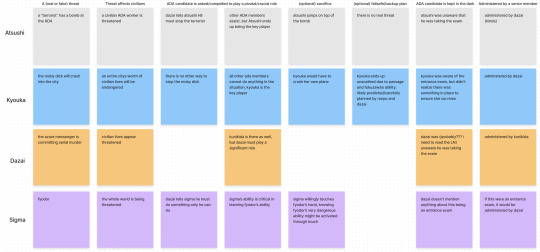
the threat: fyodor
the victims: the entire world
the candidate's pivotal role: sigma must touch fyodor to learn fyodor's ability
the sacrifice: sigma risks his life and touches fyodor, despite having been told that fyodor's ability might also work through touch, i.e. he risks dying
the failsafe: n/a, as far as we know currently (i can see an argument for chuuya but i personally find that's a bit of a stretch)
the secret: sigma has not been told that this is an entrance exam (neither has the audience)
the examinator: dazai
pretty neat. at least, no inconsistencies - and, considering the bigger picture, it makes sense.
a lot of things in the mersault arc also make sense under this interpretation. why did dazai pick sigma instead of a more "useful" escape tool? for recruitment. why did dazai promise and insist upon saving sigma? for recruitment. why did dazai shove sigma off the elevator even though he knew chuuya would break their fall and they weren't going to die? for recruitment.
it feels like a much better ending for sigma than just being... dead.
screenshot compilation

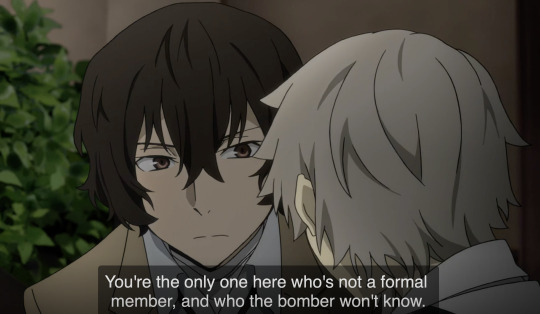

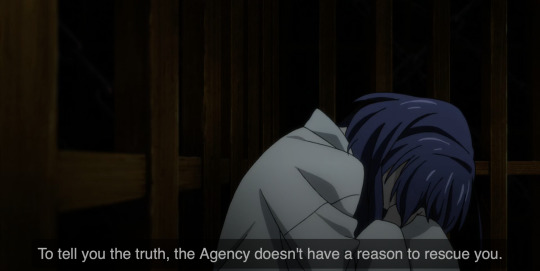
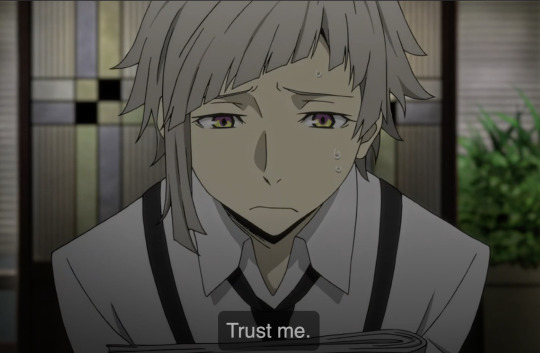
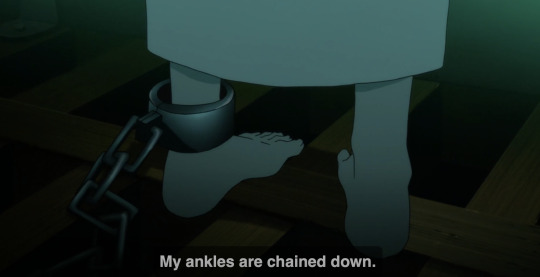
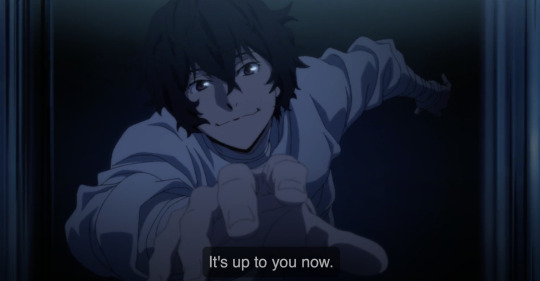
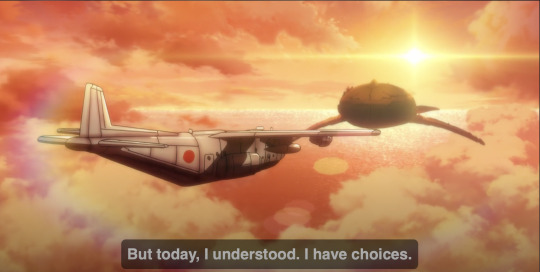


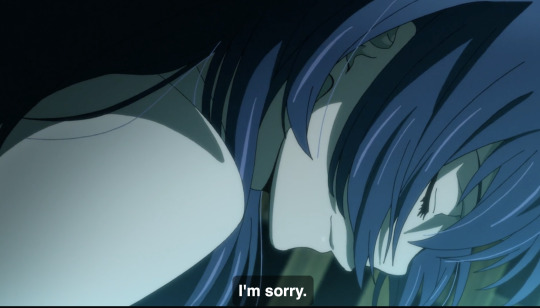
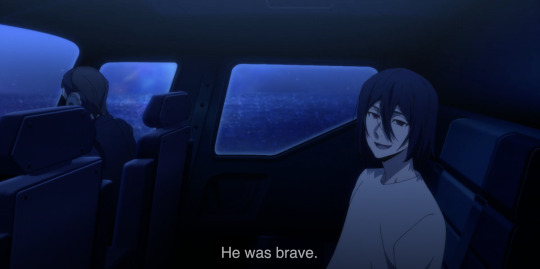
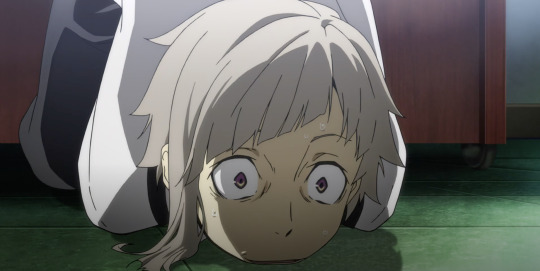


conclusion

you're so right.
#bungou stray dogs#bsd sigma#bsd#bsd theory#bungou stray dogs analysis#bungou stray dogs sigma#bsd spoilers#bsd season 5
72 notes
·
View notes
Text
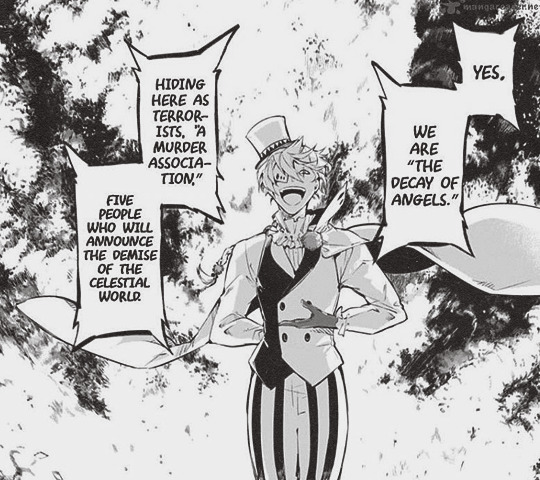
BUNGO STRAY DOGS VS LITERATURE: THE DECAY OF ANGELS
This is going to be the first in a long (long) running series where the goal is to read every single book mentioned by name in Bungo Stray Dogs, and try to connect the themes of that book to the characters who are referencing that book. In light of the recent arc I am starting out with "The Decay of Angels" the villainous organization consisting of Bram Stoker, Nikolai Goggol, Fyodor Dostoevsky, Ochi Fukuchi and Sigma.
The name Decay of Angels comes from Yukio Mishima's novel, the Decay of the Angel. The fourth and last book in his Sea of Fertility tetraology which is widely considered to be his masterpiece. I read all four books, so underneath the cut I'll elaborate on the connections between Yukio Mishima's work and Bungo Stray Dogs.
1. The Decay of the Angel
The Sea of Fertility is a tetralogy of novels written by Japanese AUuhor Yukio Mishima. The four novels are Spring Snow, Runaway Horses, the Temple of Dawn, and the Decay of Angel. The main timeline of the story stretches from 1912 to 1975, the main character of all four books is Shigekuni Honda a law student in Spring Snow, who's best friend Kiyoaki Matsugae dies at the age of twenty at the end of the first book. In each sequel, Shigekuni meet what he believes are the reincarnations of Kiyoaki, who are condemned by karma to die at an early age. Every time he attempts to save them from their deaths he fails.
The strongest connection between the Sea of Fertility itself, and the "Decay of Angels" organization depicted in Bungo Stray dogs is that both are heavily inspired by Buddhist ideology. The Sea of Fertility is an exploration of the concepts of both "reincarnation" and "karma" while the ideology of the decay of angels is to enact Karma in the real world for the past sins of the governing body.
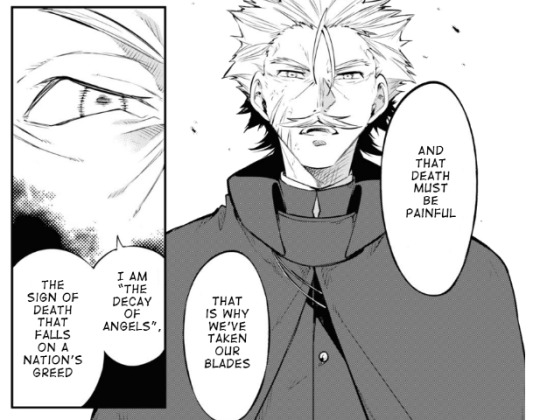
The brihadarankyaka Upanishad states: Indeed the person performing a good deed will become benevolent, and one performing a bad deed will bcome evil; one becomes pure by pure acts, and black by evil acts. Therefore it is said: a human being is composed of karma, or "desire" by following karma one creates will, by following will one creates karma, and through karma, samsara comes into existence."
The Temple of Dawn
Both the ideology of the Decay of Angels, and Yukio Mishima's work make constant references to budhism like this. Budhists conceive of the world as a suffering-laden sycle of life, death and rebirth without beginning or end known as Samsara. In essence in budhism, beings are driven from life to life in this system by karma which is activated by good or ill actions committed in this life as well as previous lives. Fukuchi's goal is more or less to make Karma real and enact it with his hand, to punish governing bodies for their past sins.
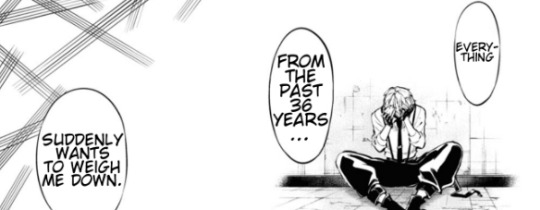
His ideals are also heavily budhist in nature, more or less budhists believe suffering in inherent to life. The goal of budhism is actually to stop being reborn and escape the cycle of death and rebirth by eventually purifying yourself of earthly desires, etc. etc. Fukuchi's goals allign with these ideas. Just like reality and earthly desires inherently cause suffering. As long as governments exists, they will continue to create war. The only way forward is to create a death and rebirth. Governments have to die, so society as a whole can be reborn into a higher, more enlightened state. He is essentially twisting lofty budhist ideals to justify his extreme political actions.

Bungo Stray dogs also borrows some symbolism from the fourth book, the Decay of the Angel. In budhist scripture Devas are mortal angels. A topic the fourth book discusses at length.
Here is the account in the twenty fourth fascicle of the Ekottara-augama: "There are thirty-three angels and one arch angel, and the signs of death in them are fivefold. Their flowered crowns wither, their robes are soiled, the hollows under their arms are fetid, the body ceases to give off light, it loses awareness of itself."
Decay of the Angel

There are five members of the decay of angels in BSD, Fukuchi, Fyodor, Goggol, Bram, and Sigma, just like the five stages of decay. Just as in budhist belief death comes for everything, even the angels, the stated goal of the organization is to bring death to the members of the world's government. Quite literally in Fukuchi's case, by controlling a vampire army (vampires being symbols of death due to being undead and bloodsuckers themselves).
2. Death and Rebirth
The main premise of the Sea of Fertility is tracking the four reincarnations of one individual. Each successive reincarnation lives a short life and dies for the sake of an ideal.
'Kiyoaki Matsugae was caught by unpredictable love, Isao Iiinuam by destiny, Ying Chan by the flesh. And you? By a baseless sense of being different, perhaps? If destiny is something that takes hold of a person and drags him after, then the other three had desinty. And has anything caught you?'
The Decay of the Angel
The whole organization of Decay of Angels, is seeking a somewhat symbolic death and rebirth of society, but at the same time as individuals four members are seeking to die for the sake of an ideal like the four lifetimes of Kiyoaki.

Gogol's may seem to be the simplest, to commit suicide in order to free himself entirely from god's will. He may be a russian character, but even some of his ideals are budhist. One of the major differences between Budhism and Hinduism as commented on in the books, is that Hinduism believes in the divine whereas in Budhism there are no gods. Not only do they reject gods, but they also reject the idea of a "soul."
"Budhism does not recognize the soul as such. If there is no core substance called soul in beings, there is of course, none in organic matter. Indeed quite like a jellfyfish devoid of bone there is no innate essence in all of creation. . If we assume there is no self, what is the basis of the birth-and-death cycle to start with?... WHen the Threavada Sautranika school evolved the concept of "seed perfurming" was established according to which the effect of a good or bad deed remains in ones consciousness, permeating it as the fragnace of perfume permeates clothes and thus forms character."
Gogol's ideal is similiar to that belief, he rejects both the idea of god, and the idea of his soul, in order to prove that all that exists of the universe is his free will and consciousness. He even goes through a metaphorical death and rebirth in order to reach that ideal, he fakes his own death, and then is revealed to be alive.
There's even a discussion of free will in several of the books, particularly the fourth.
"He should have armed them with the foreknowledge that would keep them from flinging themselves after their destinies, take awaay their wings, keep them from soaring, making them march in step with the crowd. The world does not approve of flying. Wings are dangerous weapons. They invite self-dstruction before they can be used."
Decay of the Angel
If you wanted to parallel him to one of the lifetimes, you could even say he is much like Kiyoaki, someone caught up in an unpredictable love. At one point in the story, as he's dying of sickness he continues to try to visit his lady love every day for the sake of seeing her one last time and considers facing his impending death to be a trial to prove his love. Gogol similiarly puts his closest friend through a life or death trial to see if his feelings spring forth from himself and his own free will, or are brainwashing.

"I'd tell myself in it was because I was insincere. I'd know in my heart that if only I had gotten out of the rickshaw and walked, no matter how weak I felt, then such sincerity - even if she was unaware of it - would have affected her, and she would have seen me. That's it then. There's no reason to have such regrets. I have no other choice but to risk my life, if I want to see her. To me, she's the essence of beauty. ANd it's only that which has brought me so far."
-Spring Snow
The second lifetime lived by Kyoaki is that of Inao who is a far-right extremist in Japan, who wishes to see japan return to its more imperialist ideals. As a whole these novels take place over a time frame that's post the russo-japanese wars, all the way to the lead up into world war two, and then post world war two. There are pretty obvious references to world war two (the island where Fukuchi fought on being a reference to Okinawa, Ahabaraki being a reference to the nuclear bomb). Bungo Stray Dogs also clearly takes place in a post-war society. The motivation of the current villain Fukuchi is the mistreatment of soldiers during that previous war.
Fukuchi resembles Isao, the far right extremist. In the second book there is a long recounting of the history of the Satsuma Rebellion. It was a revolt of disaffected samurai against the new imperial government, nine years into the Meiji Era. In the book it’s mentioned they prayed at a shrine a number of times, and waited to rebel until they believed the god’s themselves approved of their rebellion. The main character of the book Isao wants to enact a similar rebellion against the government to rid Japan of western influence and to make the emperor all powerful again.
The sins I refer to have nothing to do with the law. And the greatest sin is that of a man who, finding himself in a world where the sacred light of His Majesty is obscured, neverthless determines to go on living without doing anything about it. The way to purge this grave sin is to make a fiery offering with one's own hand, even if that itself is a sin, to express one's loyalty in action, and then commit seppuku immediately. With death, all is purified
Runaway Horses
The goal of the main character is to "before the sun... at the top of a cliff at sunrise, while paying reverence to the sun... while looking down upon the sparkling sea, beneath a tall, noble pine... to kill myself..." He is a man who wants to commit a sin he believes will put his country on the right track, and then die for his country. He also believes the only way forward is a military coup (guess what happens in japan in a couple of years). Fukuchi's goal may be the opposite, but he still uses the same methodology. He has seized full and total control of the world's governments acting as an ultimate emperor to achieve his goal. Everyone else is just instruments and puppets to him, he literally changes them into mindless zombies.
"Here was the power of the emperor himself. Only on this drill ground was the hand of the sun working with a mathematical clarity and precision. Only here! The will of the emperor penetrated the sweat, the blood, the very flesh of these young men, piercing their bodies like X-Rays."
Runaway Horses
Fukuchi's goal is essentially to fight imperialism by using tools of imperialism himself. He also invokes the divine when fighting against Akutagawa and Atsushi, saying he carries and enacts the divine will. He is focusing all power on himself, the same way Isao wished for the emperor to have total control and authority of the country once more to purge out western, socialist, and capitalist influence.

He also, just like Nikolai experiences a death and rebirth on the battlefield. Fukuchi was once manipulated like Isao by far-right ideals that joining the military would equate to protecting both his comrades and his countries, only to be eaten up and chewed out by the war-machine and not accomplishing protecting anyone but the governments already in place, creating the current Fukuchi.


Just like the deaths of his comrades were wasted, Isao also experiences a disapopinting suicide which is the exact opposite of what he wanted, and the ideal of dying with honor presented throughout the story. Which clearly illsutrates all the militaristic and far-right ideals Isao believed in through the story, were proven false and nil by the end.
“The sun will not rise for some time,” Isao said to himself, “and I can’t afford to wait. There is no shining disk climbing upwards. There is no noble pine to shelter me. Nor is there a sparkling sea.”
Runaway Horses
The third book features Thai Princess Ying Chan who is said to have been caught by the flesh. This will be the shortest section because the third book is very dark, but basically the third book the Temple of Dawn deals with how the elder generation of japan, preys upon and takes advantage of the youth. Ying Chan because of her youthful body, is molested by two adults who she trusts.
Sigma is someone similiar to Ying Chan, a youth who is born and then continually used by everyone around him in his life. He is the ultimate child taken advantage of by society passed over again and again due to being born from "nothing."

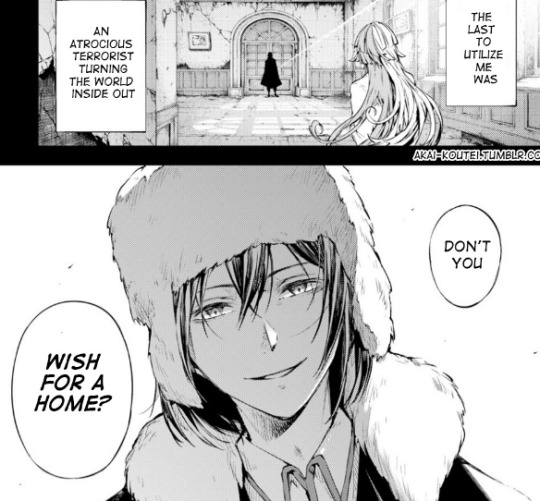
The last reincarnation depicted in the fourth book "The Decay of the Angel" deals heavily with themes of nihilism, and deeply resembles Dostoevsky. Especially if you believe Fyodor is in part an adaptation of Raskolnikov's theory that truly great people should be above morality as depicted in crime and punishment.
Toru's goal in the Decay of Angels, is to devote himself to a pure form of evil and get lost in the pursuit of it. He is depicted as a twenty year old exceptionally brilliant individual who does not form relationships, is detached from the society around them, has no strong pursuits except for this, and his highly nihilistic believes. The kind of nihilism that is portrayed for its flaws in many of Dostoevsky's works.
"My purity will presently wander beyond the horizon to that invisible realm. Probably not on the end of unbearable pain, I shall seek to become a god. The pain! I will know of it, the pain of absolute silence, a world of nothing at all. I will crouch in the corner, like a sick dog. And the happy ones will sing songs around me. There is no medicine for it. No hospital. It will be written in tiny gold letters somewhere in the history of the race: that I was evil."
Which mirrors the description of Fyodor in his introduction as something "Darker than evil, something horrifying."
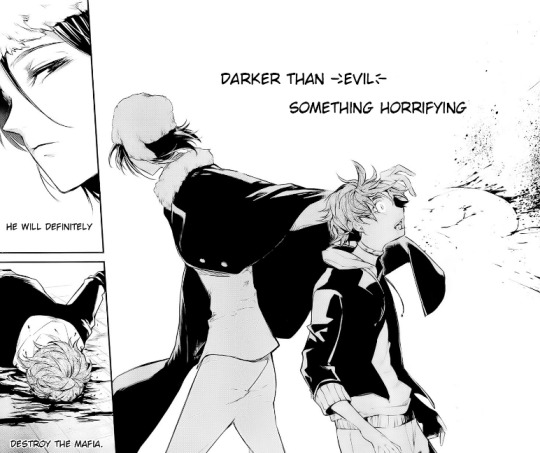
Fyodor is also someone with a large blind spot when it comes to ordinary people, this is something he is lectured on by Dazai. That he believes he has enough control like a player sitting outside of the gameboard that he can control the movment of every single piece. That the world is controlled by great people manipulating it. Whereas Dazai's beliefs are the world is controlled by everyone's actions moving together in an unpredictable fashion, rather than a god sitting outside manipulating things.

Toru receives a similar lecture because he bbelieves himself to be some kind of great man due only to his extra intelligence and how isolated he is from others.
"There is no special right to happiness and none to unhappinnes. There is no tragedy and there is no genius. Your confidence and your dreams are groundless. If there is on this earth something exceptional, special beauty or special evil, nature finds it out and uproots it. You thought didn't you, that you were a genius beyond compensation. You thought of yourself, didn't you, as a beautiful little cloud of evil floating over humanity."
The Decay of the Angel
Which seems to be the lesson that the story is going in the direction of teaching Fyodor, that there is no such thing as inherent specialness, exceptional people, gods or demons.
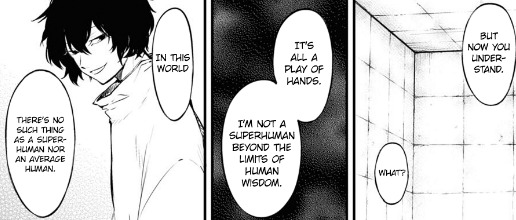
Fyodor is also someone who while he has no undergone a death himself, his goal is to deal death, which he seems to be able to do with just a touch of his hands, in order to make the world reborn into a “world without the evil of ability users”. Death, birth, and rebirth are themes that are strong with all five of these characters.
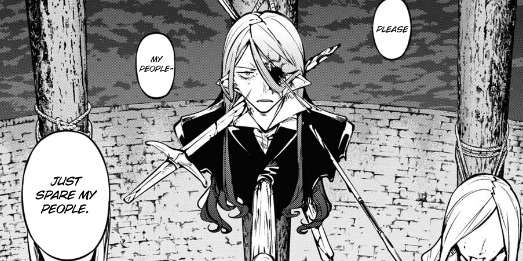
As for Bram he’s the character we know the least about, but I would say while Fyodor, Fukuchi, Gogol and Sigma can be equated to individual lifetimes of Kyoaki, Bram himself being an immortal vampire and oldest of the group is much like Honda who is an outsider and witnessing the lives of young people being reborn over and over again. Especially since by the fourth book he is eighty years old and essentially a helpless elder. The various lifetimes of Kiyoaki die young, he lives on a much emptier life than any of them. Bram’s just a head. He’s the most helpless of the whole group. He’s just a witness to all of this. But he’s also an immortal vampire, so therefore an outsider to the cycle of death and rebirth.
Well, that is all I have to say about “The Decay of the Angel” and the connection to the “Decay of Angels” depicted in Bungo Stray Dogs, and the five members who make it up. I fully reccomend picking up the book, just as Bungou Stray Dogs is shaping up to be anti-war in its text and the depiction of several successive generations (the war generation, the post war, the Sea of Fertility is a massive work referred to as “the most complete vision we have of Japan in the 20th Century” by Paul Theroux. It deals with similiar themes in BSD of the changes between generations, the shift in society of japan in the last century, the influence of imperialism. If you want to pick it up and read it, it comes highly recommended by me!
#bsd meta#bungou stray dogs meta#bungou stray dogs theory#bungou stray dogs#bungou stray dogs analysis#fyodor dostoevsky#bsd fyodor#nikolai gogol#bsd gogol#fukuchi ochi#sigma#literature analysis#the decay of angels#yukio mishima#decay of angels#doa
350 notes
·
View notes
Text
Yes bsd is a great manga and anime with thought-provoking story and great characters with philosophical senses but they aren't equal with their real life selfess. The above-mentioned writers put their thoughts into writing for years despite mental illnesses, thought floods and depressions. Some of them wanted their ideas to be remembered, some of them had something they wanted to say, some of them wrote without caring about being read, some of them addressed the world, but there was always one person that they all touched. They deserve to remembered with their ideas and ideologies or at least stories. In Japanese literature, which bsd start with, almost everyone had an anonymous pen name, and the world of japanese literature developed with sources covered up and without archives. The spread of misinformation among fans of this anime, which has very few sources compared to derivative literature and mainly features real-life Japanese authors, has to stop or literarature will be ruined. No longer human is NOT an autobiography. These authors, novelists and poets AREN'T equal with their real-life selfess. Osamu Dazai liked to give his character pieces of his personality and branch out, but that doesn't make No Longer Human an autobiography. The motivations, goals and personalities of the writers are not exactly the same. Of course, when you look deeply, the obvious connections are woven in detail, but they are not exactly the same. When I typed Nikolai Gogol into Google, bsd Nikolai came up and I realized how dire the situation was. Nikolai Gogol deserve to remember as author and with books, stories, poems he write. I mean, if you say i like Nikolai Gogol and i am a fan of Nikolai Gogol, if you don't mention the anime cheracter i want to talk with you BOTH real life author and bsd or only real life. If you mention anime so it's okay lets talk but if you don't then no, you mention real life by mention only Nikolai Gogol you can't denial this. I want to kneel at Asagiri's feet and beg to him to write on manga and anime episodes "The characters in this manga have the same names as living authors and are inspired by them, but they are fictional characters and have no direct connection to the authors." So that fanlad can start to recognize the authors as authors. Now, for Osamu Dazai and Fyodor, it is said that the character in the book creates the anime character rather than the author's selfes. I read The Flowers of Buffoonery (the first story included No Longer Human's protoganist) and I can't reject this theory with certainty. So if we know characters in anime aren't their real life selfess we also understand theories. This is important. False information about writers should not be spread, of course, this does not mean that humor should not be made or shipped, we just need to be able to distinguish the difference. Even though we say Soukoku is literally canon, we must warn those who cite Osamu Dazai's book Memories as a source.
Books and authors life CAN use for characters motivation and connection because Asagiri literally did this. Memories book ia still important for age!15 manga and story just not for soukoku
Credit: @bungoustraydogs-tr
Yes, the real Osamu Dazai was bisexual, but this has no connection to the anime. Fyodor Dostoyevsky also expressed his respect for Nikolai Gogol and quoted and praised him at every opportunity. Moreover, if the author dynamics in Russian literature are examined, it is possible that the two had a sincere conversation. (No historian has given this assurance and there is no evidence just a possibilty) Does this make Fyolai canon? Osamu Dazai imperessed by Fyodor Dostyevski. Or is Dostoyevsky a terrorist? Gogol?
....We cannot make these people, who wrote to keep their thoughts alive, appear to be someone they are not.
Imagine Osamu Dazai's situation. You are finally in peace that you never reach then you turn in to world to see peoples who look at you with no knowledge of you..
I am grateful to @bsd-bibliophile to all literature sources they archive
And if you like these NEVER stop ranting about characters, ship them and make memes. They are us, our loves and beloveds. They are bsd characters. Just stop using books as a source of ships.
What can i say bsd have a universe which ink of each letter written changes the fate of the next page. There are so much more thing to wonder
#bungou stray dogs#bungou stray dogs analysis#bsd#literature#bsd literature#japanese literature#russian literature#osamu dazai#dazai osamu#shuji tsushima#nikolai gogol#nikolai gogolbsd#bsd fyodor dostoevsky#fyodor dostoyevsky#nikolai vasilievich gogol#bsd fandom#soukoku#skk#fyolai#nakahara chuuya#rant#i becaming h.g. wells#me when i read the time machind#kafka asagiri#bsd manga#bsd anime#writers#novelists#authors
73 notes
·
View notes
Text
Fyodor Dostoyevsky and Crime and Punishment: Short Bungou Stray Dogs Analysis
Finally finished Crime and Punishment by Fyodor Dostoevsky. i might do a post talking about my actual thoughts on the book, but not right now because I'm INSTEAD gonna talk about BSD Fyodor because, if I'm gonna be honest, a large part of the reason I read this book was to see if I could get an insight on what his ability could be (obviously I also read it because I know it's an extremely influential book to the psychological thriller literature genre, and it's made me want to read more of his books because I am absolutely entranced by his writing style).
SPOILERS: This book did NOT give me a single damn clue to Fyodor's ability.
However, I do have a better understanding of why Asagiri chose to write Fyodor in that specific way, with the added effect of making Fyodor much more understandable. I have a better appreciation, I think, for Asagiri's character writing. Let me explain:
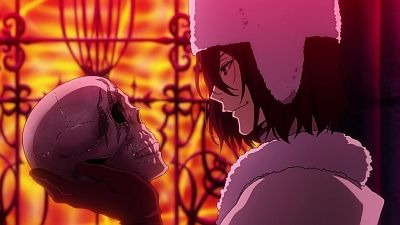
The large, overarching theme of C&P is the idea that some people are naturally born with the right to kill. That is, people are naturally born into two categories: "Ordinary" and "Extraordinary". The majority of the population falls into the former - they live their lives in submission to the law and to those above them. In essence, they do not have the "right to kill"; they are otherwise overcome with guilt, regret, or simply caught for their wrongdoings.
The latter category has very few people in it, and for a simple reason - they are the ones who are, essentially, above the law, and therefore, the lawmakers. They are the ones who lead the revolutions, sit on the throne, and most importantly, kill when they need to kill and do not hesitate to "step" over their crimes as nothing more than the necessity to power. They are not caught. In fact, they are hailed as the greatest leaders. Alexander the Great, Julius Caesar, and his most constantly referred example, Napoleon. These are the born with the "right to kill".
The main character, Raskolnikov (of whom I will be calling the affection Rodya because I am NOT spelling his name over and over again), believes himself to be a "Napolean". Rodya is the one who came up with this theory in the book, after all. However, he finds out, near the end, after several blunders and mental breaks, that he is not one of the people who can "step" over their crimes. He hesitated before killing his target. His guilt for his two murders sent him into a feverish state for days on end. He walked to the police station to confess his crimes a million times before finding some reason, right before he was meant to do it, to chicken out and continue living life under this ever-evolving notion that he was sorely mistaken about himself. Rodya is not the "Napolean" he thought he was born to be.
How does this relate to the Bungou Stray Dogs character? I believe that Fyodor is, essentially, the embodiment of the "right to kill". He is everything that Rodya thought he was, which is an excellent analysis on the part of Asagiri. One of the first things Fyodor does is kill Ace, then a relatively innocent child, Karma. He does this without blinking, without a hint of remorse, and proceeds with his day. He knows that this is his right, that he is the one above others, that he can kill and he cannot be caught for it. He claims to have mastered and tamed his own ability. Why? Because he is the "Extraordinary."
Another theme that I find quite intriguing is religion. In truth, it really isn't that prevalent (though there are a great many Biblical quotations and references throughout) until the last part, Part 6, of Crime and Punishment. Rodya has a near-constant epiphany with religious belief, even at one point stating, point-blank and in irritation, that God isn't real and He certainly isn't helping anyone in the mortal plane. He oscillates between claiming that the "Devil" forced him to kill, to saying that believers are frantic and stupid, then to kissing the dirty ground in repentance for his crimes. He state of mind ends in that repentance state, a supposed believer and eager to start his life anew.
To make Fyodor a devoted believer in God, with a set viewpoint and acting as an executor of God's will, is, once again, an excellent choice. Rodya's irritation and inner turmoil were one of the many reasons why he failed miserably in maintaining the secret of his crimes. Fyodor is none of those things: he is calm, cool, collected, and set in his ways. Interestingly, in Crime and Punishment, the vilest character also seems to have no particular issues with religion himself. And he, for the most part, gets away with his heinous crimes completely. This battle of belief, and relating it to God, provides a healthy insight to why Fyodor has obtained the "right to kill", versus Rodya, who was born "Ordinary."
The last point I want to seriously touch on is less about Crime and Punishment and more about the author himself. However, I did learn about this through reading the translator's notes (the translation I read is by Richard Pevear and Larissa Volokhonsky, Second Edition (2021), Vintage Classics). Dostoevsky was hugely indebted to Nikolai Gogol as a successor to Gogol's ingenious literary developments in "fantastical realism" and satire. Dostoevsky made several references to Gogol's works in C&P, and none in a critical manner. In the animanga, the roles are completely reversed; Nikolai is the one chasing after Fyodor, admiring his intellect and "ingenious" with the eventual goal of setting himself free. This idea of flipping authors' relationships on their heads is part of what makes Bungou Stray Dogs so entertaining to consume, and it takes a great deal of research and effort to be able to adjust these relationships so that they clearly reflect the real-life ones.
As for one afterthought, the name "Rats in the House of the Dead" appears to be a clever play on the Dostoevsky book Notes from the Dead House. I haven't read this book yet, but I want to (along with Notes from Underground). I'm curious to see if there is any further correlation, but I would assume not, considering the contents of the book.
NO. I did NOT find literally anything that could help me decipher Fyodor's ability. Rodya literally confesses his crime like a week and a half after he commits it. No character in this novel, nor theme, reflects whatever the h e double hockey sticks Fyodor has going on in BSD. I have theories, but they have literally nothing to do with Crime and Punishment outside of the base fact that his ability has something to do with killing (which we already knew). Woe is me. I'll get over it, I guess.
#this is really ironic for me to post this#because fyodor is like#my top 10 least favorite bsd characters#mori is at number one because literally who else would it be#idk where fyodor falls#maybe if he took a bath every once in a while he wouldn't be in the list at all#bsd fyodor#bungou stray dogs fyodor#bungou stray dogs#bsd#fyodor dostoyevsky bsd#fyodor dostoevsky#fyodor dostoyevsky#crime and punishment#bsd 113#bsd analysis#bungou stray dogs analysis#analysis#rant#bsd rant
32 notes
·
View notes
Text
Naomi is actually an antagonist
Most people have different theories about Naomi from BSD, so I thought I'd put my opinion in.
First off, Naomi is NOT an author like the rest of the BSD cast. Her namesake comes from Jun'ichirō Tanizaki's novel 'Naomi'. I'm going to be speculating about the connection between the novel and the BSD character, but I actually haven't read the novel myself. I'm taking my information from the summary.
The two members of the Armed Detective Agency without an author's namesake are Naomi and Haruno. (As seen down below)
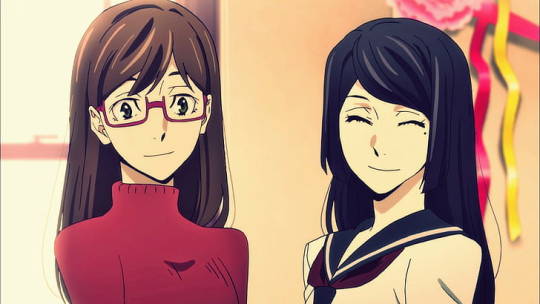
Both are characters from the novel 'Naomi'. I'm just going to be focusing on Naomi for now, as she plays a bigger role in the novel and in the BSD plot, so I have a better understanding of the character.
Anyways. Naomi and Tanizaki's relationship has never really made sense to me. Asagiri is known for humanising his characters and making sure that all of them have motives, even some antagonists. For example...
Mori, although as asshole of a character, has an overarching need for the greater good. Although he has made some pretty hurtful decisions to get there, it's with a 'good' cause in mind
Fitzgerald wanted the book to revive his daughter to try and piece back together his family by improving his sick wive's mental state
I know this doesn't really apply to Fyodor and Fukuchi, but I have no doubt that by the end of the arc, their actions will have some sort of reasoning to them.
So WHY did he write Naomi and Tanizaki into some sort of seemingly incestuous relationship? Either or both of the scenarios below could explain their actions:
They're faking their romantic intentions
They're fake siblings
It still doesn't answer the question of what their relationship adds to the plot. It could be written with the intention of humour in the end, but Asagiri has stated in an interview that he's a fan of Chekhov’s Gun (the principle that all elements of a story are essential), which means he most likely wrote their relationship with a specific intention.

If Naomi holds a similar characterisation to the novel she is from, then her relationship with Tanizaki might not be as caring as it is made out to be.
In the novel, the character Naomi is actually the antagonist. The protagonist is an older man who becomes obsessed with Naomi and her Westernised personality. (Note: the book is set in post ww2 when America took part in the colonisation of Japan and thus became a large part of the culture there.)
The protagonist, a salaryman named Jōji, plans to gradually groom 15-year-old Naomi when they meet at a cafe. Her true nature is revealed to be incredibly manipulative. She eventually reverses the power imbalance and Jōji ends up completely submitting to her every whim.
This makes me question her role in the plot of BSD. Especially now that we actually haven't seen her in a long time (the entire Decay of Angels arc). Most BSD characters are based on the protagonists of their novels (Oba Yozo and Dazai), if not the author themselves.
Naomi being represented by the Antagonist makes me wonder if she is in fact a threat to Tanizaki. I would say that she is an ability, but Dazai has touched her before, so it's been confirmed she isn't. Could she be made by the book? Is she controlling Tanizaki, a mastermind in disguise? I think there must be more to her character than we see, or else Asagiri wouldn't have written her in.
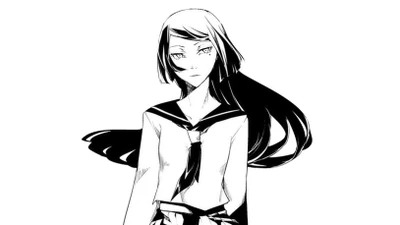
she looks kind of sinister in the manga yknowww...
#naomi tanizaki#naomi bsd#bsd analysis#bungou stray dogs analysis#bsd theories#bsd#bungou stray dogs#tanizaki naomi#tanizaki junichirou
102 notes
·
View notes
Text
- Theory on Dazai's family -
- Why I think that Dazai is closely related to the former boss of the Port Mafia - A BSD analysis based on facts from the main manga series, the light novel "Bungo Stray Dogs: Dazai, Chuuya Age Fifteen" and the manga "Bungo Stray Dogs: Dazai, Chuuya Age Fifteen" -
Contains heavy spoilers for Dazai's backstory, the Dazai, Chuuya Age Fifteen manga and the Age Fifteen light novel
TWs: Dazai typical mentions of sewerslide, mentioned abuse, picture which shows a scene in a hospital explicitly
English isn't my first language so I apologize for any grammar mistakes.
Not completely proof read by now since I realized that I have a lot of homework while proof reading and panicked. Will be proof read in the next 24h.
---------------------------------------------------
Okay so I had this theory since I read the age 15 novel last year but I've never got around writing it down since some pieces were still missing.
In the following I will first talk about Dazai's relationship with Mori and showing parts of the age 15 novel to proof why they very popular theory that Mori is Dazai's father/a relative cannot be true. Afterwards I will talk about my theory that Dazai was already in Mafia, way before he met Mori before I will talk about my theory about why I think that Dazai is closely related to the former boss of the port mafia is either Dazai's father or a close relative like a grandfather or uncle and gonna show supporting proof from the BSD light novel "Dazai and Chuuya age 15", the BSD age 15 manga and the main BSD manga series.
1. Why Mori cannot be Dazai's father or a relative
Mori being Dazai's father or being directly related to him is a very popular opinion in the BSD fandom and which is very popular especially under anime onlys or new fans. To be honest, I had this theory too when I first started watching BSD but by now I am completely sure that this cannot be true.
Direct proof for this can be found in the BSD light novel "Dazai and Chuuya age 15" which reveals a lot about Dazai's and Chuuya's past in the Port Mafia as well as about some characters in general.
In this light novel it gets clear that Mori and Dazai are still pretty much strangers which are connected through the murder of the former boss of the Port Mafia. This also gets specifically stated in said novel on page 8 and page 7.
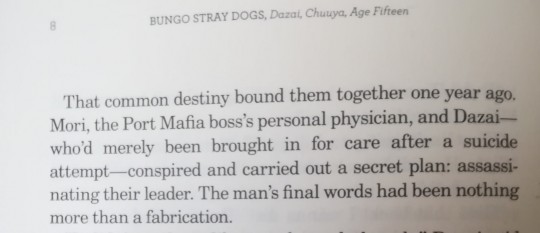
As stated here, they've been brought together by common destiny.
On page 7 however, is a even better proof that they aren't related at all and it also gives out another very interesting information about Dazai's family.
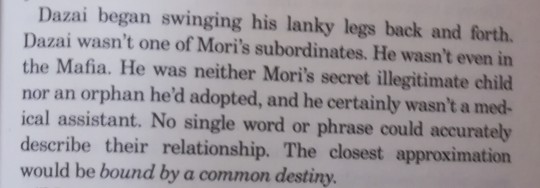
As stated here, on page seven, Dazai is "neither Mori's secret illegitimate child nor an orphan he adopted [...] ". I think that with this information, we can be pretty sure that Dazai isn't related to Mori at all. It also gets stated again that they are bound together by "common destiny" instead of any kind of relation.
Very interesting is, that it gets mentioned that Dazai isn't an orphan which Mori adopted since this information can be read in two ways. One option is, that he simply isn't adopted by Mori while the second option is, that he isn't an orphan at all. (English isn't my first language so I don't know if it can be read in only one way so feel free to correct me.)
The last proof for that Mori and Dazai aren't related to each other, can be found on page 9.

The whole page makes clear, that Mori doesn't really know Dazai at all/ that he only knows him for only one year and that he only knows him on a "Coworker level". He isn't familiar with Dazai's way of thinking, speaking and acting. He simply cannot figure Dazai out and he is kind of scared of him. Dazai isn't someone he knows since a long time. If anything, he is still trying to get to know Dazai and his ways of thinking. If Mori knew Dazai since a very long time, I'm sure that he would know at least a bit about how Dazai acts and reacts to things so that he wouldn't get as uneasy as on this text page, when Dazai is showing his serious, cold and calculating side again.
This is only a speculation though since Dazai and his ways of acting and thinking are in fact nearly completely impossible to figure out for nearly everyone.
Besides this, there is a clear distance between them without any familiarity. This distance can be often found between strangers who know each other solely through working together for whatever reason, but who never hang out together in the way friends or relatives do, which creates this distance between them.
Now that I've shown some proof which supports the theory, that Dazai isn't related to Mori in any way, I'm firstly going to show proof for why I think that Dazai was already in the Mafia, way before he met Mori before I will talk about why I think that Dazai is specifically related to the former boss of the Port Mafia.
2. Why Dazai had to be in the Mafia, way before he met Mori
Now, about why Dazai had to be in the Mafia way before he met Mori.
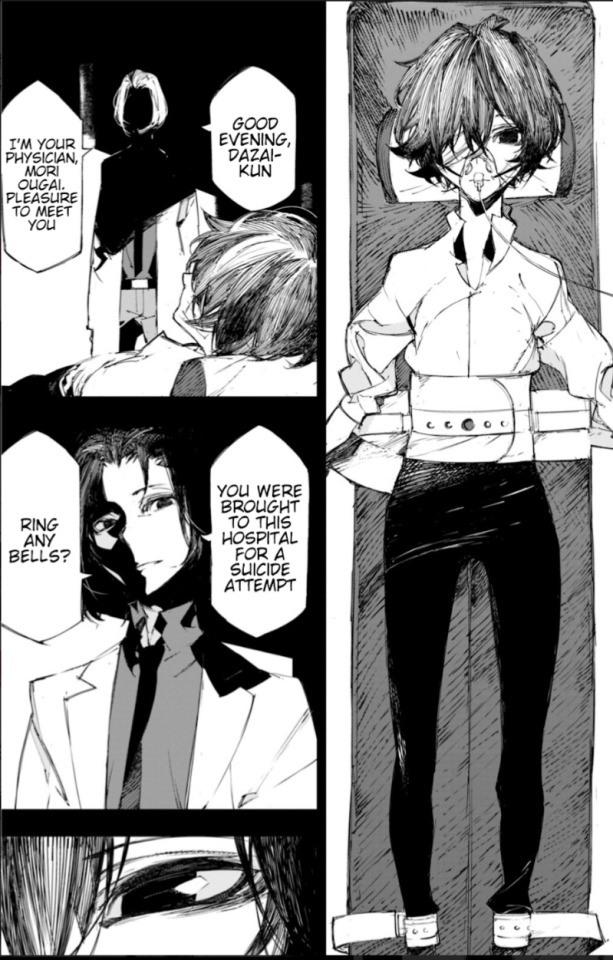
As seen in one of those panels of the first phase of the age 15 manga, Dazai is dressed on somewhat formal attire, wearing a white button up shirt and dress pants. Those clothes suit him perfectly and they look rather formal and expensive so it's unlikely that they were given to him after he got brought to the hospital. Those are his own clothes.
Now, if he would be an orphan who lived on the streets, which is another popular theroy in the fandom, he wouldn't be wearing such clothes.
Also such black and white, formal clothes/suits are commonly worn in the port mafia, often by people of a higher rank or by guards which suggests that there is some kind of a dress code among the Port Mafia. The clothes which Dazai is wearing, suit perfectly into the dress code of the port mafia.
Another point as to why he had to be in the Mafia already is the fact that he was brought to Mori, an shady underground doctor and the personal physician of the former boss of the port mafia after attempting suicide. If he would have been a normal child, no matter if orphan or not, he would have been brought to a normal official hospital in Yokohama and not to Mori.
Besides this, Mori is well aware who Dazai is, calling him by his name which suggests that Dazai isn't only already in the port mafia but also that he is known there and not just another nameless assistant.
Of course, Mori could have been informed about who this kid is by the person who brought him to him but if Dazai would really have been a random kid who wasn't involved in the Mafia, they wouldn't have any information about his name.
All of these points like the expensive and formal clothing, the fact that he seems to be involved with the Mafia already, the fact that he was brought to the underground doctor Mori (who is also the personal physician of the former boss of the port mafia) and the fact that Mori knows who Dazai is, lead me to the next point which is why I believe that Dazai is closely related to the former boss of the port mafia.
3. Why I think that Dazai is closely related to the former boss of the Port Mafia
Firstly, all the previously mentioned facts like the expensive clothes and all, are things which support my theroy in some ways but of course they aren't enough proof since alone from those facts alone, we could also think that Dazai is simply related to a executive or someone in the Mafia who has a higher rank but there are things which lead me to think that Dazai is related to the former boss of the port mafia.
Let me show you.
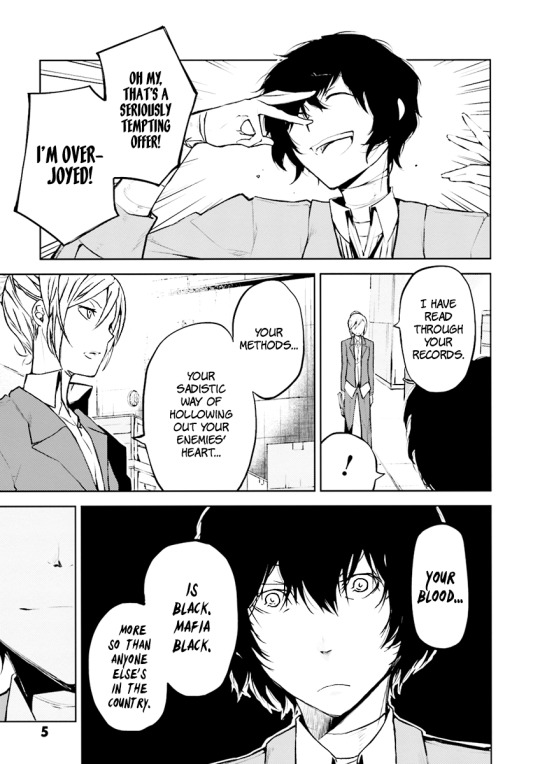
First of all, Higuchi telling Dazai that Dazai's blood is not only "Mafia black" but also that it's more Mafia black than anyone else's in the country.
While this could also be seen as her referring to him being the feared demon prodigy, it also suggests that he is deeply connected with the port mafia. Also, talking about a connection to something through someone's blood gets often used to hint that someone is connected with something through family.
With saying that his blood is more black than anyone else's, she also says that he is deeper connected with the Mafia than Mori, Hirotsu, Chuuya or any of the other loyal members of the Mafia and besides this, she also tells him through this, that he would be more cruel than any of them.
Now the only other person about who they talk like this and who gets referred to be more cruel and deeply involved with the port mafia, who is basically anchored in the history of the port mafia, is the former boss of the port mafia himself.
Higuchi saying that his blood is mafia black, more than anyone's in the whole county, could easily be a hint that Dazai is in fact, related in some way to the only other person who's blood is mafia black, the former boss.
While this point is more based on speculation, the next point is based a lot more on the things which are actually specifically shown in the manga.
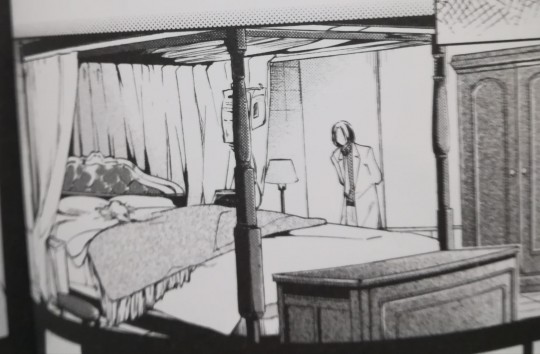
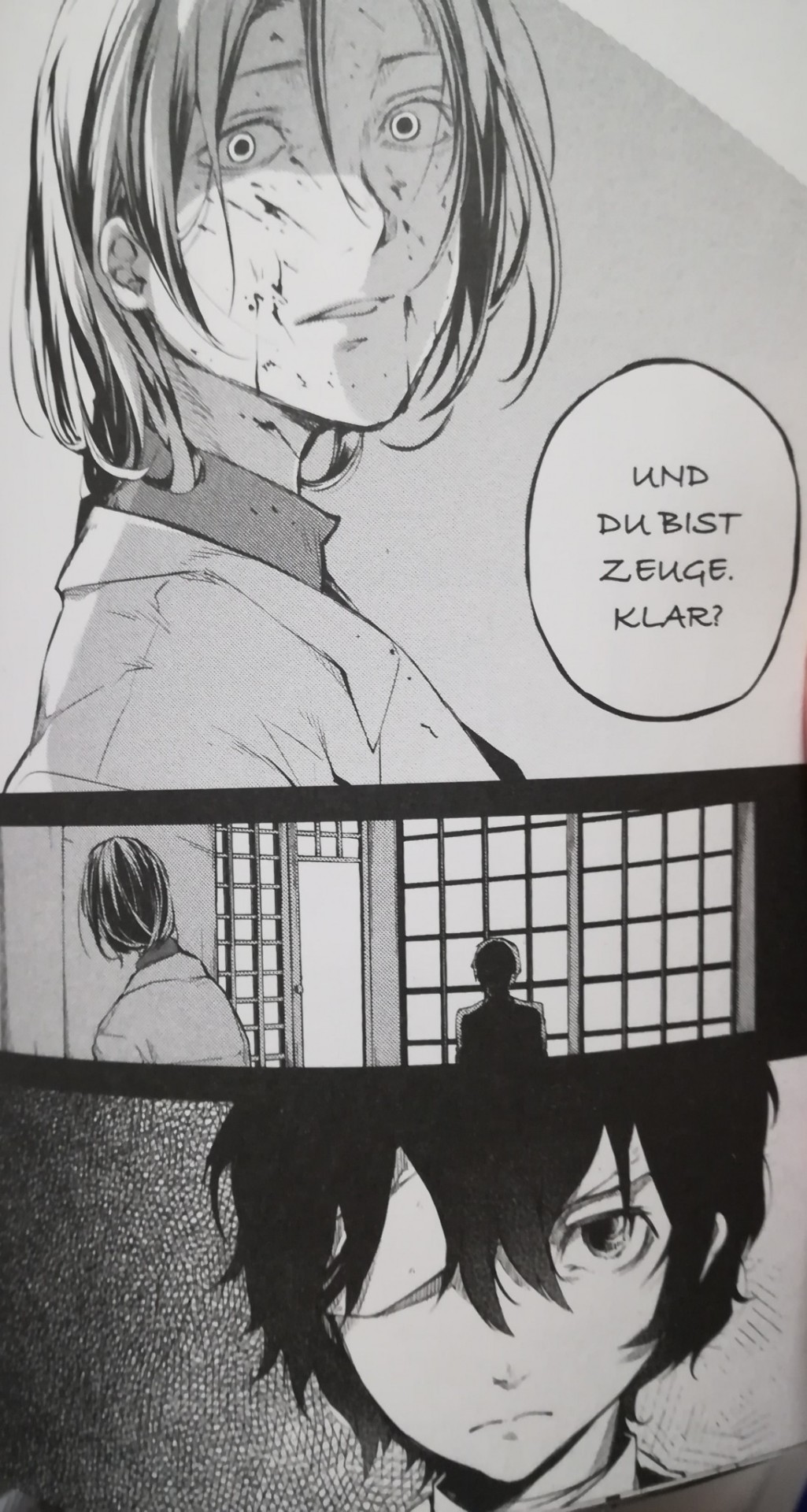
During the flashback which shows how the former boss of the port mafia died, we can see that Dazai isn't standing next to Mori but far away from the bed next to the big window.
If Mori wanted to make Dazai pretend that he would be his new assistant, Dazai would stand next to the bed or would stand at least close to Mori to "watch and learn", to assist him or to hand him any tools or medicine he might need but this isn't the case. He is standing far away from Mori and the bed, silently watching and not assisting at all. He isn't holding any tools and he also obviously isn't looking for anything which he needs to bring Mori. Here he has the role of a bystander and is the witness.
But why would Mori bring a random child with him, only to watch him and which would later be his witness. It would make no sense and it would make him seem even more suspicious. Even if he would have waited with the murder, bringing Dazai with him a couple of times before killing the boss, it would make him look suspicious. After all, suddenly bringing a child with him which then suddenly happens to be the only witness, really is suspicious and I doubt that Mori would have made such a risky and unwell calculated plan.
If that would be the case he also could have picked any child or like any person in the Mafia. After all, there are a lot of people who wanted to see the former boss of the port mafia dead because of his brutal and cruel way of leading the Mafia and because of all the terrible crimes but again.
However, despite the large amount of people who would (most likely) happily assist Mori with getting rid of the former boss, he directly approached Dazai and he does so confidently as shown here:
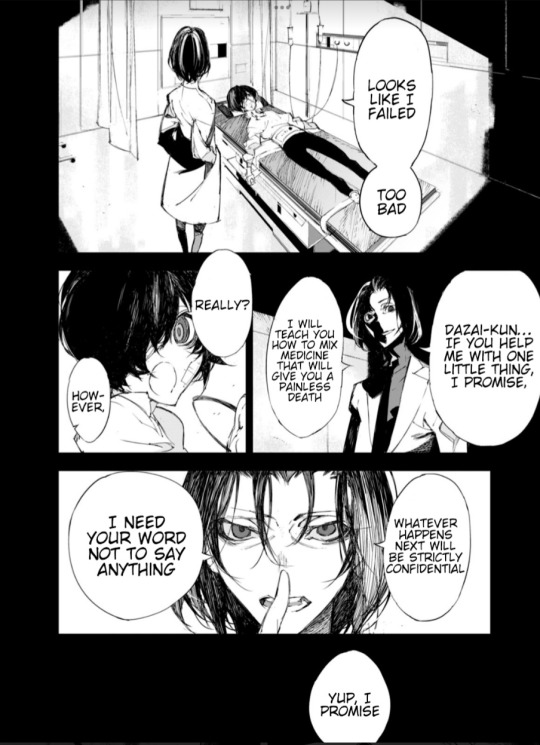
He seems like he knew exactly that Dazai wouldn't deny his request and he also seems as if he had picked Dazai to be his perfect assistant for this case but I genuinely don't think, that it's only because Dazai is a suicide patient.
In both, the manga and the light novel, Dazai tells Mori that of course the latter would see him as the perfect assistant because he would need to get rid of everyone who was aware of what really happened during that night and since nobody would suspect a thing if Dazai would suddenly commit suicide under unknown circumstances but while this is a good point, more on the other hand states in the light novel that he can't let him die because then the supporters of the previous boss would turn on Mori and claim that he would have killed the predecessor but I will come back to that in a second.
As previously mentioned, I don't think that Dazai being suicidial was the point which made Mori choose him as his assistant. After all, it wouldn't make anything less suspicious due to the reasons I mentioned previously.
So why did he pick Dazai if suddenly bringing a person with him, shortly before murdering the predecessor would only raise suspicions?
Well it would only raise suspicions if the person wasn't already in the room before he came to visit the boss and if they weren't in this room already since quite some time.
This is one of my main points to support the theroy and it also suits to the fact that Mori wouldn't risk seeming any more suspicious throughout bringing a random person with him and it also suits to the fact that Dazai is standing far away from the bed, obviously not pretending to be a new assistant of Mori.
Dazai stands far away from the bed, like someone who was in the room already, way before the doctor came in and he steps away from the bed to give room for the doctor so that he can do his work properly. It is a common thing to do for relatives, friends or coworkers who had been staying at the bedside of the bedridden person.
Now why would Dazai be in this room, staying with the pervious boss of the port mafia as the only person.
He is too young to be a guard and he can't be a person who was carrying out missions for the previous boss since Mori is in fact the person who gives Dazai his first mission ever which is to investigate about the rumors of the previous boss of the port mafia coming back as a ghost. It can be seen on this page of the manga where Mori specifically states that this is Dazai's first job as a official member of the Mafia.
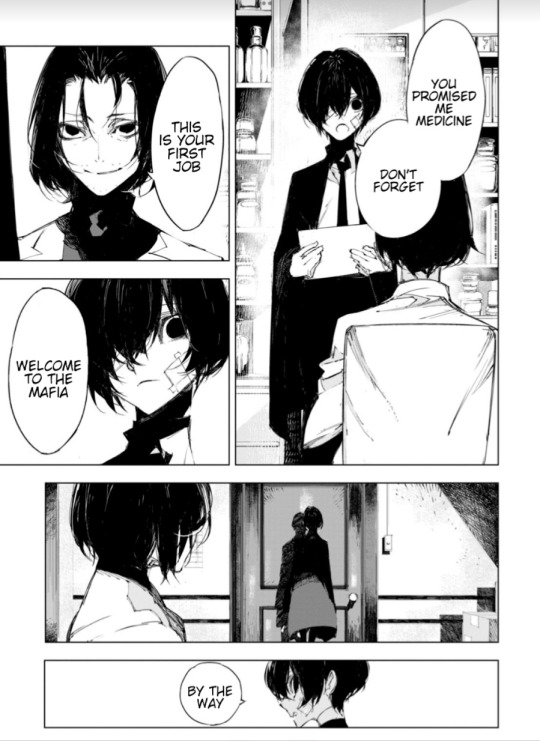
So if Dazai can't be a guard, isn't pretending to be Mori's assistant, if it's too suspicious if Mori would bring a random person with him shortly before carrying out his plan and if Dazai can't be someone who carries out missions, and especially if he isn't an official working member of the Mafia until that very moment in which Mori gives him his first mission and welcomes him as an official member of the Mafia, which, by the way, takes place around one whole year after Mori killed the predecessor, why should Dazai be staying in that room since quite some time, by the bedside of the former boss of the port mafia?
The only logical reason for this would be that he is in fact related to the boss of the port mafia in some way and due to this, stays by the side of his relative to help him in his weak, dying and bedridden state. There wouldn't be any other reason for him to keep Dazai around and if there would be, all the other points like Dazai being dressed formal and expensively and Mori knowing who Dazai is wouldn't suit into the whole situation anyways.
If Dazai only would serve as some kind of a servant, he would be someone unknown in the Mafia and they probably wouldn't have brought him to Mori after his attempt.
My last proof which supports my theroy is Dazai's reaction to having to face the former boss of the port mafia again during the fight against Arthur Rimbaud/Randou but also the bosses reaction to facing Dazai again.
On page 95 in the light novel, Dazai and Chuuya face the former boss for the first time in the whole novel and both, the reaction of Dazai and if the both is very interesting and supports my theroy a lot.
Chuuya who was never directly involved with the port mafia and the former boss and only knows about his crimes /was indirectly another victim of one of his crimes, hasn't a very specific reaction towards facing the boss and the boss also only sees him as someone he has attack without any personal connection between them.
Dazai however reacts not only chaught off guard like Chuuya upon seeing the dead body of the former boss of the port mafia standing in front of them, talking and moving but during the whole fight he doesn't say as much as he usually would and is more confused, tensed up and seemingly very uncomfortable and nervous. He does try to cover it up with sarcastic remarks and through smiling but it is very noticeable in the way he acts and talks.
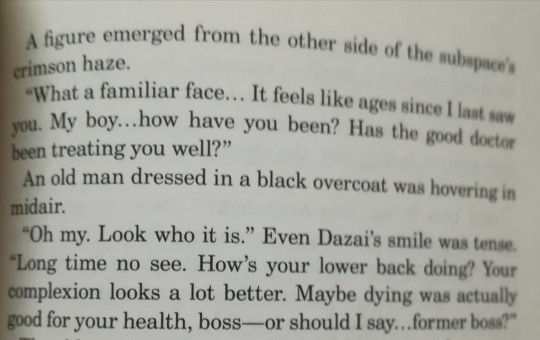
Upon seeing the port mafia boss, Dazai's smile becomes tense and he seems uneasy and he continues to act like this even after knowing that it's only Arthur's ability. It can't be only because he is worried about the boss telling others what really happened since they are currently in Arthur's hyperspace and the boss isn't going anywhere. The whole situation of having to see and having to talk to this person again seems to make him feel uneasy and uncomfortable which makes him turn more quiet, confused and more serious during the whole battle. It actually takes some time until he acts more relaxed and calculating like he usually does during a fight and until he stops bombarding Arthur with questions.
The former boss of the port mafia on the other hand, (and this is an incredibly interesting and overlooked part), calls Dazai "My boy" upon seeing him again, asks him Mori/ "The good doctor" has been treating him well and refrers to Dazai's face as a familiar face before he calls him my boy upon fully recognizing him. He also tells Dazai that it feel like ages since he last say him which implies that they saw each other and knew each other regularly. Him calling him my boy definitely supports that Dazai is related to him and I think it's self explanatory why. If Dazai was only some coworker, he wouldn't be referring to him as my boy.
The way Dazai talks to him also seems like he isn't talking to someone he only vaguely knows.
The distance which is present when he is communicating with Mori isn't present here and the whole way he talks to him and how he is building the sentences but also how the former boss of the port mafia is referring to him as well as how he talks to Dazai, is making clear that they know each other past the level of only coworkers as well as that they aren't just boss and normal subordinate.
The fact that Dazai refers to him as boss, the fact that Dazai assists Mori's with his plan, the way they talk to each other or better the way in which Dazai talks to the predecessor and that the fact the former boss of the port mafia isn't having any issues with killing/attempting to kill Dazai and even shows some kind of enthusiasm towards it, talking about it in a way which is implying that he already hated Dazai way before Dazai assisted Mori ("[...] I never imagined a day would come where I could behead this boy with my own two hands", the previous Mafia boss crowed hoarsely." (p.98;ll.26-28;" Bungo Stray Dogs: Dazai, Chuuya, Age Fifteen") shows the nature of the relationship between those two.
Most likely, the predecessor wasn't treating Dazai good, most likely abusing him which lead Dazai to assisting Mori and which would explain the way they talk to each other as well as Dazai's negative and almost scared reaction upon seeing the previous boss again.
Given the predecessors cruel, cold and brutal personality as well as his obsession with surpressing and killing people/people who acted against the Mafia, it isn't unlikely that he was also abusive towards Dazai.
Another quote which implies that they know each other since quite some time, can be found on page 98 in the light novel where the boss is "mourning" about the fact that his body isn't capable anymore of talking about the past before he kills Dazai. ("" If only we could chat about old times first, [...] "" (P. 98; ll.28-29)
The fact that Arthur also states that he preserved the former bosses personality and memories (P. 99; l.1) proofs that the memories of the boss as well as the way he acts isn't altered at all.
With all of these facts which suggest that Dazai is related to the former boss of the Port Mafia, it also makes sense why Mori needs Dazai to stay alive. Not only it would seem suspicious if Dazai suddenly dies, even if he would die of suicide but also because then, if Dazai would truly be related to the former boss of the Port Mafia, it would seem like Mori got rid of the person who rightfully is the next boss of the Port Mafia in order to be completely sure that he can be the next boss until he dies.
If we see it like this, it would also make even more sense as to why Mori was so scared that Dazai would kill him one day, just like how he killed the former boss in order to become the next leader of the Port Mafia because then he wouldn't just be afraid because of the "Evil expects evil from others" rule, but also because he and Dazai would both be painfully aware of the fact that Dazai is rightfully the next Boss of the Port Mafia and not Mori.
To summarize, Dazai cannot be related to Mori at all. Not only is this specifically stated in the light novel "Bungo Stray Dogs: Dazai, Chuuya, Age Fifteen" but the fact that Mori is still trying to figure out Dazai, that he isn't familiar with Dazai's way of acting and thinking and the fact that there is a constant, somewhat formal distance between them suggests that they genuinely didn't know each other before Mori asked Dazai to be his assistant/witness in his plan to murder the former boss of the port mafia.
Now despite not being related to Mori in any way, Dazai still seems to be involved with the Port Mafia already, way before he met Mori. Proof for that can mainly be found in the BSD Dazai, Chuuya, Age Fifteen manga.
There, Dazai is shown to wear formal and expensive looking clothes when he wakes up after another suicide attempt and Mori greets Dazai with his name, seemingly being well aware of who Dazai is. If Dazai would have been a random kid p.ex. from the streets, he wouldn't be wearing such clothes and Mori wouldn't know his name but he also wouldn't have been brought to the underground doctor Mori who also happens to be the personal physician of the former boss of the port mafia but to a normal and official hospital in Yokohama.
Alone due to the fact that he got brought to Mori, he had to be involved with the port mafia already otherwise he wouldn't had end up in that hospital. Now, him being well dressed, Mori knowing his name and him being brought to Mori instead of to an official hospital could also imply that he is only the son of an executive or another person in the Mafia who is of high rank but the fact that Higuchi tells Dazai years later that his blood is mafia black, more than anyone else's in the country as well as the fact that Mori chooses him to assist him in his plan of murdering the former boss of the port mafia as well as Dazai's position in the bosses room while Mori carries out his plan and his role in this plan imply that he isn't just related to a random person but rather the former boss of the port mafia himself.
Mori could have chosen anyone to be his witness, especially in regards of how many people want to see the former boss dead but he directly approaches Dazai and does so confidently as shown in the age fifteen manga. He seems to be sure that Dazai would assist him but he also seems to be sure that this won't raise any more suspicious.
If he would have started to bring a random person with him to his regular visits to the former boss, shortly before he murders him and the fact that this random person is suddenly his only witness would raise only more suspicious about him killing the boss and given Mori's character, I doubt that he would plan something so risky and uncalculated where it's sure that it would cause him more trouble than anything.
So why did he choose a seemingly random kid as his witness if suddenly bringing a person with him would only raise suspicions in the end? Because there won't be any more suspicious than there are already if the person is located in the former bosses room anyways and regularly.
The theroy that Dazai stays at the room of the former boss gets supported by the fact that Mori is specifically choosing him, seemingly being sure that this won't raise suspicions and the fact that Dazai isn't staying close to the bed or at least next to Mori while he is "treating" the former boss, not pretending to be Mori's assistant. Dazai is standing far away from Mori and the bed as a silent witness next to the window. Stepping away from the bed so that the doctor can treat the person is a common thing to do for relatives, friends or coworkers who had been staying at the bedside of the bedridden person. If Dazai would have pretended to be Mori's assistant he would be staying close to Mori, only stepping away from the bed to get something which Mori needs but this isn't the case. Also the suspicions didn't raise because of Dazai and everything went as Mori planned which is supporting the theory that Dazai was already regularly in the room.
Now why would the port mafia boss keep a child around in his room/at his bedside. Dazai is too young to be a guard, he isn't a official member of the Mafia who carries out missions since it is shown in the manga that Mori is in fact the person who gives Dazai his first mission ever and who is welcoming him as an member of the Mafia after giving him the mission, implying that Dazai wasn't an official member of the Mafia until that very moment which took place around one year after Mori successfully carried his plan out and if Dazai would have only acted as some kind of servant, he wouldn't have been dressed this well, Mori most likely wouldn't have known who Dazai is and he most likely wouldn't have been brought to Mori after his attempt. We can see how the most servants/slaves are treated in the chapter with Ace in the main manga and since the previous boss was even more cruel and brutal than Ace, he wouldn't have treated his servants any better. Given those circumstances, the only logical reason for him keeping Dazai around in his room, is that Dazai is in fact related to him in some way and is now staying at his bedside in order to help him in his weak, dying and bedridden state.
That they know each other past the levels of only boss and subordinate/ coworkers gets shown in the fight against Arthur Rimbaud/Randou where the former boss calls Dazai "My boy" and mourns about the fact that they cannot talk about the old times before he kills Dazai. They also talk to each other in a way which suggests that they know each other since a long time in a relative kind of way.
While Chuuya reacts chaught off guard towards seeing the previous boss as well but while he reacts in a way which makes clear that they never knew each other personally, Dazai tenses up and is nervous and feels uneasy through the whole fight upon having to face the boss again. It takes him a while until he acts more collected, serious and calculating like he usually does in a fight again but the uneasyness never fades fully, no matter how much he tries to cover it up.
The way they talk to each other also implies a deep rooted hate from both sides. The former boss also shows no issues with killing Dazai, implies that he already hated Dazai way before he assisted Mori and even shows some kind of enthusiasm towards killing the child.
In general, given the former bosses cruel, cold and brutal personality and given the way they interact with each other/react towards having to face each other again, it is likely that the former boss was abusive towards Dazai/that the nature of thier relationship was abusive.
During the whole fight, both talk with each other in way which suggests that they know each other personally since quite some time and the formal distance which is always present when Dazai and Mori communicate with each other isnt present between them during thier conversations, making it seem even more like they are related in some way.
All these facts, from the former boss referring to Dazai as "My boy" to Dazai's position in the room and his role in Mori's plan, lead me to think that Dazai is in fact closely related to the former boss of the port mafia. I consciously decided not to refer to the former boss as Dazai's father since I wouldn't go as far as to pinpoint the exact relation but I am almost completely sure he is closely related to him and I think it's likely that he is at least his grandfather or his uncle.
If you read all of this, I love you <3
#I had this theroy since months#My first analysis#I reached the picture limit so I had to quote the last two parts from the novel#Dazai is closely related to the former boss of the port Mafia and nothing can change my opinion unless Asagiri himself releases#This is also me proving that I do in fact understand the characters and engage a lot with diffrent bsd content despite positing a ooc hc#I wrote this instead of doing homework#Help#At least this was a good practice for my English lessons#bsd#bungo stray dogs#bungou gay dogs#bungou stray dogs#bsd analysis#bungou stray dogs analysis#bsd dazai#bsd dazai osamu#bsd osamu dazai#bsd mori#bsd mori ougai#bsd ougai mori#bsd chuuya#bsd chuuya nakahara#bsd nakahara chuuya#bsd arthur#bsd arthur rimbaud#bsd randou#bsd manga#bsd light novel#bsd age 15#bungoustraydogsmanga
170 notes
·
View notes
Text
Just rewatched The Dead Apple and noticed something about Fyodors ability.
Every other ability that doesn't have a manifestation and is brought to life by the fog follows these 2 rules.
They form a copy of their wielder with a blank face with glowing eye's, and they have their Gem weak spot on their foreheads.

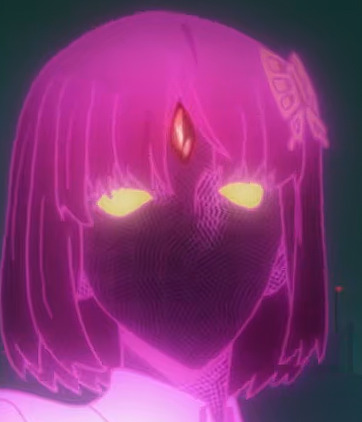


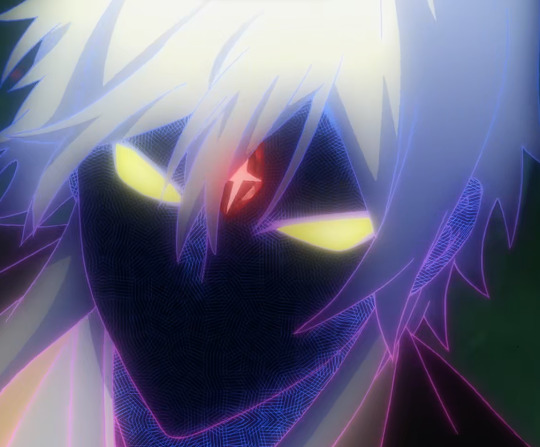
The only abilities that don't follow these rules are ones that have a manifestation and even then the humanoid ones still keep the gem on their forehead.



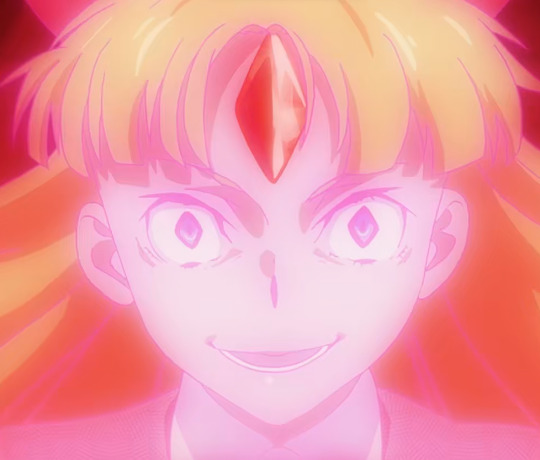
But then theres Fyodor, his ability not only manifests in a different outfit, but with a fully detailed face.
And his gem is on his hand, which is completely different to every other ability.
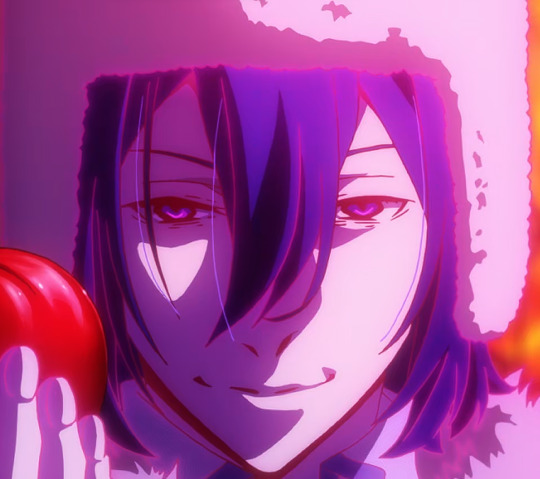

So Fyodors ability has not only completely ignored the drive to kill its wielder, but also does not manifest like any other, It breaks all three rules of the fog. The only other abilities to have faces are Elise and the Tiger, both of which have physical forms with faces outside of the fog. does this mean that Fyodors ability can actually manifest as a physical person outside the fog too? is that how he's communicating with the outside world from the prison? it opens up so many questions.
But there is one other ability that also breaks all three of these rules; Atsushi's
The tiger has its gem on the back of its neck, it also has a full face and at one point it attacks rashomon instead of Atsushi which is the only other time an ability deviates from attacking its user.
We know Fyodor was the one who told Shibusawa about Atsushi, and that he somehow knew his ability was special even before it had manifested. there is some connection between them that hasn't yet been explored and I'm really excited to see where it goes.
BSD is one show where details like this are rarely just coincidences, and considering how much mystery there is around Fyodors ability I'm sure that there is way more going on then it would first seem.
Analysing this gave me a new theory about Fyodors ability but I'll put that in a separate post, for now please tag me if this post inspired any new theories for you, I'd love to here them
#bsd#bsd fyodor#fyodor dostoyevsky bsd#fyodor#fyodor dostoevsky#the dead apple#bungo stray dogs#bungou stray dogs#bsd dead apple#dead apple#bungou stray dogs character analysis#analysis#bungou stray dogs analysis#bsd analysis#bsd abilities#bungou stray dogs abilities
2K notes
·
View notes
Text
Bsd Quick Analysis: Dazai and Fyodor as narrative Foils
Spoilers: light novels and movie
---
Spark notes version: While Fyodor and Dazai are fairly similar, they also hold a great deal of differences.
Dazai and Fyodor share characteristic similarities and respective roles within their organizations, they have a certain form of control over everything that happens.

I just wanted to point out all the visually symmetrical shots the anime uses with these two.
Something that strikes me though is the way they keep this control. Fyodor holds control tightly, directing each and every action of those that serve him. His lackeys rely on him to make decisions too the point even he complains about his subordinates lack of initiative. On the other hand, Dazai holds the reins of control loosely, extremely so when compared to his Russian counterpart. He directs with near suggestion. He, dare I say, trusts that his chosen individuals to do what he predicts. Which I think there in lies the key difference between Dazai and Fyodor's forms of control. Fyodor moves his 'pieces' while Dazai predicts his 'players' movements. Dazai has the mind of a in the field battle strategist (quite literally what he was raised and trained to do), he can predict who needs to be when and where for the right outcome. Fyodor is more akin to a particularly intelligent war leader. A strategic genius yes, but one that relies on his people to follow his orders directly. Furthermore, he's offensive, while Dazai is defensive. Acts so his opponent must react.
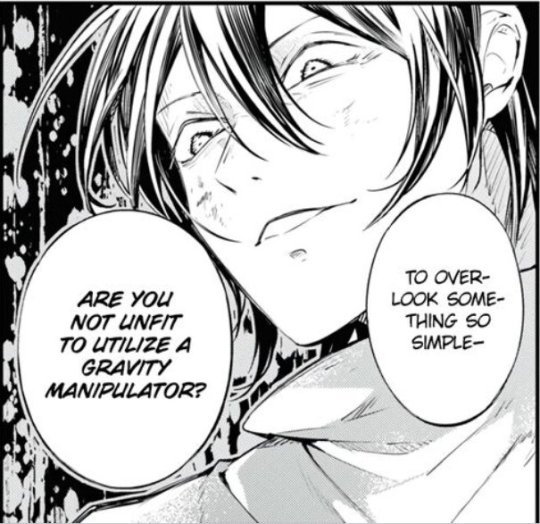
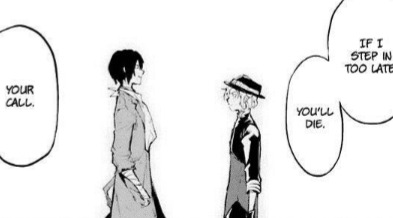
A nod at the different ways Fyodor and Dazai see other people. Fyodor seeing a tool and Dazai never forcing his hand.
They're both geniuses. No matter how one looks at it, they are both in possesion of severe intelligence. Interesting enough, it seems to affect them differently though. Simply put, while his genius gives Fyodor a god complex that makes him feel above other people, that same sort of genius makes Dazai feel separated from other people. Dazai is fully aware that he is just a person, a smart one, but just a person like everyone else. Maybe inhuman, maybe empty, maybe unable to ever feel whole, but no more a person than everyone else. Fyodor sees himself as basically just below god and above everyone else, thats he's superhuman and has special rights because of this.
Fyodor and Dazai move the pieces of their game uniquely. Fyodor in such a way its clear he holds no care for other people, views them (as I said above) as less than him due to their lack of (in his eyes) intelligence. In contrast to this, Dazai actually seems to care (granted in a backwards way) about his 'pawns'. Dazai values people. Maybe not all people, but he does value them. He listens to them, respects their insight and knowledge. Even admires them for their world views, despite not understanding them.
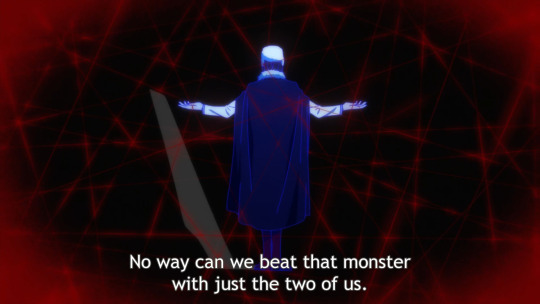
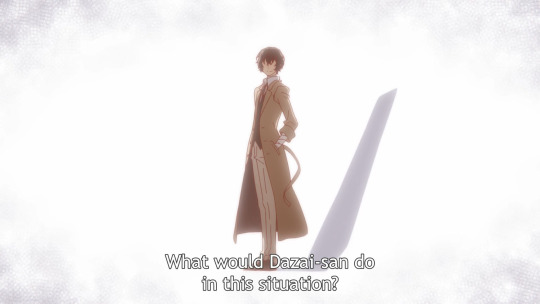
Interesting contrast exhibited here. Understandably, it's through the eyes of Atsushi (unreliable source for this analysis) but still interesting how of them are depicted.
I've heard before that Fyodor is Dazai without the restraint, and while this feels true, I'd argue it's not quite right. It boils down to motive. Fyodor's self professed motive is getting rid of abilities, Dazai's is fulfilling a dying friend's wish to do good.
Fyodor is Dazai loaded with a complex and harmful intent, dazai without the lack of ambition and numbness. Both of them two different sides of amoral, but Dazai is a vessel of circumstance while Fyodor is a creator and manipulator of circumstance.
---
Extra: Working of the assumption that Fyodor's ability doesn't work on fellow ability users (and the fact Dazai's works only on ability users for obvious reasons) one can play around with a few concepts. Note one such concept; Fyodor's ability, again working with the earlier assumption, destroys a person while Dazai's 'destroys' the ability. This would make for a very powerful foil.
#quick analysis#bsd analysis#my stuff#screaming into the void#and the void screams back#bsd#bungou stray dogs#bungou gay dogs#bsd dazai#dazai osamu#bsd fyodor dostoevsky#bsd fyodor#fyodor dostoevsky#fyodor#bsd headcanon#bsd headcanons#bungou stray dogs analysis#jester thinks#bsd meta
265 notes
·
View notes
Text
Random thought I had while in class today:
What if Tecchou is Fukuchi’s downfall? It’s kind of a random thing and I don’t have much evidence but I was thinking about all the hype around Tecchou being the strongest Hunting Dog and thought “Yo what if Tecchou figures out about Fukuchi being the leader of the DoA and also almost killing Jouno and they duke it out” because it would be the strongest Hunting Dog versus the leader of the Decay of Angels and yaknow the Hunting Dogs are supposed to fight terrorists so
#I cant put it into words very well#but I hope this happens#the Suegiku shipper in me also wants to see Tecchou take revenge for Jouno#suegiku#hunting dogs bsd#bsd tecchou#bsd fukuchi#bungo stray dogs spoilers#bungo stray dogs manga#bungou stray dogs#bungou stray dogs analysis#bungou stray dogs spoilers#bsd spoilers#bungo stray dogs theory#bungo stray dogs fukuchi#bsd season four#bsd season 4#bsd s4#bsd theory#bsd
179 notes
·
View notes
Text
"Certainly Humans are Sinfully Stupid, but What's wrong with that?"
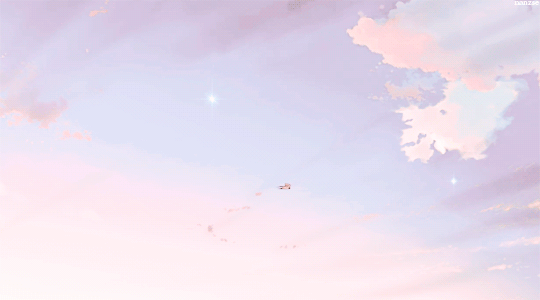

Summary: I will be dividing this essay into two main parts to address what Dazai had said in this panel to Dazai-sensei's writing. Then, in one short part I will attempt to connect some of what I had said back to BSD Dazai as a theory.
A/N: Basically take it as me rambling about my favorite bsd dazai panel and some of my personal take on dazai works which escalated and turned out much longer than I originally imagined... (by that I mean this became 6k+ words) Also just my contribution to Dazai's birthday <3 Also note that use of Chinese is present in this, since it’s much easier to find translated works of Dazai in this language, but if I do quote it, I will attempt to translate it
Warnings: Mentions of suicide, (if you're uncomfortable with it) religious wording, spoilers to some of Dazai's stories (works discussed [in relatively more detail]: No Longer Human, Otogizoshi, Blue Bamboo, Thinking of Zenzo, 正義與微笑, 思考的蘆葦)

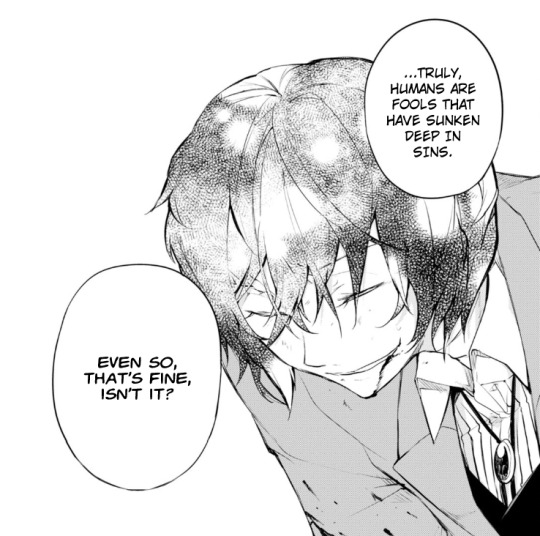
1. Dazai about Human Weakness
2. Realization of “Sin”
3. “But what’s wrong with that”?
4. Brief Thoughts on BSD Dazai vs Dazai-sensei
5. Final Notes
6. Citations
This is probably my favourite Dazai panel out of all the manga panels of him there is. From his expression to his words, there's just so much to say about this panel. Yes, it always comes back to this panel with me, and I just incorporated it in my last analysis as well. But what I have more to speak on is how I personally see it connected to my view on Dazai-sensei's works that I have as of now.
So, I will be dividing this essay into two main parts to address what Dazai had said in this panel to Dazai-sensei's writing. In the first part, I shall address how it connects to my understanding of Dazai's works. Firstly by looking at the "sinful and foolish" part of Dazai's dialogue to Dazai-sensei's views on human weakness. Then, I will further elaborate on the choice of word "sin" which is present in both translations of this panel that I have seen. Finally, I shall address the latter part of Dazai's statement, a seeming acceptance of human weaknesses to Dazai-sensei's acceptance of humans in their paradoxical natures, especially in his middle-period works. Then, in one final part, I will attempt to connect some of what I had said back to BSD Dazai (though I would say this is more of a theory than an analysis).
In addition to Dazai's works, I will also be referring to some academic research in this for the sake of some sort of objectivity and aid, since I am not Japanese, no scholar of Dazai nor Japanese literature, my knowledge can only reach so far (even more so when I am reading translated versions and the fact that I do not know Japanese literary traditions), I am merely someone interested in Dazai’s works… I must also acknowledge that there are some biases on my side since this contains some of my personal interpretation of Dazai's works alongside my limitations since, I have also read a limited amount of Dazai’s works, so take it with a grain of salt, but I wanted to write down my thoughts. As for my Chinese literature/philosophy analysis I have embedded in a minor part, (source?) you can trust me (but as a Chinese person and having studied it as a local I can say with some sort of confidence that I know what I'm talking about).
1. Dazai about Human Weaknesses
“The weak fear happiness itself. They can harm themselves on cotton wool. Sometimes they are wounded even by happiness.” - No Longer Human[1]
Just as Dazai in this panel addresses the sinfulness and foolishness of humans. Human weakness and the human struggle in life are recurring themes quite often observed in Dazai's writing. In fact, when reading about Dazai in Chinese, I have sometimes come across his work being described as "the weak's literature" and even "the friend of the weak"[2]. In fact, at the end of Dazai’s short story Canis Familiaris he wrote about this directly, saying "the artist is the friend to the weak, that is his first motivation and ultimate goal".
In fact, readers of No Longer Human alone can sense this. Such as from Yozo's acute awareness of how humans behave, with their deceptiveness making it so he is unable to take their words at face value, to within Yozo himself, in that he sees himself as too cowardly, and weak to even reject other people, and even in the acute sensitivity readers see in Yozo which he fails to acknowledge that can be seen in how he equates his father's neutral expressions and lack of words as strong disapproval. I personally see Dazai to also be a quite sensitive person, if you read some of his open letters or just think about how he can acknowledge the things Yozo views in humans in the book.
In other works Dazai has written, human weakness is a concurrent theme. Such as in Run Melos! (a rewrite from an ancient Greek myth) Dazai mainly changed the main character's thoughts, such as considering betrayal and the guilt that follows, and how both Melos and Selinuntius both succumbed to it to some degree. Or how in his novel 《正義與微笑》 (From Chinese would be translated as Justice and Smile, I hadn’t found a translation of it in English;;), with the novel speaking about a teenager and his aspirations, observations and insights as he is growing up, how he is often met with disillusionment from everywhere from high school to university, in people and even in the path to his dream job. And multiple times throughout the book he succumbs to weakness as he thinks about giving up again and again on his current goals and dreams.
Perhaps, something quite fascinating which I have read in the essay Dazai's Women: Dazai Osamu and his Female Narrators, it is because Dazai is known for holding human weaknesses at high esteem, though, at first to the reader, they are seemingly portraying weakness in a bad light, in reality, he often uses such human weaknesses to humanize his characters[3]. This is most obviously portrayed, again, in No Longer Human, in which Yozo throughout the whole book sees and portrays himself as inhuman and utterly disqualified to be a human being. The title, however, is ironic as when readers look deeper into Yozo’s narration, they will be able to see that he is very often tripped up by his own very human weaknesses, even some of which are seen as terrible by societal standards, they are what make him nothing but human, some may perhaps even begin to describe Yozo as the most human person in the novel, or perhaps even too human.
Therefore, in fact, even though on the surface it may seem that such is portrayed in a bad light, the same essay says "according to Ueda: “in [Dazai’s] view, an evil person is a man who has no understanding of, and therefore no sympathy for, human weakness" [3]. From what little amount I could access to Ueda’s book, he also said that “Dazai discovered that ‘human reality was ultimately filthy and ugly’ and maintained that ‘literature should not concern itself wholly with the fact’ but with a deeper truth, namely the beauty of man’s basic human weakness”[4].
This may perhaps have something to do with the fact that "Dazai" saw himself as a weak person[5], in fact, he kind of admitted to it in his book Otogizoshi, where he wrote that “while I presume to understand to some extent the psychology of the weak, perhaps because I’m a helpless sort myself, I’m afraid I don’t really have a clear understanding of the psychology of the powerful—particularly the absolutely invincible variety, which I’ve never met or even known to exist”[6]. Though this is debatable since according to the book Dazai Osamu, it writes Dazai likes potraying himself as a failure. If you think about it the fact that he is willing to cut so deep to look into human existence shows a slightly different perspective, there seems to be some sort of bravery and strength necessary to it. So simultaneously when reading how Dazai often describes himself or the narrator as weak, this is something we must keep in mind, also to keep in mind some sort of objectivity despite the use of personal modes in Dazai’s works.
And perhaps this influenced why Dazai saw human weakness as not only an essential human trait but also something to be proud of, and something in which one could find beauty[7].
2. Realization of "Sin"
“The Bible says, "he who is forgiven little, loves little." Do you know what this means? Only those who are confident that they have made no mistakes in life are heartless. Those who are sinful have deep affection.” - Dried Leaves of Spring[8]
So how does Dazai find beauty in human nature and its weaknesses?
Before I address this, I must first acknowledge why the choice of the word “sins” or “sinfully” (depending on the translation) in this panel is important. Not only is it because it is (sort of) mentioned in No Longer Human in the synonyms and antonyms game Yozo played:
I said, feigning tranquillity, "Crime. What's the antonym of crime? This is a hard one."
"The law, of course," Horiki answered flatly. I looked at his face again. Caught in the flashing red light of a neon sign on a nearby building, Horiki's face had the somber dignity of the relentless prosecutor. I felt shaken to the core.
"Crime belongs in a different category."[9] - No Longer Human
Though in Donald Keene’s translation (which is the translation that is most commonly seen), it is translated as “crime” perhaps since Yozo references Dostoyevsky’s Crime and Punishment. Interestingly enough in Chinese and Japanese, Crime and Punishment are written as 罪與罰 and 罪と罰 respectively, and from my knowledge in Chinese, with 罪 meaning both crime and sin. For further proof of this, in the article A Religion of Humanity: A Study of Osamu Dazai’s No Longer Human, Hijiya also changed the translation of “crime” to “sin”, and in their notes, they acknowledged that they “[had] taken the liberty of changing certain terms and phrases in order to bring out the fuller meaning of the original”[10].
Along with that, it should also be understood that Dazai had read the Bible, he even referenced it across some of his works which I have read such as in sections of 《思考的蘆葦》, 《正義與微笑》 which has moments with the main character speaking of the Bible with his brother and even in Fallen Flowers, in which he parallels himself to Thomas’ doubt on Christ’s resurrection as well as the quote I have selected above. However, Dazai was not a Christian, but he read it thoroughly and tried to interpret the Bible according to his own terms, and it is suspected that Dazai “sensed some kind of dark side in humans that can be identified with the Christian notion of sin”, the essay I read suggests if not the Christian notion of sin, it is perhaps similar to a sense of human frailty that is deep within every person[11][12]. So though when referring to "sin" on Dazai's side isn't really religiously connected necessarily, but it's difficult to think of a word to replace it, so I will add quotations, also this wording will benefit the understanding of a latter part.
With this understanding, we can now return to Dazai and human weaknesses to address the quote at the beginning of this section in which Dazai sees people who are “sinful have deep affection”[13]. This, however, does not directly mean that those who have committed many crimes have deep affection, rather it is “those who sin and have a deep realization of their sinfulness become modest, kind, and deeply affectionate people”[14]. This is fitting for "Dazai" whose unwavering conviction in writing literature was “remorse, confession and reflection”[15]:
「您到底——」客人似乎也對我的優柔寡斷生氣了,換個語氣說,「對於寫小說抱持甚麼樣的信念?比方說,人道主義,或是愛啦,社會正義啦,美啦,那些東西,打從您步入文壇,直到現在,乃至將來,可有這樣一個始終堅定不移的信念?」
「有的。是悔恨。」這次,我終於可以不假思索立刻回答。「沒有悔恨的文學,只不過是狗屁。悔恨、告白、反省,近代文學——不,近代精神想必就是從那之中誕生的。因此——」我又結巴了。- 海鷗 from 《思考的蘆葦》(A short story I enjoyed but hadn't seen in English as well)[16]
Translation by me (with possible errors):
"You—" the guest also seemed to be angry at my fickleness, and said in a different tone, "what convictions do you hold about writing fiction? Humanism, for example, or love, social justice, beauty, that stuff. Since the time you entered the literary world, until now, and even in the future, can you have such an unwavering conviction?"
"Yes. It's remorse." This time, I could finally answer immediately without hesitating. "Literature without remorse is just bullshit. Remorse, confession, reflection, modern literature—no, the modern spirit must have been born out of that. So—" I stuttered again.
I think it's also really interesting that in The Setting Sun, Dazai also wrote “'I wonder if there is anyone that is not depraved’ Naoji wrote in his notebook... Perhaps by depravity he actually meant tenderness”, which also fits this idea.
And, therefore, it is perhaps this deep realization of “sin” that Dazai harboured that allowed an establishment of a sort of kindness in his work[17]. So, below, through No Longer Human, and Thinking of Zenzo, I will attempt to establish how in Dazai’s work we can showcase the connection between the realization of “sin” and affection.
Beginning with No Longer Human, Dazai conveys this through Yozo’s fragilely sensitive nature, though on one hand causes him to see the dark side of human nature, and on the other allows for him to be sympathetic towards those in sorrow and pain:
“People talk of “social outcasts.” The words apparently denote the miserable losers of the world, the vicious ones, but I feel as though I have been a “social outcast” from the moment I was born. If ever I meet someone society has designated as an outcast, I invariably feel affection for him, an emotion which carries me away in melting tenderness.” - No Longer Human[18]
Additionally, from an interpretation I quite like from The Religion of Humanity, Yozo’s invention of clowning can also be interpreted as an establishment between the realization of “sin” and affection. Because as Hijiyam mentioned, just as clowning serves as a means for Yozo to protect himself, it is also “a positive means for him to demonstrate his compassion and understanding”[19], to identify with people despite his dread of them as his “last quest at love [he] was to direct at human beings”[20]. Though by doing so, he only further recognizes his “sinfulness” in his deceit, which alienates him, it is what ultimately allowed him to identify with the outcasts in the first place. I think it's also fascinating that in his novel 《正義與微笑》the main character's main belief he constructed from the beginning of the novel was 「以微笑行正義」 (tr. to practice justice through a smile), and so by becoming an actor at the end of the novel, which is an extension of this belief, it conveys a sense of "love", as described in the translator's note, along with justice[21].
Whereas in the short story Thinking of Zenzo (one of my favourite Dazai short stories), this sense is not as obvious as that in No Longer Human. I have always found it fascinating that at the beginning of Thinking of Zenzo "Dazai" decided to acknowledge and confess his "sins" before the beginning of the narrative (though admittedly I tend to forget about this part):
“Forgive me. That was uncalled for. I'm in no position to stand above humanity, acting as prosecutor, or judge. I have no right to condemn others. I am a child of evil. Beyond redemption. I suspect my past sins are fifty or a hundred times greater than yours. And even now I continue to sin. However I try to watch myself, it's hopeless. Not a day goes by that I don't do something evil. I could prostrate myself before God, my hands bound together with ropes, and devote myself to prayer, but even then, before I knew it, I'd be committing some atrocious deed. I'm a man who ought to be whipped. Whip me till the blood spurts out; I would have no choice but to bear it in silence.” - Thinking of Zenzo[22]
And perhaps because of this realization of “sin”, although "Dazai" (it should be noted that his wife actually said that only about 50% of this story is truth of what she witnessed) narrated the story with him being sold roses by a fraud, him being too weak to refuse, and him commenting on how the people from his hometown dislike him. But he continues to wish that the woman who had swindled him could prove to him that she wasn’t lying.
So, when later finds out that even though the woman, in the beginning, had swindled him into buying the roses, that was just as good as she said, and that she was probably “[one of those] people who make their living selling things [by lying] even when they don't need to”, he not only felt contented.
“Taking a seat on the veranda, puffing at my cigarette, I felt not a little contented. God exists. Surely He exists. Green pastures are where you find them. Behold the fruits of non-resistance. I considered myself a fortunate man. They say to experience sorrow at any price. That the blue sky is most beautiful when seen through a prison cell window. And so on. I gave thanks. And for a moment, this thought flashed through my mind: As long as these roses are living, I am king of my own heart.” - Thinking of Zenzo[23]
He even equates the woman with the people from his hometown by saying:
"Maybe she was from my homeland, that woman," I said. My cheeks felt warm for some reason. "So she wasn't entirely a fraud, eh?" - Thinking of Zenzo[24]
Seeming not only to have accepted the actions of the woman but also the people from his hometown.
And so when looking at the text as a whole, understanding that it was first framed by his recognition of his own “sins”, then by his narration on the roses, before finally his gathering back in his hometown, and ending with a seeming acceptance of both those that have seemingly “wronged” him, one can wonder if the recognition of “sins” is once again, as we viewed in No Longer Human, the key to such affection he found at the end of the story.
3. "What's wrong with that?"
“請你更積極地愛這個俗世,恨這個俗世,一生都沈浸享受其中吧。” - Blue Bamboo (tr. Please actively love this world, hate this world, immerse in it all your life)
Following the line of thinking above that the realization of “sin” and weaknesses therefore could allow for affection and kindness. Below, I will argue that this understanding, perhaps allows a sort of acceptance for humans and even their paradoxical natures, which is present in some of his middle-period works, such as Blue Bamboo, and the stories from Otogizoshi.
In Blue Bamboo, this sense of finding peace within the human world, regardless of its flaws is perhaps the most obvious out of all the works I will discuss, at least to me. Especially with its ending as "he ever again heard to utter another pompous word about the ‘Way of the superior man’ but quietly carried on in the same humble poverty as before” even though he previously said, “The world is drunk; I alone perceive the truth!” and in the end even decided to “bury himself in the dust of the world”[25].
Before I explain more thoroughly how this portrays what I intend to argue, I should note that Dazai said that he “wrote [Blue Bamboo] in the hope that it would be read by the people of China. It is to be translated into Chinese”, it is also a rewrite from a Chinese tale[26]. Therefore, within the story itself, there are references to Chinese philosophy, culture, and allusions to Chinese literature that people who are not familiar with Chinese literature may miss. Therefore, below I will explain some of the terms and allusions which may be missed.
Firstly, the “way of the superior man” or what we call Junzi (which literally means gentleman), is a reference to Confucius and his Analects, and it is a Chinese philosophy of life, and the term Junzi it contains the idea about how their moral conduct makes them a moral exemplar, basically if you're a Junzi you are a moral exemplar. This was an important concept in ancient China, I would say, and can even be seen to be followed by a good amount of ancient Chinese poets, and is why, if you are familiar with Chinese poets, poets sometimes go into recluse-- to separate from the “vulgar” worldly concerns and the corruption of the court, to showcase themselves as different and lofty than others. Though perhaps you will think it is arrogant of them, this was in fact seen as noble. I should also note that these Junzi needed to follow certain rules, one of which is to not associate themselves with those who are of “inferior” morals, hence why they go into reclusion I guess, again you can find them in Confucius and his Analects.
Secondly, I must address the allusion to Qu Yuan (if you know about the Dragon Boat Festival, yes this festival is to commemorate him) through the fact that Yu Jung quoted his most famous last words: “The world is drunk; I alone perceive the truth!”. Which in Chinese is「眾人皆醉我獨醒」, if we translate it directly it means the world is drunk only I am sober, which on a more metaphorical level talks about the corruption of the Chinese royal court, and how he is the only one to not be tainted by the corrupt ways of the court, and that he alone perceives the truth that they are corrupt. The phrase that Dazai quoted is symbolic of this sentiment because literally, it is using the world being drunk, in contrast to him being sober, as a juxtaposition to convey how he is superior to the rest of the world. I also like to add that this is not the whole statement, the first half of the statement was「舉世皆濁我獨清」, basically saying that he is the only pure one in the world of the corrupt, or in direct translation would mean filthy.
So, understanding these concepts, when going back to the story Blue Bamboo, we would understand that what I had mentioned implies that even though Yu Jung saw the corruptness and “filthiness” of the world, but still decided to give up the “way of the superior man” in the end which would keep him “pure”, and decided to live and dwell in this corrupt world and “bury himself in the dust of the world”, which I guess could be a connection to the first part of Yu Quan’s statement.
Perhaps this is the result of the fact that though he seems to want to follow the "way of the superior man", he still finds himself attached to the world, as indicated in his dialogue: “It’s so beautiful. How I’d love to show this to my wife back home!” even though he was taken to a haven out of the reach of man[27]. Though this seems to be paradoxical for Yu Jung, Dazai’s work didn’t punish him, and in fact, it was encouraged by Blue Bamboo, the one who brought Yu Jung to the haven.
“It appears you can’t forget your wife after all,” whispered Blue Bamboo, peering at him.
“Don’t be silly. That woman hasn’t the slightest respect for my learning. She makes me wash the dirty clothes, and push boulders around... Besides, they say she’s my uncle’s mistress. There’s nothing about her that’s worth remembering.”
“Perhaps that’s precisely what you find so precious about her, precisely what makes you miss her so—that she’s beyond redemption. I’m certain that’s what you really feel, deep inside. Didn’t Mencius say that compassion lies deep in every man’s heart? I think your true and greatest aspiration was to share life’s hardships with your wife, to live with her free of malice or resentment or spite, for the rest of your days. Go home.” Blue Bamboo’s countenance had suddenly taken on a forbidding sternness; she spoke the words sharply and without the least equivocation. “Go now.” - Blue Bamboo[28]
And another interesting thing is that in the original version of the tale, Yu Jung’s wife was not portrayed as bad as in Dazai’s version, yet the fact that Yu Jung still thinks of her, could perhaps, allow Dazai to further showcase Yu Jung’s inability to let go of the human world despite its woes[29]. All of this, which is full of contradictions, yet wholly accepted by both characters of the short story thus allows the main message of the story to be conveyed:
“Human beings must suffer through their entire lives amid the love and hate that rule their world. There is no escape. All you can do is endure. Endure and struggle, struggle and endure. Learning is a splendid thing, but to make a show of having risen above worldly affairs is cowardly and mean. You must become even more attached to the world, and spend your life immersed in the hardships it presents you with. That’s what the gods most love to see in a person. I’m having the servants prepare a boat for you. Get on it, and return directly to your home. Farewell.” - Blue Bamboo[30]
An acceptance of humans with all their flaws and contradictions. Also, if you read more of Dazai’s work, you would perhaps realize that the phrase being “unable to renounce [human] society”[31] or a similar sentiment appears more often than you would think, as off the top of my head in addition to Blue Bamboo, I can think of 3 other works: No Longer Human, Thinking of Zenzo and Otogizoshi that have such a sentiment present in them.
Similarly, Dazai’s four stories in Otogizoshi also present a similar picture, in which the main character escapes or attempts to escape to a haven beyond the human world due to their discontent with the real world, these havens only last for these characters a little while before they are returned to the real world. I think the book Studies in the Comic Spirit in Modern Japanese Fiction describes it really well:
“In the "forgetfulness" that consoles Urashima when he finds himself a lonely old man, in the husband's bitter smile and his comment "I owe my good fortune to my wife; I made things so hard for her" at the conclusion of Shitakiri Suzume, even in the plaintive "Was it wrong to love you?" that summarizes the Tanuki's demise in Kachikachiyama, there is a similar note of acceptance, an understanding that we can only reconcile ourselves to the ultimate irreconcilability of things. Contradictory characters, even the contradictions within a single character, must be taken as they are; and it is better to accept them with a smile, however faint, than to bewail them.”[32]
I also think it is interesting to note that in the same essay it also talks about how “these idealized or liberated worlds exist only so that the characters may return from them to their ordinary worlds. Utopias cannot hold the human spirit for long; it naturally gravitates away from perfection and back toward the confusion, the irreconcilable contrasts of the world of its origin”, and that “as the characters' sojourns in these great good places [it] provides them with an ability to endure life with a sense of acceptance and tolerance that they previously lacked, [and the] reading of their stories endows [readers] with some of the same capacity”[33].
4. Brief Thoughts on BSD Dazai vs Dazai-sensei
But does Dazai actually believe in the same things Dazai-sensei appears to believe? This is actually the question that has troubled me the longest, I have already had some thoughts about what I had written above since last year, but was not (and still am not completely) confident enough in my understanding, so I will... try... not say too much on this. Besides, though BSD Dazai is inspired by Dazai-sensei it is clear that Asagiri-sensei also made him a kind of new character separate from his real-life counterpart in ways, the most obvious would be the reverse of Dazai and Akutagawa’s dynamic.
I also think this is a very difficult question to answer because, for one, Dazai’s thoughts are hardly revealed, we have never seen his point of view on his things, so we are unsure of his true intentions a lot of the time, which is understandable since it allows the author to give the readers a sense of their enigma and allow them to maintain an air of mysteriousness, and added upon this is his paradoxical nature.
On the other hand, Dazai-sensei is also quite confusing since there are also reasons to have skepticism about some details which Dazai-sensei writes. Because, according to the book, Dazai Osamu, it writes Dazai just writes in a way that invites skepticism, especially when, though it is often said that Dazai seems to write in an I-novel format, research I have read said that "very few if any of Dazai’s works can be called I-novels", plus sometimes even in his already unreliable narrators, Dazai seems “unwilling to commit the whole truth to one character”, for example, if you have read The Setting Sun, you would notice that in addition to Kazuko, Dazai also seems to communicate his views through the voice of Naoji[34]. “At times [also] Dazai seems to mix up objective and personal modes of narration as a means of tantalizing his readers”[35], but even so one of the postscripts of the BSD manga also says that Dazai in fact also liked making his readers smile.
In addition to this, Dazai, or at least he writes, doesn’t like commenting on his own works. In《思考的蘆葦》he makes his attitude seem like you if you don’t like it then don’t read it, but even so, he also writes that “[he] and his work live as one. [He] always puts everything [he] wants to say in his works. So [he] has nothing else to say [on his works]” so even if there is unreliability in his works if you wish to understand his thoughts you still have to look at his works (do note that this is translated from Chinese)[36]. This is why I once again remind you that the above is merely some of my interpretation of Dazai’s works.
But if I have to give my opinion, I think BSD Dazai’s belief doesn’t completely follow Dazai-sensei’s apparent belief. I think BSD Dazai follows through something more similar to Yozo’s thoughts and desires in No Longer Human than all of what Dazai-sensei seems to believe and I think that makes sense since Dazai seems to be inspired by Yozo, writing this made me question whether NLH is truly an I-novel... one paper I found says that scholars seem to see it more as fictional than an I-novel which is fascinating.
But it should be noted that No Longer Human does seem to be reflective of some of the things as I have written above, but is most similar in my opinion to the second section of my essay, which is those that are “sinful have deep affection”. But rather than being able to completely find affection in them, though Yozo does voice out his love for humans, he is still afraid of them, therefore cannot completely be at peace with them, which I think is similar to Dazai. Another thing that is similar is their perhaps their strive towards grasping the essence of “sin”:
Because if you think about it, the fact that Dazai decided to put himself “somewhere close to raw emotions where [he] is exposed to violence and death, instinct and desire, [to] brush against man’s truest nature” and in it, he wants to find a reason to live. In a past analysis, I had also raised the question of why Dazai is trying to find light in life in such a dark place? I do still think my past conclusions are still valid, that he is trying to find some good in humans in such a dark place by trying to grasp the true nature of humans.
I noticed that this can be seen as a parallel to Yozo from No Longer Human with his quest for love towards human beings, in which he tried to find as he said “If we knew the antonym of [sin], I think we would know its true nature”[37], that by understanding “sin” he can have a fuller understanding of human existence, since “sin” seems to be the core problem in human existence, then maybe by finding the opposite of it he could find hope perhaps.
However, if you have read the novel, then you would notice that attempting to find hope and affection for humans this way ends up badly. Because this acts as a double-edged sword. If we see Yozo as taking this belief as his reason for living in No Longer Human, then following the narrative when something as easy as his trust for human beings shatters, then both his hope for humans and purpose for living is simultaneously shattered, and he could ultimately fall into despair, especially if he is as sensitive as Yozo. And surrounded by the people that he had, like Horiki which led to what happened to his wife who almost seemed like a personification of goodness that he found so hard to find because he saw human selfishness destroy this rare human goodness and "his fear that human nature is essentially destructive is confirmed"[38]. Which caused him to lose all trust in humanity that he so wanted and clung onto... And even made him the question is “trustfulness a sin”, "is immaculate trustfulness after all a source of sin"[39]. Trustfulness was something Yozo seemed to hold at high esteem which is fascinating for Yozo who is also so distrustful of humanity. But in fact even so despite all those woes, I continue to feel the person that harbors this trust is still Yozo, in a way he is the trusting genuis that he saw in his wife which made him affectionate of her, but even this 'trustfulness' has some nuance, as it is not just pure trust, but what his wife shows is a sense of trust in goodness, in Yozo’s goodness that he didn't drink despite the fact that he insisted and actually did drink, so despite his distrust he continues wishes to trust fearfully, fragilely, so this with his wife is a sort of gamble you can say, a gamble to see if the world would prove his fears right or what he desires to trust, in a sense this can even be seen as Yozo trying to reach for hope, and in a way BSD Dazai is similar like this, deep inside he knows these things Yozo has ‘come to realized’ are true, but he doesn’t want to comprehend them, he is trying to find them false still, it is a walking contradiction. What I personally interpret here is that in a way trust, especially immaculate trust which is what was written in the novel can be eventually seen as a sign of weakness in this cruel world, even though Yozo believes it was a sign of goodness, so it has come to is this sign of goodness also a sin? This realization here can be interpreted as there's only such a fine line between purity and "sin" (human frailty), you know this reminds me of something Dazai wrote in another book, so it's like should this aspect of 'weakness' really be called sin? Should it be punished?
I wonder if he didn’t hear Oda’s last words to him, if he would perhaps fall into this kind of despair, or at least something close to it, as well… But of course we should note that the relationship between Yozo and his wife and Dazai and Oda are much different, I don't just mean it just by romantically, Oda is a much different person than what Yozo’s wife represents, while Yozo’s wife represented a sense of purity and goodness that is untainted by the world, Oda is clearly morally dubious but chooses to do good, and in a way this makes both Yozo's wife and Oda similarly as a figure of "goodness" that's as far as the parallel goes, I feel like Dazai sees more of Oda as an equal than him being a personification of goodness, but fascinating enough Oda and Dazai are a bit similar just as Yozo and his wife are in a sense, but of course this is conclusions I have come to just by seeing the anime dark era not the light novel, I can't get access to it... But rather than what happened to Yozo, Dazai had Oda’s last words to guide him. Which I think is a good thing because I think Dazai is much more likely to find something close to what he is searching for on the “good side”, but as Oda said, I don't think he will find what he had been initially searching for but perhaps he will find something else that will bring him some sort of consolation. But I think the fact that we have seen throughout the series, that Dazai is drawn to specific people with traits, which I think he doesn’t see himself having, such as humanity, kindness and such traits seems to show us this.
And if we are following this line of thinking, maybe then we would have a greater understanding of why Dazai could be so adamant about getting rid of Fyodor. Because as Fyodor has seemed to have stated in the manga quite a few times, as well as having displayed in Dead Apple, which I have briefly analyzed in my last analysis, The Growing Divergence between Fyodor and Dazai, while Fyodor seems to see people in their sinfulness as something to be destroyed:
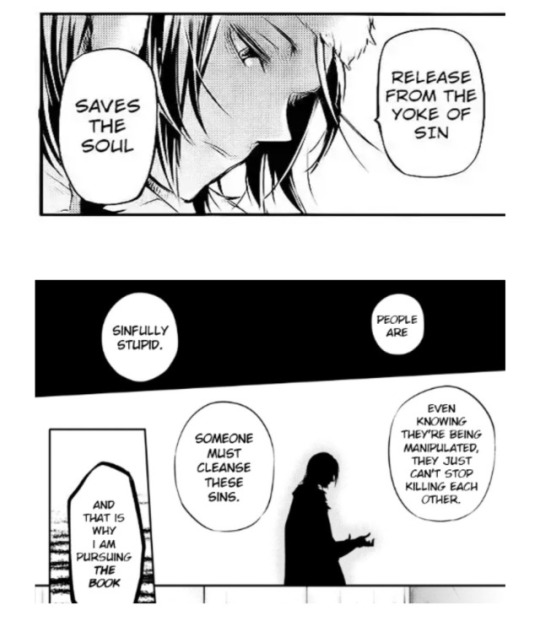
And if we follow Dazai as inspired by Yozo, then Dazai seems to be someone who still hasn’t found the “antonym to [sin]”, as we can see present in the novel:
“Actions punishable by jail sentences are not the only crimes [/sins]. If we knew the antonym of [sin], I think we would know its true nature. God . . . salvation . . love... light. But for God there is the antonym Satan, for salvation there is perdition, for love there is hate, for light there is darkness, for good, evil. [Sin] and prayer? [Sin] and repentance? [Sin] and confession? [Sin] and . . . no, they're all synonymous.
What is the opposite of [sin]?"
…
[Sin] and punishment. Dostoievski. These words grazed over a corner of my mind, startling me. Just supposing Dostoievski ranged '[sin]' and 'punishment' side by side not as synonyms but as antonyms. [Sin] and punishment - absolutely incompatible ideas, irreconcilable as oil and water. I felt I was beginning to understand what lay at the bottom of the scum-covered, turbid pond, that chaos of Dostoievski's mind - no, I still didn't quite see . . . Such thoughts were flashing through my head like a revolving lantern when I heard a voice.” - No Longer Human[40] (Yozo has in fact never finished this thought)
I think his desire to get rid of Fyodor could potentially be out of fear that Fyodor is right (this was my initial guess). Because in my opinion, despite how much Dazai wants to die, he also wants to find a reason to live desperately but if he cannot find it, then dying would be a better option, it is better not to live. And he is constantly afraid that he cannot find it even as he continues to live, but if he wants to live, then he must secure this (I think @/bsd-bibliophile speaks of it really well here). Because Dazai is a character filled with paradoxes, which I think is one of the reasons why it is so hard to grasp him, he is almost fickle, it is hard to say explicitly he is this way, he is that way. This is in fact very similar to Dazai’s writing, which I shall once again reference Studies in the Comic Spirit in Modern Japanese Fiction:
“Dazai himself was keenly conscious of what an imperfect vessel he was to present himself as a "model for the world," a model that offered no answers, full of paradoxes in a world full of paradoxes but not even aware of them. The act of becoming a writer, calling attention to the follies and deceits of the world, and presenting his own conspicuously imperfect life as a "model" would be a dubious proposition at best. Thus there is an inherent ambivalence to his role which, in his more dispassionate moments, is reflected in his work in the form of a highly ironic outlook, presenting the inevitable paradoxes as faithfully as possible, and then attempting to derive as much consolation as possible from the endlessly intriguing details of the show”[41].
Anyways, I have gone off track, or maybe, as we would see that both Dazai and Fyodor seem to understand fully that humans are “sinful and foolish”, they are both highly intelligent and I would say both seem to recognize their wrongdoings as well which cause some kind of self-hatred. And yet, from here their beliefs diverge, Dazai though hasn't found an antonym for “sin”, or that perhaps even realized that "living itself is a source of sin" [42], as in "sinning" is unavoidable or even maybe there's very little difference between other things and "sin", but once believed that Crime/“Sin” and Punishment are something close to antonyms but reality shows his thinking to be different, while Fyodor seems to see that punishment, getting rid of ability users, is the only way to get rid of it, though there's an extra dimension to it that he also has to become crime to punish it fully, I guess it's more so a cause and effect, antonyms and synonyms in his pov, so I wonder if part of that reason for his seeming desperate wanting to be rid of Fyodor also stemmed from fear, because Dazai could find himself picturing himself, or his past self, in Fyodor? Their thinking is quite similar... It may be just their understanding of "sin" that they differ in which caused their divergences.
So despite what he says, like the panel which inspired this essay, he is still unsure of some parts of it, but I think he is trying to convince himself of it, especially that last part. It's like he wants to believe it but cannot fully have himself do so.
I also do think that if the above is indeed what Dazai believes, the reason Dazai may be holding so tightly onto this belief, humans are sinfully foolish but what's wrong with that, even though he himself has yet to fully believe it may also be because of Oda’s last words: “To be on the side that saves people” and “People exist to save themselves” (an interpretation from @/bsd-bibliophile I like is even though what people are doing are motivated by their best interests it could also benefit those around them) and of course Oda’s trust, that even he who had done so much terrible things can possibly help and save people? And Dazai trusts Oda, even though he’s desperately holding onto them, because, though maybe one wouldn’t normally associate it with him but trust, to me, is a very crucial aspect to Dazai, a similar narrative is presented in his works as well, as probably symbolized during the Guild arc when he was holding onto the matchbox ‘advising’ Kyouka:
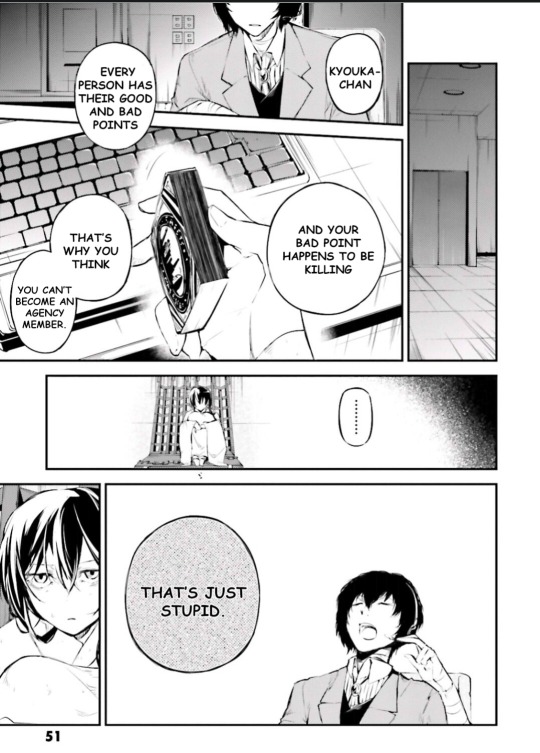

I also don’t think that if Dazai really fully believed what he said ("but what's wrong with that?"), when he asked how many people Kyouka killed, he would make this expression:

If you think about it, it almost feels like Dazai is repeating some of what Oda had implied to him on his final words to others. And maybe... Just maybe, Dazai's final evolution would be fully accepting that? Because if there is little difference between either good and bad things and "sinning", but you can help people along the way even when doing so by doing "good", maybe it's not so bad? Maybe it's a bit more wonderful.
But of course that's not to say that these words aren't sincere, because in a way they are, Dazai's whole character is a kind of struggle in my opinion, like that presented in so many of his works, it's like I want to believe it, but the world sometimes proves me differently, but I want to trust that what I feel deep inside is true, can I find it in myself to believe it? His words are sometimes in a way consoling himself and others.
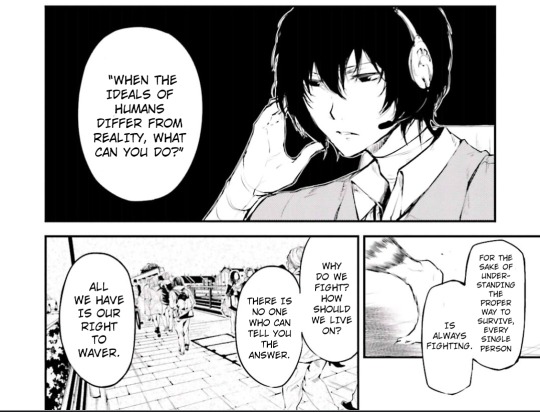
But understanding it this way then raises the question of what are abilities supposed to be/symbolize? What is the nature of abilities? Why do some people have it when others do not? Since we understand that there are people too in this bsd universe without an ability as well even though it focuses mainly on people with abilities. But why is Fyodor so intent on only getting rid of ability users? Why are the ability users the only ones with "sin"? I would say in contrast Dazai is more likely to believe that everyone harbors "sin" rather than just ability users, which parallels how I understand Dazai-sensei to think of "sin". This can actually perhaps be traced to the very subtle differences in what Dazai and Fyodor say in raw manga panels of chapter 46:
Fyodor: 「人は罪深く愚かです」
Dazai: 「...確かに人は皆罪深く愚かだ...」
With the character 皆 meaning all in Chinese. But of course I do not know Japanese, I can only guess the meaning Kanji characters if they are written the same as Chinese characters. But I also think the pause in the beginning of Dazai's sentence, hesitance perhaps, is also interesting to note.
And, of course, this is pure speculation on my part, these parallels are simply my own takes. I hope my thoughts here aren't too incoherent… but I am trying to interpret the author’s thoughts. I also wish I could add things about Dostoevsky’s works to this, but unfortunately, I have only finished reading one of his works (Notes from Underground) so far. But this is probably nothing but my best guess that I have about Dazai's character, as I had mentioned, this is merely a theory. Of course this is only my own way of thinking and understanding it. I think it helps make sense of some things, but of course it is but my speculation. But I think by understanding the source of BSD Dazai's inspiration, we may be able to potentially have a fuller understanding of his views, and perhaps where his arc is heading towards. That's why I always wished we could get even a glimpse at Dazai's thoughts... I know I probably have a very different outlook at Dazai from most people because of the fact that my understanding of Dazai is also influenced from how I understand his irl counterpart's works.
5. Final Notes
Honestly, this rambling has come to become way longer than I had originally intended… I honestly just really wanted to talk about my feelings for Dazai-sensei's works. But if nothing else had resulted from this essay, I hope that I could encourage or at least make more people want to read Dazai’s works because Dazai's works really do have a certain charm to them, I remember reading one analysis about how the use of words and changing perspectives, like going from the third point of view to addressing the readers with "you" can draw the reader in, there's also a certain sense of intimacy in his works... You know there's this one Chinese description from one of Dazai's books (小說燈籠 or in English Lanterns of Romance) that has always stuck to me:
對太宰治來說,這個世界沒有善惡,只有喜歡或討厭;人生未必無常,無非是喜劇或悲劇。而喜劇供給慰藉,悲劇予以救贖,都是亙古不變的心靈藥劑,療癒許多因戰亂而深感孤獨的哀傷靈魂。在太宰的故事裡沒有壞人,只有軟弱的人,但軟弱並非罪惡,正因為軟弱更能體會點點溫情。太宰總在內心痛苦、身感疲憊時,反而拼命製造愉快的氣氛。太宰本人,即是哀傷的喜劇。眾人以為他極度自私,事實上,他總顧慮著他人的感受。或許他認為只要帶給周遭溫柔,自己也能溫暖起來吧。[43]
Tr. For Dazai Osamu, there is no good or evil in this world, there is only like or dislike; life is not necessarily uncertain, it is nothing more than a comedy or a tragedy. While comedy provides consolation, tragedy provides salvation. They are eternal spiritual medicines, healing many sad souls who are deeply lonely due to war (A/N: did you know during the war Dazai wrote to console the hearts of people?). In Dazai's stories, there are no bad people, only weak people, but weakness is not a sin/crime, it is precisely because of weakness that we can understand tenderness. Dazai always tried his best to create a happy atmosphere when he was in pain and tired. Dazai himself is a sad comedy. People thought he was extremely selfish, but in fact, he was always concerned about the feelings of others. Maybe he thought that as long as he brought kindness to his surroundings, he would be able to warm himself up too.
And perhaps indeed weakness is not a sin, I like to think that is the main message of No Longer Human, as seen with the epligoue which has the woman calling Yozo a good boy and an angel, despite the fact that the entire novel seemed to have Yozo carry with him immense "sins" and guilt, in fact the majority of novel is ironic in that Yozo only recognizes his cruelty yet not his capacity for love and his gentleness, unreliable narrators... With the novel being one of fiction rather than autobiographical (it is semi autobiographical not fully) one must be sure to then take both Yozo’s narration and the words of the woman in the epligoue as Dazai. Maybe because Dazai thinks the best way for us to better human problems is perhaps to realize these human natures, these weaknesses which Yozo had been able to see in others and in himself, because perhaps only that way will we be able to cherish things such as kindness, trust, understanding, and treat others with these qualities. A note should be put in place for some historical context of No Longer Human which also influenced how I understand the book. Because No Longer Human is in fact a post-war novel, written after the Second World War which Japan was defeated. I have read quite a bit in Chinese about how Dazai felt people felt no remorse or sin from the war, here it writes that “When Dazai returned to Tokyo after evacuation, he was unable to hold himself back when he saw intellectuals depart the same leftist movement and cooperate with policies differing from their wartime policies, jumping on the wave of postwar democracy without hesitation. They had showed no remorse or sense of sin in committing the shameful act of converting and conforming to national policy.” I should also note that Dazai, in the past had been involved in communist activities, and the book Dazai Osamu says that one of Dazai’s ideals was service, to people around him and his readers. And what I had quoted before “those who are sinful have deep affection” is from a post-war work.
But I personally have a softer spot for his middle period works though (Dazai was in fact healthiest, and produced the most works during this period despite it being during the war, and he wanted to console the hearts of people during this time;;), which treat these problems with an almost gentler touch. I think within these works you'll find a different Dazai Osamu than what you've read in No Longer Human. Dazai seems to love and cherish warm and beautiful things and is always searching for them. Honestly, to me Dazai's works aren't just depresssing, it illustrates the human struggle, it's paradoxes, that is within everyone, the yearning for beauty, goodness, but also the melchony of the struggle as one comes into conflict with human's darker side and life's struggles, in so many dark moments, I always feel there is still a flicker of light, even if it is however faint, that is what Dazai is to me. And that's what attracted me to reading more of Dazai's work in the first place. Anyways no more, I'm done talking. So, to end, let me leave you with one of the Dazai quotes I love:
「就算我不再了也不要沮喪,要相信我一定會成功,請輕鬆看待。我絕不會自甘墮落,一定會戰勝這個世界。」- 《正義與微笑》[43]
tr. “Even if I am no more, do not be depressed, believe that I will succeed, just wait and see. I will not willingly fall into deprivity I will succeed in this world.”
6. Citations:
[1] Dazai, Osamu. No Longer Human. Tr. Donald Keene.
[2] Dillon, Sara Ann. Dazai Osamu and the problematics of context in Japanese artistic consciousness. Stanford University ProQuest Dissertations Publishing, 1988. 8906653.
[3] Cox, Jamie Walden, "Dazai's Women: Dazai Osamu and his Female Narrators" (2012). Dissertations and Theses. Paper 132.
[4] Ueda Makoto, Modern Japanese Writers and the Nature of Literature.
[5] Ibid.
[6] Dazai Osamu. Otogizoshi: The Fairy Tale Book of Dazai Osamu, Tr. Ralph F. McCarthy.
[7] Cox, Jamie Walden, "Dazai's Women: Dazai Osamu and his Female Narrators" (2012). Dissertations and Theses. Paper 132.
[8] Watabe Yoshinori, “Osamu Dazai and the Beauty of his Literature”.
[9] Dazai, Osamu. No Longer Human. Tr. Donald Keene.
[10] Hijiya Yukihito (1974) A Religion of Humanity, Critique: Studies in Contemporary Fiction, 15:3, 34-42, DOI: 10.1080/00111619.1974.10690061
[11] Ibid.
[12] 蔡超, 「《人間失格》與太宰治的基督教思想」
[13] Watabe Yoshinori, “Osamu Dazai and the Beauty of his Literature”.
[14] Ibid.
[15] Ibid.
[16] 太宰治, 《思考的蘆葦》, tr. 劉子倩
[17] Watabe Yoshinori, “Osamu Dazai and the Beauty of his Literature”.
[18] Dazai, Osamu. No Longer Human. Tr. Donald Keene.
[19] Hijiya Yukihito (1974) A Religion of Humanity, Critique: Studies in Contemporary Fiction, 15:3, 34-42, DOI: 10.1080/00111619.1974.10690061
[20] Dazai, Osamu. No Longer Human. Tr. Donald Keene.
[21] 太宰治, 《正義與微笑》, tr. 高詹燦
[22] Dazai Osamu, Self Portraits, “Thinking of Zenzo”, tr. Ralph F. McCarthy. [via. BSD-Bibliophile].
[23] Ibid.
[24] Ibid.
[25] Dazai Osamu, Blue Bamboo, tr. Ralph F. McCarthy. [via. BSD-Bibliophile].
[26] Ibid.
[27] Ibid.
[28] Ibid.
[29] 周希瑜,戴松林, 論太宰治《清貧譚》與《竹青》中浪漫主義
[30] Dazai Osamu, Blue Bamboo, tr. Ralph F. McCarthy. [via. BSD-Bibliophile].
[31] Dazai, Osamu. No Longer Human. Tr. Donald Keene.
[32] Cohn, Joel R, Studies in the Comic Spirit in Modern Japanese Fiction, “Dazai Osamu: Laughing at the End”, Harvard University Asia Center, 1998
[33] Ibid.
[34] O'Brien, James A. "Conclusion." Dazai Osamu, Twayne Publishers, 1975, pp. 150-163. Twayne's World Authors Series 348. Gale Literature: Twayne's Author Series
[35] Ibid.
[36] 太宰治, 《思考的蘆葦》, tr. 劉子倩
[37] Dazai, Osamu. No Longer Human. Tr. Donald Keene.
[38] Hijiya Yukihito (1974) A Religion of Humanity, Critique: Studies in Contemporary Fiction, 15:3, 34-42, DOI: 10.1080/00111619.1974.10690061
[39] Dazai, Osamu. No Longer Human. Tr. Donald Keene.
[40] Ibid.
[41] Cohn, Joel R, Studies in the Comic Spirit in Modern Japanese Fiction, “Dazai Osamu: Laughing at the End”, Harvard University Asia Center, 1998
[42] Dazai, Osamu. No Longer Human. Tr. Donald Keene.
[43] 太宰治, 《小說燈籠:冷冽中的溫暖組曲,太宰治浪漫小說集》, tr. 陳系美
[44] 太宰治, 《正義與微笑》, tr. 高詹燦
A/N: I forgot to add a few citations, one is for the No Longer Human isn’t an I-novel thing: Japanese Language and Literature Vol. 53, No. 2 (October 2019), pp. 299
For those who are curious as to why it isn't one, the definition of an I-novel according to Wikipedia is "The I-novel (私小説, Shishōsetsu, Watakushi Shōsetsu) is a literary genre in Japanese literature used to describe a type of confessional literature where the events in the story correspond to events in the author's life." Though NLH does follow some of Dazai-sensei’s life experiences, from what I read it said the way is structured and the degree of which it manipulates Dazai's own life events makes it more fictional. This whole thing may perhaps be a scholarly debate honestly... (But Donald Keene, Ralph McCarthy and James O'Brien all seem to suggest the same thing as this source so... But if you think about if this is true, I am only in more deep admiration for Dazai's writing) But I'm personally more inclined to think that there is a creation of a almost distance between the author Dazai and the "Dazai" he shows in writing, though sometimes in some stories the main character are even referred as "Dazai" (like Thinking of Zenzo for example), but even so you can still feel Dazai through the pages, it comes across as him being personally involved in them and it makes them quite fun to read, I think it's truly fascinating but that is my unprofessional opinion. But if you think this is exasperating, yes perhaps it is indeed... In the book Dazai Osmau, the author even mentioned how certain critics are exasperated by Dazai’s coyness lol. If I have sparked curiosity about the subject, I have written more in depth about Dazai-sensei's narration here.
Canis Familiaris:
Dazai Osamu, Self Portraits, "Canis Familiaris", tr. Ralph McCarthy.
The Setting Sun:
Dazai Osamu, The Setting Sun, tr. Donald Keene.

Tag list: @REQUIEM626K @shadyteacup @ALITTLESIMP @greenshirtimaginesii @JADEGREENIMMORTALITY @SAKIKOSHI @KENMASBBYGRL @DAZAISUSEDBANDAGES @JESSBEINME15 @MIKASA-STAN-ACCOUNT @MISSROWN @GINSWIFE @TENDER-ROSIEY @SONDER-PARADISE @DARLINQSERENITY @WHOREFORDAZAI @SHAMELESSPASTAWOBBLERLAND @RIRK-KE @DAZAIAIKO @HANEMISO @SEBTOMM @IZUKUS-GF @LAVIDADELAVIE @SWRDEMON @ARIXSUX @BEAUTIFUL-IS-BORING @ATSUCAFE @SIGMAFIED @STORIES-FROM-SAINT-PETERSBURG @THEKAYLAHUB @XO-CUTEPLOSION-XO @SIMPLYASIMPSBLOG @KISARA-16REBLOGS @STRAYDOGSBUNGOU @TITAMAOW @KAUS-QUIETIS
Analysis only:
@ODDEYESIGHT
#kat rambles about dazai sensei#kat's analysis🔍#bungou stray dogs#bsd dazai#bsd#dazai osamu#bsd theories#bsd analysis#bungou stray dogs analysis#bsd meta
191 notes
·
View notes
Text
on soukoku and shin soukoku
so @stardreamerl0ve and i were talking about bungou stray dogs and various things about it, and it eventually ended up with us talking about why we think soukoku has so much more content than shin soukoku, despite sskk arguably being the main duo in the series, and this is what we settled on.
for reference, skk currently has over 20k fics, while sskk is just barely above 5k.
obviously, there are multiple reasons, but when it comes down to it, both of us agreed that it came down to their dynamics, and the amount of room there is in canon content for various interpretations and fics.
skk and sskk both have a similar dynamic, but there are quite a few differences. they're both enemies to lovers ships, and each of them have their own appeal.
shin soukoku is still figuring things out, and they don't have that same trust in each other quite yet, so their dynamic is constantly shifting and growing. as the audience, we get to watch as all of this happens, and see them go from enemies to people who can, to whatever extent, work together.
on the other hand, soukoku has a very set dynamic, and it involves a lot of things that fandom has a history of being invested in and enjoying. you have rivalry, codependency, insane levels of trust, as well as things like 'friendly' banter, interesting (however sparse they may be) interactions, and a shared history.
and really, that shared history is where we said a lot of the popularity gap comes from.
while shin soukoku have plenty of interactions during canon, we're seeing their entire relationship play out, from their meeting to whatever way it might end. and it's great! we get to see that development, and create content based on all of the scenes that we're give for them.
when it comes to soukouku though, there's seven years worth of time to write about. unlike sskk, almost all of their relationship happens where we can't see it, and because of that, there is a lot of room for interpretation. and that room gives them an advantage when it comes to comparing them against every other relationship in the fandom.
shin soukoku is absolutely a delightful ship, and skk isn't even the main thing i write in bsd, but soukoku has so many different parts of them that fandom loves (rivalry, complicated pasts, opposite personalities, i could go on), that it doesn't quite surprise me anymore how much more popular it is than shin soukoku, and even the rest of the ships in the fandom.
#cheshire rambles#bungou stray dogs#bungou stray dogs meta#bungou stray dogs analysis#kind of? i think the tag still applies#skk#soukoku#sskk#shin soukoku#honestly it all started because i was checking the top tags in all the categories#and saw that skk literally has 15k more fics than sskk#despite the fact that chuuya rarely shows up#and dazai isn't The Main protagonist#while atsushi and akutagawa are constantly at the forefront#anyway this probably isn't coherent#because its 3:30am as im posting this#but honestly who cares?#dazai osamu#chuuya nakahara#atsushi nakajima#akutagawa ryuunosuke
42 notes
·
View notes
Text
Atsushi Nakajima & Ryūnosuke Akutagawa's relationship: an analysis
As we anime and manga fans know the two definitely do not get along. It's meant to be like Chuuya and Dazai's relationship, as stated by Dazai himself. I'd like to say that this was a complete failure. Dazai and Chuuya were partners who don't get along, so Dazai wanted to make sokokou 2.0, what he failed to take into account is that Atsushi and Akutagawa hate each other. Dazai doesn't hate Chuuya and vise versa, here is some proof! 1. Dazai acts like that towards basically everyone, example 1.Kunikida, example 2. Fyodor Dostoevsky, example 3. Police chief guy, example 4. Ranpo. Proof 2. Their plans, they have enough to have plans that work for multiple situations. They sat down and made plans. Atsushi and Akutagawa could never accomplish this, they yell at each other every chance they get. Proof 3. Chuuya drank alcohol when he found out Dazai left the Port Mafia. He says it's out of celebration, but I'd wager he was sad one of the only people he could trust left. Proof 4. They remember promises and bets from so years ago, from when they first met.
You get the point. Opposite of them is Atsushi and Akutagawa. They HATE each other. Proof 1. Leg. Proof 2. Akutagawa stabbed him. Proof 3. "How many times have we tried to kill each other?" Like their 4th meeting. Proof 4. Atsushi manipulating Akutagawa into jumping to catch the walkie talkie by saying Dazai wanted to talk to him.
Okay, so they couldn't make Shin sokokou happen. I'd like to go one step more and say it's an unhealthy relationship. Proof 1. Previously mentioned murder attempt. Proof 2. I can't recall a single time they've called each other their actual names. Proof 3. They've manipulated each other a lot. Proof 4. Akutagawa calling Atsushi a "fool" for having hallucinations and being afraid of the headmaster. Dazai as, admittedly also guilty of this, just not as bad. Imagine for me for a second that you just got out of a cult or broke up with a manipulative boyfriend or girlfriend, then you learn the world is completely different than you've been made to believe. That you've never had someone care about you, but now multiple people do. It would be hard to believe, to get away from that mindset, especially if it's all you know. Even after that big break there will still be an effect on your mind. On top of that, Atsushi, to my knowledge, never got therapy. He is stuck with those feelings and he finally starts to open up, then Akutagawa calls his feelings invalid because he went through something too (worse, in Akutagawa's opinion) but you don't see him complaining.
So, you see, they should not interact with each other. That's all thanks for reading! Don't forget that I don't own "Bungou Stray Dogs" or any mentioned characters, thanks! And that I don't have any degree in psychology or at all, so take it all with a grain of salt. Bye!
P.S I RESPECT PEOPLE WHO SHIP IT, I MEAN NO HATE!!
#bungo stray dogs#bungou stray dogs#bungo stray dogs manga#bungou stray dogs dazai#bungou stray dogs chuuya#bungou stray dogs anime#bungou stray dogs analysis#bungou stray dogs atsushi#bungou stray dogs akutagawa#shin soukoku#soukouku#atsushi nakajima#atsushi#dazai osamu#dazai#bsd#bsd anime#bsd manga#bsd analysis#bsd atsushi#bsd dazai#bsd chuuya#bsd akutagawa
28 notes
·
View notes